Speech Writing
Speech Examples

20+ Outstanding Speech Examples for Your Help
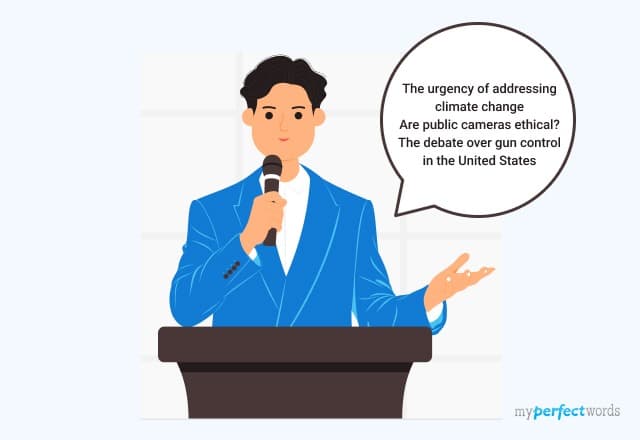
People also read
The 10 Key Steps for Perfect Speech Writing
Understanding the Speech Format - Detailed Guide & Examples
How to Start A Speech - 13 Interesting Ideas & Examples
Common Types of Speeches that Every Speechwriter Should Know
Good Impromptu Speech Topics for Students
Entertaining Speech Topics for Your Next Debate
How to Write a Special Occasion Speech: Types, Tips, and Examples
Introduction Speech - A Step-by-Step Guide & Examples
How to Write the Best Acceptance Speech for Your Audience?
Presentation Speech - An Ultimate Writing Guide
Commemorative Speech - Writing Guide, Outline & Examples
Farewell Speech - Writing Tips & Examples
How to Write an Extemporaneous Speech? A Step-by-Step Guide
Crafting the Perfect Graduation Speech: A Guide with Examples
Public speaking can be daunting for students. They often struggle to start, engage the audience, and be memorable. It's a fear of forgetting words or losing the audience's interest.
This leads to anxiety and self-doubt. Students wonder, "Am I boring them? Will they remember what I say? How can I make my speech better?"
The solution lies in speech examples. In this guide, we'll explore these examples to help students create captivating and memorable speeches with confidence.
So, keep reading to find helpful examples!
- 1. Speech Examples
- 2. Tips to Write a Good Speech
Speech Examples
Talking in front of a bunch of audiences is not as easy as it seems. But, if you have some good content to deliver or share with the audience, the confidence comes naturally.
Before you start writing your speech, it is a good idea that you go through some good speech samples. The samples will help to learn how to start the speech and put information into a proper structure.
Speech Examples for Students
Speech writing is a huge part of academic life. These types of writing help enhance the creative writing skills of students.
Here is an amazing farewell speech sample for students to learn how to write an amazing speech that will captivate the audience.
Below, you will find other downloadable PDF samples.
Speech Examples for Students
Every school and college has a student council. And every year, students elect themselves to be a part of the student council. It is mandatory to impress the student audience to get their votes. And for that, the candidate has to give an impressive speech.
Here are some speech examples pdf for students.
Speech Examples For Public Speaking
Speech Examples About Yourself
Speech Examples Short
Speech Examples For College Students
Speech For Student Council
Speech Examples Introduction
Speech Example For School
Persuasive Speech Examples
The main purpose of a speech is to persuade the audience or convince them of what you say. And when it comes to persuasive speech , the sole purpose of speech becomes more specific.
Persuasive Speech Example
Informative Speech Examples
Informative speeches are intended to inform the audience. These types of speeches are designed to provide a detailed description of the chosen topic.
Below we have provided samples of informative speech for you.
Informative Speech Example
Informative Speech Sample
Entertainment Speech Examples
Entertainment speeches are meant to entertain the audience. These types of speeches are funny, as well as interesting. The given speech samples will help you in writing an entertaining speech.
Entertainment Speech Example
Entertainment Speech Sample
Argumentative Speech Examples
Making a strong argument that is capable of convincing others is always difficult. And, when it comes to making a claim in an argumentative speech, it becomes more difficult.
Check out the argumentative speech sample that demonstrates explicitly how an argumentative speech needs to be written.
Argumentative Speech Example
Demonstration Speech Examples
The demonstrative speeches are intended to demonstrate or describe the speech topic in depth. Get inspired by the demonstrative speech sample given below and write a captivating demonstrative speech.
Demonstration Speech Example
Demonstration Speech Sample
Motivational Speech Examples
Motivational speeches are designed to motivate the audience to do something. Read out the sample motivational speech given below and learn the art of motivational speech writing.
Impromptu Speech Examples
Impromptu speech writing makes you nervous as you are not good at planning and organization?
Check out the sample impromptu speech and learn to make bullet points of your thoughts and plan your speech properly.
Graduation Speech Examples
Are you graduating soon and need to write a graduation farewell speech?
Below is a sample graduation speech for your help.
Wedding Speech Examples
“My best friend’s wedding is next week, and I’m the maid of honor. She asked me to give the maid of honor speech, but I’m not good at expressing emotions. I’m really stressed. I don’t know what to do.”
If you are one of these kinds of people who feel the same way, this sample is for you. Read the example given below and take help from it to write a special maid of honor speech.
Best Man Speech Examples
Father of The Bride Speech Example
Speech Essay Example
A speech essay is a type of essay that you write before writing a proper speech. It helps in organizing thoughts and information.
Here is a sample of speech essays for you to understand the difference between speech format and speech essay format.
Tips to Write a Good Speech
Reading some famous and incredible sample speeches before writing your own speech is really a good idea. The other way to write an impressive speech is to follow the basic tips given by professional writers.
- Audience Analysis: Understand your audience's interests, knowledge, and expectations. Tailor your speech to resonate with them.
- Clear Purpose: Define a clear and concise purpose for your speech. Ensure your audience knows what to expect right from the beginning.
- Engaging Opening: Start with a captivating hook – a story, question, quote, or surprising fact to grab your audience's attention.
- Main Message: Identify and convey your main message or thesis throughout your speech.
- Logical Structure: Organize your speech with a clear structure, including an introduction, body, and conclusion.
- Transitions: Use smooth transitions to guide your audience through different parts of your speech.
- Conversational Tone: Use simple, conversational language to make your speech accessible to everyone.
- Timing: Respect the allocated time and write the speech accordingly. An overly long or short speech can diminish the audience's engagement.
- Emotional Connection: Use storytelling and relatable examples to evoke emotions and connect with your audience.
- Call to Action (if appropriate): Encourage your audience to take action, change their thinking, or ponder new ideas.
- Practice Natural Pace: Speak at a natural pace, avoiding rushing or speaking too slowly.
So, now you know that effective communication is a powerful tool that allows you to inform, persuade, and inspire your audience. Throughout this blog, we've provided you with numerous examples and invaluable tips to help you craft a compelling speech.
And for those moments when you require a professionally written speech that truly stands out, remember that our team is here to help. We can rescue you from writer's block and deliver an outstanding speech whenever you need it.
With our essay writing service , you can be confident in your ability to communicate your message effectively and leave a lasting impact.
So, don't hesitate – place order now and buy speech that will truly captivate your audience.

Dr. Barbara is a highly experienced writer and author who holds a Ph.D. degree in public health from an Ivy League school. She has worked in the medical field for many years, conducting extensive research on various health topics. Her writing has been featured in several top-tier publications.

Paper Due? Why Suffer? That’s our Job!
Keep reading

My Speech Class
Public Speaking Tips & Speech Topics
Speech and Essay Samples
Don’t know where to start? Get inspired by our FREE speech and essay examples .
Use them to get the creative juices flowing . Don’t copy any of these examples! Since these speeches are available for anyone to download, you can never be sure that another student has not used them, and that they will pass plagiarism evaluation tools, such as Turnitin or Plagscan.
Whether you find a sample that is on your given topic or a closely related discussion, all of the speeches can help you get organized and focused.
Review multiple speeches to learn:
- How the presenter laid out the talking points and the number of points used
- What references and statistics they used to solidify their arguments
- How long the speech was for a given topic
- How the topic was introduced and summarized
- How the speaker engaged and interacted with the audience
By using these speech examples as an outline, you’ll have a fully formed presentation in no time ! We also have this page with gun control speech examples , in case you’d like to see different examples on the same topic.
Persuasive Speeches
- Birth Control Persuasive Speech
- We should stand up for our gun rights
- The truth about gun control
- The controversy over gun control
- Speech against stricter gun control
- It’s up to society to solve gun problems
- Guns don’t kill people
- Does banning firearms help prevent homicides
- Criminals will be criminals
- What to do about Deadbeat Parents
- Why state aid applicants need to be drug tested
- Subculture is Mainstream
- Eating Healthy
- Teachers should be paid more
- Digital Piracy
- Minimum Wage
- Drug Testing for State Aid
- Drug testing welfare
- Why snakes make good pets
- Why you need to quit drinking soda
- Why Everyone Should Learn to Play an Instrument
- Why Android is better then IOS 2
- Why Android is better then IOS 1
- Video Games Do Not Cause Violence
- Soda and Obesity
- Plastic Surgery 2
- Plastic Surgery
- Maintaining A Healthy Lifestyle
- Human development depends primarily on environmental factors
- Donating Blood
- Birth Control Persuasive Speech Example with Outline
- Social Media Persuasive Speech Example with Outline
- Texting and Driving Persuasive Speech Example with Outline
- Persuasive Speech on Sleep
- Persuasive Speech about Bullying
- Persuasive Speech on Organ Donation
Informative Speeches
- Guns and gun control - Texas
- Gun violence and control
- Gun control on campuses
- Wind Energy
- About Serial Killers
- Eating Disorder
- Robin Williams 2
- Dream Types
- Separation of Powers of the Federal Government
- Memory Loss
- Internet Black Market
- Blood Donation
- Alcohol in Winter
- About Guitar
- Social Media Informative Speech Example with Outline
- Texting and Driving Informative Speech Example with Outline
- Informative Speech on Sleep
- Informative Speech about Bullying
- Free Organ Donation Informative Speech
- Free Informative Speech on Caffeine and Its Effects
- Five Side Effects of Global Warming
- Global Warming Is Real
Reach out to us for sponsorship opportunities
Vivamus integer non suscipit taciti mus etiam at primis tempor sagittis euismod libero facilisi.
© 2024 My Speech Class

How it works
Transform your enterprise with the scalable mindsets, skills, & behavior change that drive performance.
Explore how BetterUp connects to your core business systems.
We pair AI with the latest in human-centered coaching to drive powerful, lasting learning and behavior change.
Build leaders that accelerate team performance and engagement.
Unlock performance potential at scale with AI-powered curated growth journeys.
Build resilience, well-being and agility to drive performance across your entire enterprise.
Transform your business, starting with your sales leaders.
Unlock business impact from the top with executive coaching.
Foster a culture of inclusion and belonging.
Accelerate the performance and potential of your agencies and employees.
See how innovative organizations use BetterUp to build a thriving workforce.
Discover how BetterUp measurably impacts key business outcomes for organizations like yours.
A demo is the first step to transforming your business. Meet with us to develop a plan for attaining your goals.

- What is coaching?
Learn how 1:1 coaching works, who its for, and if it's right for you.
Accelerate your personal and professional growth with the expert guidance of a BetterUp Coach.
Types of Coaching
Navigate career transitions, accelerate your professional growth, and achieve your career goals with expert coaching.
Enhance your communication skills for better personal and professional relationships, with tailored coaching that focuses on your needs.
Find balance, resilience, and well-being in all areas of your life with holistic coaching designed to empower you.
Discover your perfect match : Take our 5-minute assessment and let us pair you with one of our top Coaches tailored just for you.

Best practices, research, and tools to fuel individual and business growth.
View on-demand BetterUp events and learn about upcoming live discussions.
The latest insights and ideas for building a high-performing workplace.
- BetterUp Briefing
The online magazine that helps you understand tomorrow's workforce trends, today.
Innovative research featured in peer-reviewed journals, press, and more.
Founded in 2022 to deepen the understanding of the intersection of well-being, purpose, and performance
We're on a mission to help everyone live with clarity, purpose, and passion.
Join us and create impactful change.
Read the buzz about BetterUp.
Meet the leadership that's passionate about empowering your workforce.

For Business
For Individuals
How to write a speech that your audience remembers

Elevate your communication skills
Unlock the power of clear and persuasive communication. Our coaches can guide you to build strong relationships and succeed in both personal and professional life.
Whether in a work meeting or at an investor panel, you might give a speech at some point. And no matter how excited you are about the opportunity, the experience can be nerve-wracking .
But feeling butterflies doesn’t mean you can’t give a great speech. With the proper preparation and a clear outline, apprehensive public speakers and natural wordsmiths alike can write and present a compelling message. Here’s how to write a good speech you’ll be proud to deliver.
What is good speech writing?
Good speech writing is the art of crafting words and ideas into a compelling, coherent, and memorable message that resonates with the audience. Here are some key elements of great speech writing:
- It begins with clearly understanding the speech's purpose and the audience it seeks to engage.
- A well-written speech clearly conveys its central message, ensuring that the audience understands and retains the key points.
- It is structured thoughtfully, with a captivating opening, a well-organized body, and a conclusion that reinforces the main message.
- Good speech writing embraces the power of engaging content, weaving in stories, examples, and relatable anecdotes to connect with the audience on both intellectual and emotional levels.
Ultimately, it is the combination of these elements, along with the authenticity and delivery of the speaker , that transforms words on a page into a powerful and impactful spoken narrative.
What makes a good speech?
A great speech includes several key qualities, but three fundamental elements make a speech truly effective:
Clarity and purpose
Remembering the audience, cohesive structure.
While other important factors make a speech a home run, these three elements are essential for writing an effective speech.
The main elements of a good speech
The main elements of a speech typically include:
- Introduction: The introduction sets the stage for your speech and grabs the audience's attention. It should include a hook or attention-grabbing opening, introduce the topic, and provide an overview of what will be covered.
- Opening/captivating statement: This is a strong statement that immediately engages the audience and creates curiosity about the speech topics.
- Thesis statement/central idea: The thesis statement or central idea is a concise statement that summarizes the main point or argument of your speech. It serves as a roadmap for the audience to understand what your speech is about.
- Body: The body of the speech is where you elaborate on your main points or arguments. Each point is typically supported by evidence, examples, statistics, or anecdotes. The body should be organized logically and coherently, with smooth transitions between the main points.
- Supporting evidence: This includes facts, data, research findings, expert opinions, or personal stories that support and strengthen your main points. Well-chosen and credible evidence enhances the persuasive power of your speech.
- Transitions: Transitions are phrases or statements that connect different parts of your speech, guiding the audience from one idea to the next. Effective transitions signal the shifts in topics or ideas and help maintain a smooth flow throughout the speech.
- Counterarguments and rebuttals (if applicable): If your speech involves addressing opposing viewpoints or counterarguments, you should acknowledge and address them. Presenting counterarguments makes your speech more persuasive and demonstrates critical thinking.
- Conclusion: The conclusion is the final part of your speech and should bring your message to a satisfying close. Summarize your main points, restate your thesis statement, and leave the audience with a memorable closing thought or call to action.
- Closing statement: This is the final statement that leaves a lasting impression and reinforces the main message of your speech. It can be a call to action, a thought-provoking question, a powerful quote, or a memorable anecdote.
- Delivery and presentation: How you deliver your speech is also an essential element to consider. Pay attention to your tone, body language, eye contact , voice modulation, and timing. Practice and rehearse your speech, and try using the 7-38-55 rule to ensure confident and effective delivery.
While the order and emphasis of these elements may vary depending on the type of speech and audience, these elements provide a framework for organizing and delivering a successful speech.

How to structure a good speech
You know what message you want to transmit, who you’re delivering it to, and even how you want to say it. But you need to know how to start, develop, and close a speech before writing it.
Think of a speech like an essay. It should have an introduction, conclusion, and body sections in between. This places ideas in a logical order that the audience can better understand and follow them. Learning how to make a speech with an outline gives your storytelling the scaffolding it needs to get its point across.
Here’s a general speech structure to guide your writing process:
- Explanation 1
- Explanation 2
- Explanation 3
How to write a compelling speech opener
Some research shows that engaged audiences pay attention for only 15 to 20 minutes at a time. Other estimates are even lower, citing that people stop listening intently in fewer than 10 minutes . If you make a good first impression at the beginning of your speech, you have a better chance of interesting your audience through the middle when attention spans fade.
Implementing the INTRO model can help grab and keep your audience’s attention as soon as you start speaking. This acronym stands for interest, need, timing, roadmap, and objectives, and it represents the key points you should hit in an opening.
Here’s what to include for each of these points:
- Interest : Introduce yourself or your topic concisely and speak with confidence . Write a compelling opening statement using relevant data or an anecdote that the audience can relate to.
- Needs : The audience is listening to you because they have something to learn. If you’re pitching a new app idea to a panel of investors, those potential partners want to discover more about your product and what they can earn from it. Read the room and gently remind them of the purpose of your speech.
- Timing : When appropriate, let your audience know how long you’ll speak. This lets listeners set expectations and keep tabs on their own attention span. If a weary audience member knows you’ll talk for 40 minutes, they can better manage their energy as that time goes on.
- Routemap : Give a brief overview of the three main points you’ll cover in your speech. If an audience member’s attention starts to drop off and they miss a few sentences, they can more easily get their bearings if they know the general outline of the presentation.
- Objectives : Tell the audience what you hope to achieve, encouraging them to listen to the end for the payout.
Writing the middle of a speech
The body of your speech is the most information-dense section. Facts, visual aids, PowerPoints — all this information meets an audience with a waning attention span. Sticking to the speech structure gives your message focus and keeps you from going off track, making everything you say as useful as possible.
Limit the middle of your speech to three points, and support them with no more than three explanations. Following this model organizes your thoughts and prevents you from offering more information than the audience can retain.
Using this section of the speech to make your presentation interactive can add interest and engage your audience. Try including a video or demonstration to break the monotony. A quick poll or survey also keeps the audience on their toes.
Wrapping the speech up
To you, restating your points at the end can feel repetitive and dull. You’ve practiced countless times and heard it all before. But repetition aids memory and learning , helping your audience retain what you’ve told them. Use your speech’s conclusion to summarize the main points with a few short sentences.
Try to end on a memorable note, like posing a motivational quote or a thoughtful question the audience can contemplate once they leave. In proposal or pitch-style speeches, consider landing on a call to action (CTA) that invites your audience to take the next step.

How to write a good speech
If public speaking gives you the jitters, you’re not alone. Roughly 80% of the population feels nervous before giving a speech, and another 10% percent experiences intense anxiety and sometimes even panic.
The fear of failure can cause procrastination and can cause you to put off your speechwriting process until the last minute. Finding the right words takes time and preparation, and if you’re already feeling nervous, starting from a blank page might seem even harder.
But putting in the effort despite your stress is worth it. Presenting a speech you worked hard on fosters authenticity and connects you to the subject matter, which can help your audience understand your points better. Human connection is all about honesty and vulnerability, and if you want to connect to the people you’re speaking to, they should see that in you.
1. Identify your objectives and target audience
Before diving into the writing process, find healthy coping strategies to help you stop worrying . Then you can define your speech’s purpose, think about your target audience, and start identifying your objectives. Here are some questions to ask yourself and ground your thinking :
- What purpose do I want my speech to achieve?
- What would it mean to me if I achieved the speech’s purpose?
- What audience am I writing for?
- What do I know about my audience?
- What values do I want to transmit?
- If the audience remembers one take-home message, what should it be?
- What do I want my audience to feel, think, or do after I finish speaking?
- What parts of my message could be confusing and require further explanation?
2. Know your audience
Understanding your audience is crucial for tailoring your speech effectively. Consider the demographics of your audience, their interests, and their expectations. For instance, if you're addressing a group of healthcare professionals, you'll want to use medical terminology and data that resonate with them. Conversely, if your audience is a group of young students, you'd adjust your content to be more relatable to their experiences and interests.
3. Choose a clear message
Your message should be the central idea that you want your audience to take away from your speech. Let's say you're giving a speech on climate change. Your clear message might be something like, "Individual actions can make a significant impact on mitigating climate change." Throughout your speech, all your points and examples should support this central message, reinforcing it for your audience.
4. Structure your speech
Organizing your speech properly keeps your audience engaged and helps them follow your ideas. The introduction should grab your audience's attention and introduce the topic. For example, if you're discussing space exploration, you could start with a fascinating fact about a recent space mission. In the body, you'd present your main points logically, such as the history of space exploration, its scientific significance, and future prospects. Finally, in the conclusion, you'd summarize your key points and reiterate the importance of space exploration in advancing human knowledge.
5. Use engaging content for clarity
Engaging content includes stories, anecdotes, statistics, and examples that illustrate your main points. For instance, if you're giving a speech about the importance of reading, you might share a personal story about how a particular book changed your perspective. You could also include statistics on the benefits of reading, such as improved cognitive abilities and empathy.
6. Maintain clarity and simplicity
It's essential to communicate your ideas clearly. Avoid using overly technical jargon or complex language that might confuse your audience. For example, if you're discussing a medical breakthrough with a non-medical audience, explain complex terms in simple, understandable language.
7. Practice and rehearse
Practice is key to delivering a great speech. Rehearse multiple times to refine your delivery, timing, and tone. Consider using a mirror or recording yourself to observe your body language and gestures. For instance, if you're giving a motivational speech, practice your gestures and expressions to convey enthusiasm and confidence.
8. Consider nonverbal communication
Your body language, tone of voice, and gestures should align with your message . If you're delivering a speech on leadership, maintain strong eye contact to convey authority and connection with your audience. A steady pace and varied tone can also enhance your speech's impact.
9. Engage your audience
Engaging your audience keeps them interested and attentive. Encourage interaction by asking thought-provoking questions or sharing relatable anecdotes. If you're giving a speech on teamwork, ask the audience to recall a time when teamwork led to a successful outcome, fostering engagement and connection.
10. Prepare for Q&A
Anticipate potential questions or objections your audience might have and prepare concise, well-informed responses. If you're delivering a speech on a controversial topic, such as healthcare reform, be ready to address common concerns, like the impact on healthcare costs or access to services, during the Q&A session.
By following these steps and incorporating examples that align with your specific speech topic and purpose, you can craft and deliver a compelling and impactful speech that resonates with your audience.

Tools for writing a great speech
There are several helpful tools available for speechwriting, both technological and communication-related. Here are a few examples:
- Word processing software: Tools like Microsoft Word, Google Docs, or other word processors provide a user-friendly environment for writing and editing speeches. They offer features like spell-checking, grammar correction, formatting options, and easy revision tracking.
- Presentation software: Software such as Microsoft PowerPoint or Google Slides is useful when creating visual aids to accompany your speech. These tools allow you to create engaging slideshows with text, images, charts, and videos to enhance your presentation.
- Speechwriting Templates: Online platforms or software offer pre-designed templates specifically for speechwriting. These templates provide guidance on structuring your speech and may include prompts for different sections like introductions, main points, and conclusions.
- Rhetorical devices and figures of speech: Rhetorical tools such as metaphors, similes, alliteration, and parallelism can add impact and persuasion to your speech. Resources like books, websites, or academic papers detailing various rhetorical devices can help you incorporate them effectively.
- Speechwriting apps: Mobile apps designed specifically for speechwriting can be helpful in organizing your thoughts, creating outlines, and composing a speech. These apps often provide features like voice recording, note-taking, and virtual prompts to keep you on track.
- Grammar and style checkers: Online tools or plugins like Grammarly or Hemingway Editor help improve the clarity and readability of your speech by checking for grammar, spelling, and style errors. They provide suggestions for sentence structure, word choice, and overall tone.
- Thesaurus and dictionary: Online or offline resources such as thesauruses and dictionaries help expand your vocabulary and find alternative words or phrases to express your ideas more effectively. They can also clarify meanings or provide context for unfamiliar terms.
- Online speechwriting communities: Joining online forums or communities focused on speechwriting can be beneficial for getting feedback, sharing ideas, and learning from experienced speechwriters. It's an opportunity to connect with like-minded individuals and improve your public speaking skills through collaboration.
Remember, while these tools can assist in the speechwriting process, it's essential to use them thoughtfully and adapt them to your specific needs and style. The most important aspect of speechwriting remains the creativity, authenticity, and connection with your audience that you bring to your speech.

5 tips for writing a speech
Behind every great speech is an excellent idea and a speaker who refined it. But a successful speech is about more than the initial words on the page, and there are a few more things you can do to help it land.
Here are five more tips for writing and practicing your speech:
1. Structure first, write second
If you start the writing process before organizing your thoughts, you may have to re-order, cut, and scrap the sentences you worked hard on. Save yourself some time by using a speech structure, like the one above, to order your talking points first. This can also help you identify unclear points or moments that disrupt your flow.
2. Do your homework
Data strengthens your argument with a scientific edge. Research your topic with an eye for attention-grabbing statistics, or look for findings you can use to support each point. If you’re pitching a product or service, pull information from company metrics that demonstrate past or potential successes.
Audience members will likely have questions, so learn all talking points inside and out. If you tell investors that your product will provide 12% returns, for example, come prepared with projections that support that statement.
3. Sound like yourself
Memorable speakers have distinct voices. Think of Martin Luther King Jr’s urgent, inspiring timbre or Oprah’s empathetic, personal tone . Establish your voice — one that aligns with your personality and values — and stick with it. If you’re a motivational speaker, keep your tone upbeat to inspire your audience . If you’re the CEO of a startup, try sounding assured but approachable.
4. Practice
As you practice a speech, you become more confident , gain a better handle on the material, and learn the outline so well that unexpected questions are less likely to trip you up. Practice in front of a colleague or friend for honest feedback about what you could change, and speak in front of the mirror to tweak your nonverbal communication and body language .
5. Remember to breathe
When you’re stressed, you breathe more rapidly . It can be challenging to talk normally when you can’t regulate your breath. Before your presentation, try some mindful breathing exercises so that when the day comes, you already have strategies that will calm you down and remain present . This can also help you control your voice and avoid speaking too quickly.
How to ghostwrite a great speech for someone else
Ghostwriting a speech requires a unique set of skills, as you're essentially writing a piece that will be delivered by someone else. Here are some tips on how to effectively ghostwrite a speech:
- Understand the speaker's voice and style : Begin by thoroughly understanding the speaker's personality, speaking style, and preferences. This includes their tone, humor, and any personal anecdotes they may want to include.
- Interview the speaker : Have a detailed conversation with the speaker to gather information about their speech's purpose, target audience, key messages, and any specific points they want to emphasize. Ask for personal stories or examples they may want to include.
- Research thoroughly : Research the topic to ensure you have a strong foundation of knowledge. This helps you craft a well-informed and credible speech.
- Create an outline : Develop a clear outline that includes the introduction, main points, supporting evidence, and a conclusion. Share this outline with the speaker for their input and approval.
- Write in the speaker's voice : While crafting the speech, maintain the speaker's voice and style. Use language and phrasing that feel natural to them. If they have a particular way of expressing ideas, incorporate that into the speech.
- Craft a captivating opening : Begin the speech with a compelling opening that grabs the audience's attention. This could be a relevant quote, an interesting fact, a personal anecdote, or a thought-provoking question.
- Organize content logically : Ensure the speech flows logically, with each point building on the previous one. Use transitions to guide the audience from one idea to the next smoothly.
- Incorporate engaging stories and examples : Include anecdotes, stories, and real-life examples that illustrate key points and make the speech relatable and memorable.
- Edit and revise : Edit the speech carefully for clarity, grammar, and coherence. Ensure the speech is the right length and aligns with the speaker's time constraints.
- Seek feedback : Share drafts of the speech with the speaker for their feedback and revisions. They may have specific changes or additions they'd like to make.
- Practice delivery : If possible, work with the speaker on their delivery. Practice the speech together, allowing the speaker to become familiar with the content and your writing style.
- Maintain confidentiality : As a ghostwriter, it's essential to respect the confidentiality and anonymity of the work. Do not disclose that you wrote the speech unless you have the speaker's permission to do so.
- Be flexible : Be open to making changes and revisions as per the speaker's preferences. Your goal is to make them look good and effectively convey their message.
- Meet deadlines : Stick to agreed-upon deadlines for drafts and revisions. Punctuality and reliability are essential in ghostwriting.
- Provide support : Support the speaker during their preparation and rehearsal process. This can include helping with cue cards, speech notes, or any other materials they need.
Remember that successful ghostwriting is about capturing the essence of the speaker while delivering a well-structured and engaging speech. Collaboration, communication, and adaptability are key to achieving this.
Give your best speech yet
Learn how to make a speech that’ll hold an audience’s attention by structuring your thoughts and practicing frequently. Put the effort into writing and preparing your content, and aim to improve your breathing, eye contact , and body language as you practice. The more you work on your speech, the more confident you’ll become.
The energy you invest in writing an effective speech will help your audience remember and connect to every concept. Remember: some life-changing philosophies have come from good speeches, so give your words a chance to resonate with others. You might even change their thinking.
Elizabeth Perry
Content Marketing Manager, ACC
Build the career you want. These 12 books will show you how
10+ interpersonal skills at work and ways to develop them, 6 presentation skills and how to improve them, a guide on how to find the right mentor for your career, what are analytical skills examples and how to level up, discover how professional coaching can boost your career growth, what is a career statement, and should you write one, wondering how to change careers 12 steps to switch it up, are you being passed over for a promotion here’s what to do, similar articles, how to write an executive summary in 10 steps, the importance of good speech: 5 tips to be more articulate, how to pitch ideas: 8 tips to captivate any audience, how to give a good presentation that captivates any audience, anxious about meetings learn how to run a meeting with these 10 tips, writing an elevator pitch about yourself: a how-to plus tips, how to make a presentation interactive and exciting, how to write a memo: 8 steps with examples, stay connected with betterup, get our newsletter, event invites, plus product insights and research..
3100 E 5th Street, Suite 350 Austin, TX 78702
- Platform Overview
- Integrations
- Powered by AI
- BetterUp Lead
- BetterUp Manage™
- BetterUp Care™
- Sales Performance
- Diversity & Inclusion
- Case Studies
- Why BetterUp?
- About Coaching
- Find your Coach
- Career Coaching
- Communication Coaching
- Life Coaching
- News and Press
- Leadership Team
- Become a BetterUp Coach
- BetterUp Labs
- Center for Purpose & Performance
- Leadership Training
- Business Coaching
- Contact Support
- Contact Sales
- Privacy Policy
- Acceptable Use Policy
- Trust & Security
- Cookie Preferences
- Games, topic printables & more
- The 4 main speech types
- Example speeches
- Commemorative
- Declamation
- Demonstration
- Informative
- Introduction
- Student Council
- Speech topics
- Poems to read aloud
- How to write a speech
- Using props/visual aids
- Acute anxiety help
- Breathing exercises
- Letting go - free e-course
- Using self-hypnosis
- Delivery overview
- 4 modes of delivery
- How to make cue cards
- How to read a speech
- 9 vocal aspects
- Vocal variety
- Diction/articulation
- Pronunciation
- Speaking rate
- How to use pauses
- Eye contact
- Body language
- Voice image
- Voice health
- Public speaking activities and games
- About me/contact
Speech examples
Farewell, welcome, engagement, introduction, persuasive, maid of honor, thank you, icebreaker, and more!
By: Susan Dugdale
There are speech examples of many types on my site. If you have a speech to write and don't know where to begin, you're most welcome to use any of them to kick start your own creative process into action.
They're listed in alphabetical order: from birthday speeches through to welcome speeches.
Happy reading, Susan
Click the links to find the speech examples you want to read.
- Birthday speeches : 50th, 40th and 18th
- Christmas speeches : 3 examples for an office party
Demonstration speech sample
- Engagement party speeches : 5 sample toasts
- Eulogy samples : 70+ funeral speeches
- Farewell speeches : from a colleague leaving and to a colleague leaving
- Golden wedding speech
- Icebreaker speech for Toastmasters
- Introduction speeches : for a guest speaker, and for oneself
- Maid of honor speeches : 3 examples, including one for a sister
One minute speeches
- Persuasive speech sample
- Retirement speech sample
- Student Council : examples of President, Vice President, Secretary and Treasurer campaign speeches
- Thank you : an award acceptance speech example
- Tribute : a commemorative speech example
- Welcome speech examples : to an event, to a church, to a family
Birthday speeches
There are three birthday speeches for you to read.
50th birthday speech sample
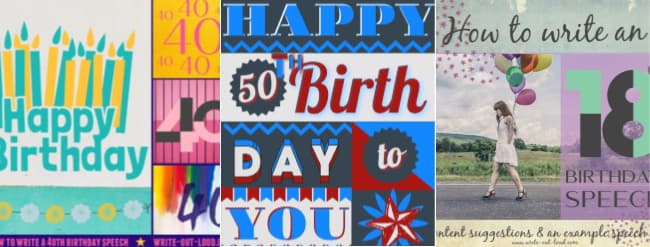
The first example is a 50th birthday speech for a man. It is written as if from a close male friend. You could call it a loving roast!
Here's the opening sentences:
"Good evening all. It's great to have you here. Most of you know my feeling on birthdays. Generally I say, what's the big deal?
By the time you've had over thirty, there should be a cease and desist order against them.
They're not unusual. Everybody has them and at the same rate as everybody else - one a year. They happen whether you want them to or not.
Believe me, I know. I've had quite a few and looking around this room I can see it's the same for others as well.
So why are we here?"
Read more: 50th birthday speech
40th birthday speech example
The second example is a 40 birthday speech for a daughter and the speech is written as if it comes from her mother.
These are the opening sentences:
"On behalf of the Martin family and Camille in particular, it is my pleasure to welcome you here tonight to her 40th birthday celebration.
We are delighted to have you with us and especial thanks to those who have traveled from afar.
Before we eat I am going to say a few words about my beautiful daughter. I've promised her two things. I'll keep it short and I won't embarrass her by telling tales she'd rather I forgot."
Read more: 40th birthday speech example
18th birthday speech sample
The third example is an 18th birthday speech of thanks . The speaker is thanking their family and friends for coming along to their 18th birthday celebration. It's a mix of humor and sincerity.
The speech begins like this:
"This is a moment I’ve waited a long time for. 18! I am an adult. Yep, I’ve come of age. Hard to believe, isn’t?
(Dad, you were not supposed to agree so quickly.)
I can now vote, drive a car, marry, buy alcohol, a lottery ticket and tobacco, get a tattoo, or join the military without having to ask permission. Let me see. Which one will I do first?
Perhaps a more honest question is, which of those will I continue to do without fear of getting caught?
And while you think about that, I’d like to say thank you."
Read more: 18th birthday speech
Christmas speech - an office party example
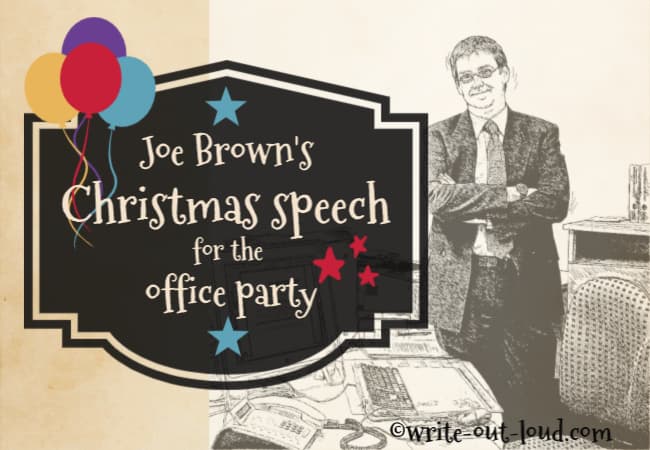
This example is a mix of notes, which the speaker Joe Brown will expand as he delivers the speech, and full text which he'll say as written. The speech follows the step by step process of an outline.
Here's an extract from the concluding sentences:
"It's been a tough year but I'm proud of what we accomplished together. Some businesses haven't been able to do what we have done.
Thanks to you we'll be going into the new year with strength, to build on our accomplishments and to consolidate our position.
Let's celebrate that. It's a gift to be grateful for."
To read more: Christmas office party speech example
2 short company Christmas party speech samples

You have the full text of these two short speeches to read. Both come in at between 2-3 minutes when delivered.
Here's an excerpt from one of them:
"OK, let's be honest; who thought we'd be gathered together for a heigh-ho-merry-old-time back in August? Remember? How can we possibly forget?!
- Martin and Co, one of our more significant customers, downsized their regular order by more than 50% - a move that caught us on the hop and had has us scrambling for a bit.
- There was a little more of that, when an opportunistic phishing expedition by some very clever clowns threatened to hold us to ransom."
For more please go to: 2 short company Christmas party speech samples .
This demonstration speech covers the process involved in learning to how to leave an effective voice mail message.
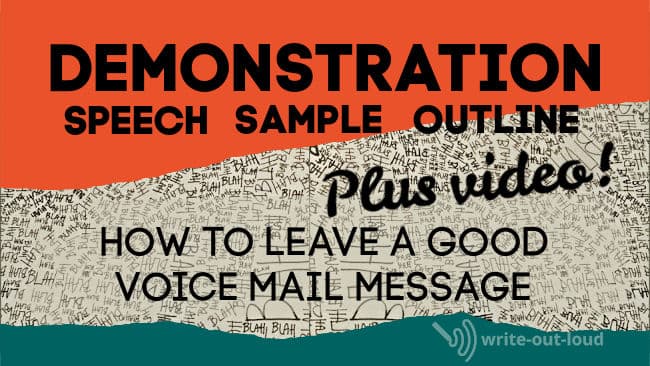
I've entered the text of the whole speech into a step by step outline template so that you can see the structure. Then I made a video (audio + slides) too, so you can hear as well as read it if you want to.
Here's the opening:
"How many important voice mail messages have you bumbled through after the beep? Does recalling them make you feel a little uncomfortable?
Yep, me too. I’ve blundered. Mumbled and muttered. If it were possible, I would have gladly saved the person I was calling the hassle of deleting those messages myself. Before they were heard."
Read more: sample demonstration speech
Engagement party speeches - 5 sample toasts
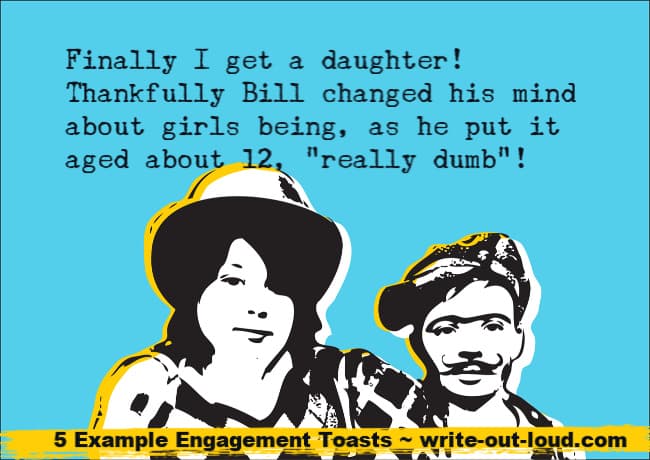
Here are five short (and sweet) engagement party speeches. They've been written from the point of view of a mother, a father, a friend, the groom and the bride-to-be.
The extract is the opening from the speech a mother might give:
"Mary welcome to the family!
While we're all delighted that Bill has shown such good sense in choosing you I've got an extra reason to celebrate. Finally I get a daughter! Thankfully Bill changed his mind about girls being, as he put it aged about 12, 'really dumb'."
To see all five speeches: engagement party toasts
Eulogy samples

We are extraordinarily blessed to be able offer over 70 eulogies for folk to read. These have been sent in by people from all over the world who intimately understand the need to see what others have written before beginning the task of writing a eulogy for a loved one of their own.
You'll find funeral speeches for mothers, fathers, aunts, uncles, cousins, friends, wives, husbands, sons, daughters, sisters, brothers, work colleagues...
Visit: eulogy examples
Two farewell speech examples
An example goodbye speech to colleagues .

This example farewell speech is written from the point of view of a person leaving their workplace: a goodbye speech to colleagues. It's upbeat and follows the suggested content guidelines you'll find when you visit the page. (There's a recording of it too.)
Here's part of the opening:
"Do you realize we've been sharing each other's company for 2920 days?
Eight years of fun times, challenging times and everything in between.
And today I am officially leaving you!"
Go to: farewell speech example : a goodbye speech to colleagues.
A sample farewell speech for a colleague leaving
Writing a farewell speech for a colleague who is leaving can be challenging. What do you put in? What do you leave out?
My example is the result of following a start to finish 7 step process for a speech to say goodbye to a co-worker.
Here's the introductory sentences:
"Who else has been marking off the days until Sam finally leaves us? It’s sad but from next Monday there’ll be a huge hole in our team. She’ll be basking in the sun on a beach in Bali and we’ll be wondering how we’re going to manage without her..."
To read more of the speech and to find out about the process of writing it click the link: farewell speech to a colleague leaving .

Golden wedding - 50th anniversary speech

What do white daisies, finding a stray coin down the back of the sofa, and motorbikes have in common?
Yes, they're all part of a golden wedding speech.
I've written this speech example as if it's being delivered by a man called Mark, to his much-loved wife of 50 years, Sarah.
Here's an excerpt from the beginning:
"After 50 years Sarah knows I am not good at romance or speaking about love. Those kind of words always got tangled on my tongue and caught between my teeth. They never did come out right, not as I intended anyway. Even when I proposed, it came out all wrong."
For more: 50th wedding anniversary speech example
An icebreaker speech for Toastmasters example

Ahh, the icebreaker speech! It's much loved by club members worldwide and whichever of the eleven Toastmaster pathways you choose when you join, this is always the first assignment.
My icebreaker example, 'Stepping up to speak out', was written to illustrate an easily followed, step by step, process for getting from topic choice to speech preparation and delivery.
The beginning of the speech goes like this:
"Would you be surprised to know I nearly didn't make it here tonight?
I wonder how many of you experienced a moment or two of panic before giving your icebreaker speech. Just nod to let me know. { pause - look around }
Thank you, that's very reassuring. You've survived, so probably I shall too.
I am here wobbling rather nervously in front of you for three main reasons which I'll share.
Here's the first."
For more: Icebreaker speech for Toastmasters
Samples of introduction speeches
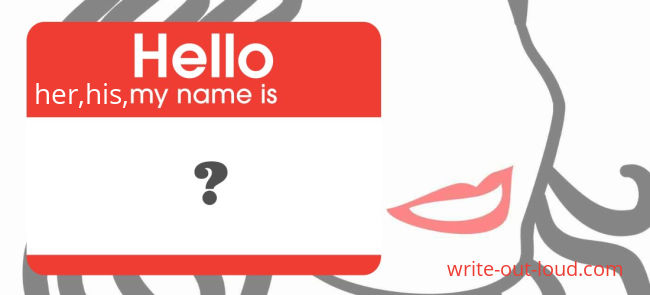
There two introduction speech examples for you to look at.
One is an example self introduction speech - the kind of brief 1-2 minute speech you are often expected to make to introduce yourself to a group of people you're meeting for the first time at some sort of workshop or similar event.
Here's the opening of that speech:
"Hi everybody!
I'm Masie Smith, Senior Marketing Executive, from Watts and Frederick in Smalltown, Bigstate.
It's great to be finally here. I've been dreaming about the opportunity and possibilities of working collectively and directly with each other for a long time now. Jane and Sam can attest to that. There's been hours put in balancing the schedules to make it happen.
Webinars and email are fine but nothing beats face to face ."
For more: self-introduction speech example
The second is an introduction speech in which you introduce a guest- speaker to an audience.
Here are the closing sentences. What's preceded them has carefully primed the audience to give the guest a warm welcome, by piling one piece of compelling biographical information on top of another.
"How she got from awkward tongue tied silence to an eloquent front line spokesperson is the story she will share with us tonight.
Ladies, I give you ... Rose Stephenson on speaking to lead."
For more: guest-speaker introduction example
Maid of Honor speech examples
There are three Maid of Honor (MOH) speeches for you to read: two from the point of view of a best friend, and one from the point of view of a sister.
You'll find step by step guidelines with examples to illustrate each part of the process of preparing a speech for yourself. Follow them carefully and you'll finish with a Maid of Honor speech you'll be proud to deliver.
Two Maid of Honor speech examples
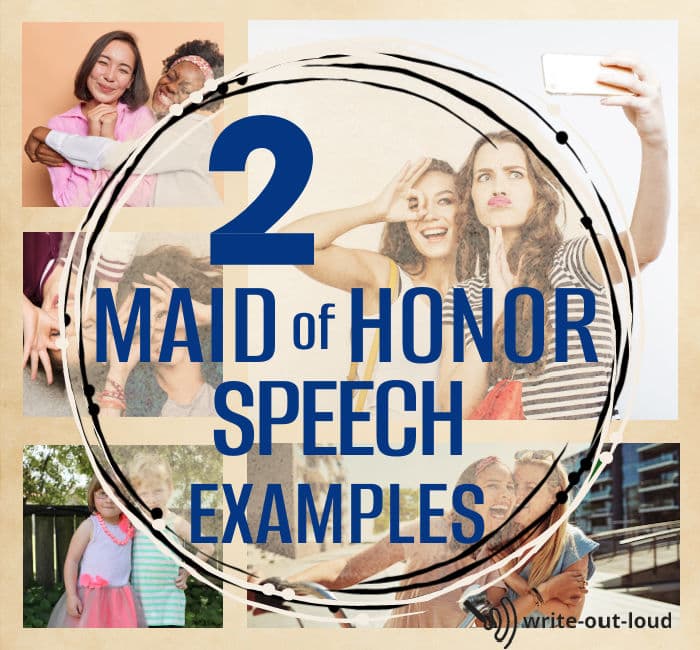
The first example is heartfelt, a speech written from the point of view of a close childhood friend. She's shared the best and most difficult of times with the bride.
Here are its opening sentences:
"Some one very wise, and obviously someone who knew Sonja and Mark said, “Don't marry a person you can live with. Marry somebody you can't live without."
That's what we're witnessing today – the union of two people who belong together. A perfect match!"
The second example is more light-hearted. It's a combination of sentiment and fun, and is written from the point of view of a trusted and loved friend.
Here's the beginning:
"Once in a while, in the middle of an ordinary life, love gives us a fairy tale.
That's what we're celebrating today: a story of true love, a dream come true.
My name is Felicity and it's my privilege to be Sarah’s Maid of Honor.
Sarah is my Best Friend. I know it's a cliché. However clichés become clichés for a very good reason, because they're true. She's my BFF: Best Friend Forever.
For her I would wear the gaudiest, frothiest taffeta maid of honor dress possible and still smile. Fortunately I don't have to."
For more see: Maid of Honor speech examples
A Maid of Honor speech for a sister example
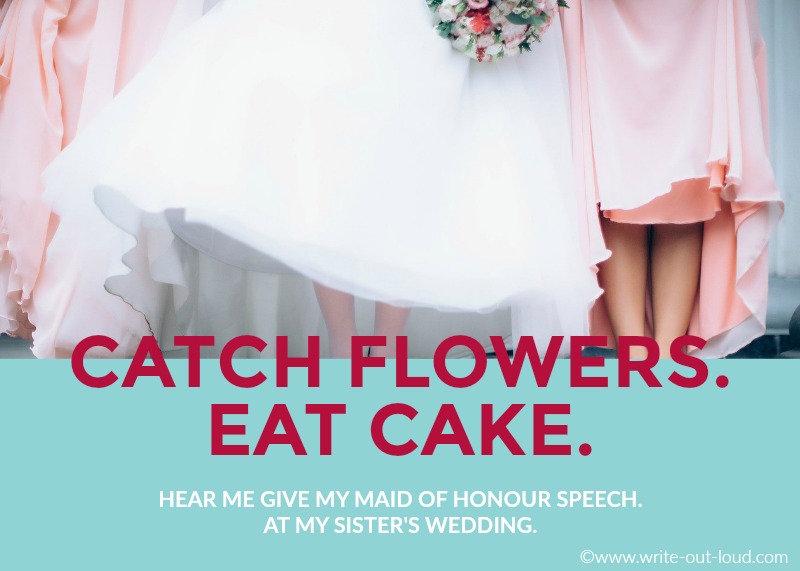
The opening segment of the speech is below. It recalls a loved childhood game which unites the past and present while drawing listeners in.
"What a day, Mary!
Remember when we were kids, how we dressed up in Mom’s old party dresses? Put a white table cloth on our heads and marched around, singing, “Here comes the bride, fair fat and wide.”?
My name is Jennifer, and this beautiful woman, this stunning bride – the antithesis of “fair fat and wide” is my beloved little sister.
We laughed ourselves silly over that game. Now here we are 25 years later.
Not laughing. Mary’s not wearing a table cloth. And this time it’s for real.
I am honored to be asked to speak. Thank you."
For more go to: maid of honor speech for a sister
As part of a page offering 150 one minute speech topics I wrote and then recorded three example speeches to demonstrate what you could do with a one minute speech.
One of those speeches was on the topic: 'What my work clothes say about me'.
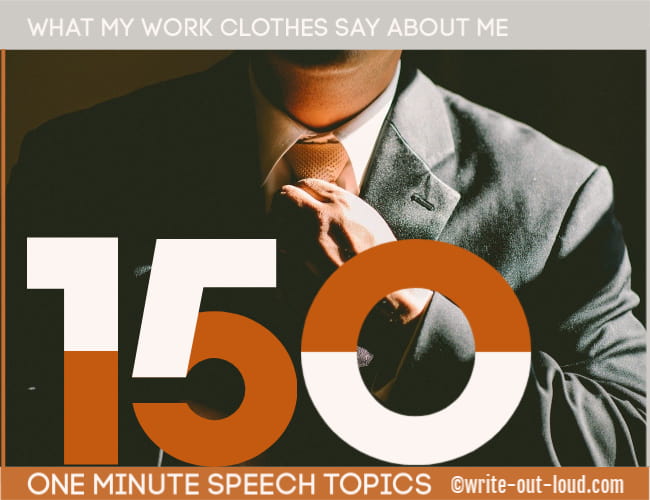
Here is the opening two paragraphs of that speech:
"Clothes make the man. Yes, we judge each other on what we wear. And have done forever.
For better, or for worse, in the western working world, nothing says dependable and professional as eloquently as a tailored grey business suit, a crisp white shirt and a pair of good shoes."
To read, and hear, all three speeches please visit: one minute speech topics *
* There is also a free downloadable printable one minute speech planner which will help you consolidate the process of putting a speech together with minimum fuss.
A persuasive speech example
Here's a persuasive speech example using Monroe's Motivated Sequence - a five step structural pattern frequently used by professional persuaders: politicians and marketers.
The topic is somber: suicide and its impact on those left behind. The purpose of the speech is to persuade listeners to learn more about the special needs of family members, friends and colleagues in the immediate aftermath of a suicide.
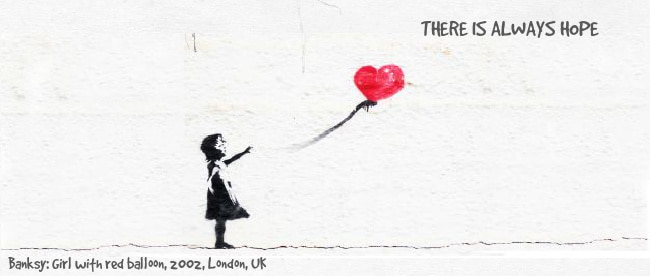
Here are the opening sentences:
"One fine Spring day I biked home from school and found a policemen guarding our backdoor. Through it came sounds I'll never forget; my quiet, well-mannered Mother screaming. He said, "You can't go in."
I kicked him in the shins and did. It was the 15th of September, three days before my thirteenth birthday and my father was dead. Killed by his own hand. Suicide."
Read more: persuasive speech example
A sample retirement speech
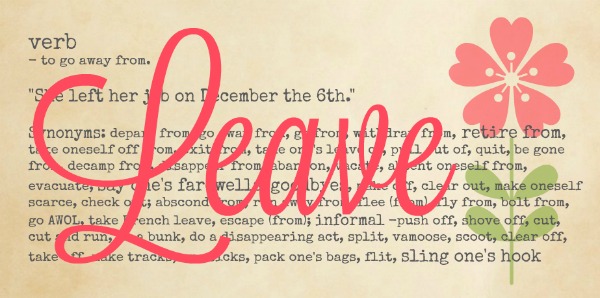
This retirement speech is an example of one that could be given by a teacher who's signing off after many years service in the same school.
Here's a taste of it:
"I've been asked what I'm going to do now. I'm going to do a lot of things and very few of them conform to the notion of retirement as a time of waiting for the inevitable end. Helen Hayes, put it this way: 'People who refuse to rest honorably on their laurels when they reach “retirement” age seem very admirable to me."
Read the whole speech: retirement speech sample
Sample student council speeches
This page has everything you need to help you prepare a winning student council speech: comprehensive guidelines, a template, example speeches and a printable speech planner and outline document.
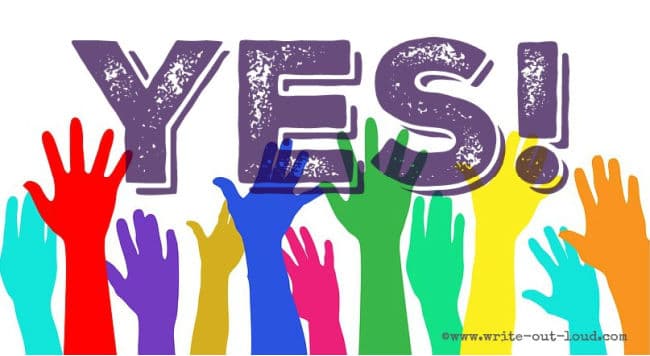
The speaker in my first example is running for president.
Here's the opening to her speech:
"I’ve got a question for you. I’m not asking you to shout your answer out, or raise your hand. All I’m asking is that you give it room in your mind. Let it sit for a bit, and have a think about it.
My question is – do you believe like I do, that all of us deserve the opportunity to make the best of ourselves? Not second best, 3 rd , or even, highly commended. The BEST."
Get the guidelines, the template, and read the whole speech: sample Student Council speech for President
And now I've added three more sample Student Council speeches:
- Student Council speech for Vice President
- Student Council speech for Secretary
- Student Council speech for Treasurer
Thank you speech sample
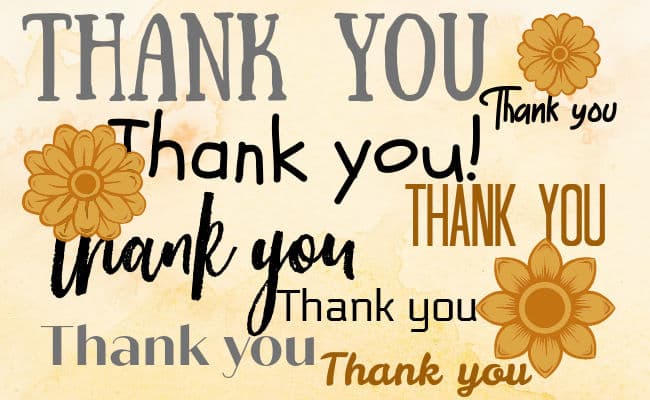
The example thank you speech expresses gratitude for being the recipient of a community service award.
"Who's considered the incredible power of thank you? Those two words express gratitude, humility, understanding, as well as acknowledgement.
I am here with you: my family, many of my friends and colleagues, because I need to say all of that, and then some more."
You'll find the full speech, and guidelines covering how to write a speech of thanks here: thank you speech example
An example tribute speech
A tribute speech may also be a commemorative speech. That is a speech celebrating, praising or paying tribute to the memory of: a person, a group, an institution, a thing, an event or even an idea. Or it could be a eulogy or funeral speech; a speech celebrating a person's life.
This example tribute speech was written in memory of my mother, Iris.

"My Mother's name marked her out as the goddess of the rainbow, a messenger for the ancient Olympian gods and carrier of faith, hope and wisdom.
She was Iris. And although the meaning of her name is rich in imagery and history that wasn't why her parent's called her that. Instead it was something much closer to home.
After her birth my grandmother saw iris flowering out her bedroom window. She was named for the regal beauty of their dark purple flowers."
Read more: sample tribute speech
Example welcome speeches
There are three welcome speech examples for you to read: welcome to an event, welcome to a church, and welcome to the family. All three come with guidelines to help you prepare a good welcome speech of your own.
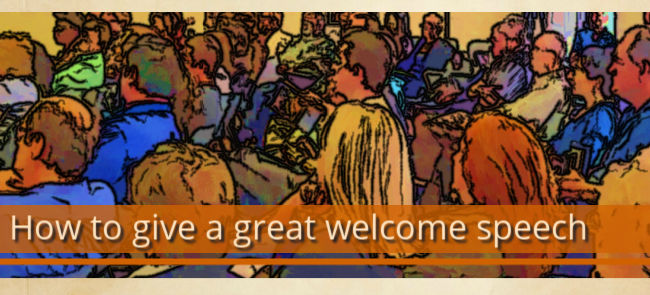
This example is welcoming listeners to an event. As part of that, the special guests are mentioned, as is, an outline of what's going to happen.
This is the opening:
"Sue-Ellen Thomas, Jim Smith, Jane Brown and all of our guests, welcome.
My name is April Molloy, and it's my privilege and pleasure on behalf of Parents United to welcome you here today.
We are delighted to have you with us to participate and share in our 5th annual Children's Day. Thank you for coming. That many of you have traveled long distances to be here serves as a reminder to us all just how important our work is."
You can read the rest here: sample welcome speech .
A church welcome speech example
This sample speech welcomes visitors to the congregation. Along with the speech you'll also find links to additional resources to assist.
Here's the opening passage:
"I want to take a moment to extend a very warm welcome to everyone who's visiting us for the first time this morning. Whether you're just having a look, or are searching out for a place to worship, we're delighted to have you here.
To give you some idea of what we're all about, I'll quickly sketch some of our foundational beliefs."
Read more: church welcome speech example
Example welcome to the family speech
This is a short, and sweet, speech welcoming a bride or groom-to-be into a family at an event arranged for that purpose. The template it uses is entirely flexible.
Mary {Replace the name Mary with the name of the person you are welcoming} - welcome to the family!
Family, tribe, clan, kin, group - call it what you will: it's us - all of us!
We're mothers, fathers, uncles, aunts, brothers, sisters, cousins, 3rd cousins, even 53rd cousins, old and young, generations of us, linked together through shared DNA and history.
Look around. The faces smiling back at you are now your people too."
See more: example welcome to the family speech
In addition to providing speech examples, I also custom write speeches.
If you have a speech to give for a special occasion that's coming up you may like to find out more, especially if you find writing stressful. ☺ Go to: speech writer for hire
speaking out loud
Subscribe for FREE weekly alerts about what's new For more see speaking out loud

Top 10 popular pages
- Welcome speech
- Demonstration speech topics
- Impromptu speech topic cards
- Thank you quotes
- Impromptu public speaking topics
- Farewell speeches
- Phrases for welcome speeches
- Student council speeches
- Free sample eulogies
From fear to fun in 28 ways
A complete one stop resource to scuttle fear in the best of all possible ways - with laughter.

Useful pages
- Search this site
- About me & Contact
- Blogging Aloud
- Free e-course
- Privacy policy
©Copyright 2006-24 www.write-out-loud.com
Designed and built by Clickstream Designs

How to Start a Speech: Tips and Examples for a Captivating Opening
By Status.net Editorial Team on December 12, 2023 — 11 minutes to read
When preparing a speech, knowing your audience is key. To tailor your message, consider their interests, demographics, and needs.
Choosing the Right Opening Line
Finding the perfect opening line for your speech is crucial in grabbing your audience’s attention. A strong opening line sets the stage for the points you want to make and helps you establish a connection with your listeners. Here are a few tips and examples to help you choose the right opening line.
1. Start with a question
Engage your audience from the very beginning by asking them a thought-provoking question related to your topic. This approach encourages them to think, and it can create a sense of anticipation about what’s coming next.
- “Have you ever wondered how much time we spend on our phones every day?”
2. Share a personal story
A relatable personal story can create an emotional connection with your audience. Make sure your story is short, relevant to your speech, and ends with a clear point.
- “When I was a child, my grandmother used to tell me that every kind deed we do plants a seed of goodness in the world. It was this philosophy that inspired me to start volunteering.”
3. Use a quote or a statistic
Incorporate a powerful quote or an intriguing statistic at the outset of your speech to engage your audience and provide context for your topic.
- “As the great Maya Angelou once said, ‘People will forget what you said, people will forget what you did, but people will never forget how you made them feel.'”
4. Make them laugh
Injecting a little humor into your opening line puts everyone at ease and makes your speech more memorable. Just make sure your joke is relevant and doesn’t offend your audience.
- “They say an apple a day keeps the doctor away, but if the doctor is cute, forget the fruit!”
5. Paint a mental picture
Draw your audience in by describing a vivid scene or painting an illustration in their minds. This creates an immersive experience that makes it easier for your audience to follow your speech.
- “Picture this: you’re walking down the beach, and you look out on the horizon. The sun is setting, and the sky is a breathtaking canvas of reds, oranges, and pinks.”
Using a Personal Story
Sharing a personal story can be a highly effective way to engage your audience from the very beginning of your speech. When you open your talk with a powerful, relatable story, it helps create an emotional connection with your listeners, making them more invested in what you have to say.
Think about an experience from your life that is relevant to the topic of your speech. Your story doesn’t have to be grand or dramatic, but it should be clear and vivid. Include enough detail to paint a picture in your audience’s minds, but keep it concise and on point.
The key to successfully using a personal story is to make it relatable. Choose a situation that your audience can empathize with or easily understand. For instance, if you’re giving a speech about overcoming adversity, you could talk about a time where you faced a seemingly insurmountable challenge and overcame it.
Make sure to connect your story to the main point or theme of your speech. After sharing your experience, explain how it relates to the topic at hand, and let your audience see the relevance to their own lives. This will make your speech more impactful and show your listeners why your personal story holds meaning.
Making a Shocking Statement
Starting your speech with a shocking statement can instantly grab your audience’s attention. This technique works especially well when your speech topic relates to a hot-button issue or a controversial subject. Just make sure that the statement is relevant and true, as false claims may damage your credibility.
For example, “Believe it or not, 90% of startups fail during their first five years in the market.” This statement might surprise your listeners and make them more receptive to your ideas on how to avoid pitfalls and foster a successful business.
So next time you’re crafting a speech, consider opening with a powerful shocking statement. It could be just the thing to get your audience sitting up and paying full attention. (Try to keep your shocking statement relevant to your speech topic and factual to enhance your credibility.)
Using Humor
Humor can be an excellent way to break the ice and grab your audience’s attention. Opening your speech with a funny story or a joke can make a memorable first impression. Just be sure to keep it relevant to your topic and audience.
A good joke can set a light-hearted tone, lead into the importance of effective time management, and get your audience engaged from the start.
When using humor in your speech, here are a few tips to keep in mind:
- Be relatable: Choose a story or joke that your audience can easily relate to. It will be more engaging and connect your listeners to your message.
- Keep it appropriate: Make sure the humor fits the occasion and audience. Stay away from controversial topics and avoid offending any particular group.
- Practice your delivery: Timing and delivery are essential when telling a joke. Practice saying it out loud and adjust your pacing and tone of voice to ensure your audience gets the joke.
- Go with the flow: If your joke flops or doesn’t get the reaction you were hoping for, don’t panic or apologize. Simply move on to the next part of your speech smoothly, and don’t let it shake your confidence.
- Don’t overdo it: While humor can be useful in capturing your audience’s attention, remember that you’re not a stand-up comedian. Use it sparingly and focus on getting your message across clearly and effectively.
Incorporating a Quote
When you want to start your speech with a powerful quote, ensure that the quote is relevant to your topic. Choose a quote from a credible source, such as a famous historical figure, a well-known author, or a respected expert in your field. This will not only grab your audience’s attention but also establish your speech’s credibility.
For example, if you’re giving a speech about resilience, you might use this quote by Nelson Mandela: “The greatest glory in living lies not in never falling, but in rising every time we fall.”
Once you’ve found the perfect quote, integrate it smoothly into your speech’s introduction. You can briefly introduce the source of the quote, providing context for why their words are significant. For example:
Nelson Mandela, an inspirational leader known for his perseverance, once said: “The greatest glory in living lies not in never falling, but in rising every time we fall.”
When you’re incorporating a quote in your speech, practice your delivery to ensure it has the intended impact. Focus on your tone, pace, and pronunciation. By doing so, you can convey the quote’s meaning effectively and connect with your audience emotionally.
Lastly, connect the quote to your main points by briefly explaining how it relates to the subject matter of your speech. By creating a natural transition from the quote to your topic, you can maintain your audience’s interest and set the stage for a compelling speech.
In our resilience example, this could look like:
“This quote by Mandela beautifully illustrates the power of resilience. Today, I want to share with you some stories of remarkable individuals who, like Mandela, overcame obstacles and rose every time they fell. Through their experiences, we might learn how to cultivate our own resilience and make the most of life’s challenges.”
Starting with a Question
Opening your speech with a question can be a great way to engage your audience from the start. This strategy encourages your listeners to think and become active participants in your presentation. Your opening question should be related to your core message, sparking their curiosity, and setting the stage for the following content. Here are a few examples:
- For a motivational speech : “Have you ever wondered what you would do if you couldn’t fail?”
- For a business presentation : “What’s the biggest challenge your team faces daily, and how can we overcome it?”
- For an educational talk : “How does the way we use technology today impact the future of our society?”
When choosing the right starting question, consider your audience. You want to ask something that is relevant to their experiences and interests. The question should be interesting enough to draw their attention and resonate with their emotions. For instance, if you’re presenting to a group of entrepreneurs, gear your question towards entrepreneurship, and so on.
To boost your question’s impact, consider using rhetorical questions. These don’t require a verbal response, but get your audience thinking about their experiences or opinions. Here’s an example:
- For an environmental speech : “What kind of world do we want to leave for our children?”
After posing your question, take a moment to let it sink in, and gauge the audience’s reaction. You can also use a brief pause to give the listeners time to think about their answers before moving on with your speech.
Acknowledging the Occasion
When starting a speech, you can acknowledge the occasion that brought everyone together. This helps create a connection with your audience and sets the stage for the rest of your speech. Make sure to mention the event name, its purpose, and any relevant individuals or groups you would like to thank for organizing it. For example:
“Hello everyone, and welcome to the 10th annual Charity Gala Dinner. I’m truly grateful to the fundraising committee for inviting me to speak tonight.”
After addressing the event itself, include a brief personal touch to show your connection with the topic or the audience. This helps the audience relate to you and gain interest in what you have to say. Here’s an example:
“As a long-time supporter of this cause, I am honored to share my thoughts on how we can continue making a difference in our community.”
Next, give a brief overview of your speech so the audience knows what to expect. This sets the context and helps them follow your points. You could say something like:
“Tonight, I’ll be sharing my experiences volunteering at the local food bank and discussing the impact of your generous donations.”
Frequently Asked Questions
What are some effective opening lines for speeches.
A powerful opening line will grab your audience’s attention and set the stage for the rest of your speech. Some effective opening lines include:
- Start with a bold statement: “The world needs your creativity now more than ever.”
- Share a surprising fact: “Did you know that the average person spends (…) years of their life at work?”
- Pose a thought-provoking question: “What would you attempt to do if you knew you could not fail?”
- Tell a short, engaging story: “When I was 10 years old, I discovered my passion for baking in my grandmother’s kitchen.”
Can you provide examples of engaging introductions for speeches?
- Use humor: “As a kid, I believed that 7 pm bedtime was a form of torture. Now, as an adult, I find myself dreaming of 7 pm bedtime.”
- Share a personal experience: “On a trip to Italy, I found myself lost in the winding streets of a small village. It was there, amidst my confusion, that I stumbled upon the best gelato I’d ever tasted.”
- Use an analogy: “Starting a new business is like taking a journey into the unknown. There will be challenges to overcome, and you’ll need resilience, determination, and a strong compass.”
Which speech styles can make a powerful impact on the audience?
Different speech styles will resonate with different audiences. Some styles to consider include:
- Inspirational: Motivate your audience to take action or overcome challenges.
- Storytelling: Share personal experiences or anecdotes to illustrate your points and keep listeners engaged.
- Educational: Provide useful information and insights to help your audience learn or grow.
- Persuasive: Present a compelling argument to convince your audience to adopt a particular perspective or take specific action.
How do successful speakers establish a connection with their listeners?
Establishing a connection with your listeners is key to delivering an impactful speech. Some ways to connect with your audience include:
- Show empathy: Demonstrating understanding and concern for your audience’s feelings and experiences will generate a sense of trust and connection.
- Be relatable: Share personal stories or examples that allow your audience to see themselves in your experiences, thus making your speech more relatable.
- Keep it genuine: Avoid overrehearsing or coming across as scripted. Instead, strive for authenticity and flexibility in your delivery.
- Encourage participation: Engaging your audience through questions, activities, or conversation can help build rapport and make them feel more involved.
What are some techniques for maintaining a friendly and professional tone in speeches?
To maintain a friendly and professional tone in your speeches, consider these tips:
- Balance humor and seriousness: Use humor to lighten the mood and engage your audience, but make sure to also cover the serious points in your speech.
- Speak naturally: Use your everyday vocabulary and avoid jargon or overly formal language when possible.
- Show respect: Acknowledge differing opinions and experiences, and treat your audience with courtesy and fairness.
- Provide useful information: Offer valuable insights and solutions to your audience’s concerns, ensuring they leave your speech feeling more informed and empowered.
- Emotional Intelligence (EQ) in Leadership [Examples, Tips]
- Effective Nonverbal Communication in the Workplace (Examples)
- Empathy: Definition, Types, and Tips for Effective Practice
- How to Improve Key Communication Skills
- Examples of Empathy (and 38 Empathy Statements)
- What is Self Compassion? (Exercises, Methods, Examples)
Informative Speeches — Types, Topics, and Examples

What is an informative speech?
An informative speech uses descriptions, demonstrations, and strong detail to explain a person, place, or subject. An informative speech makes a complex topic easier to understand and focuses on delivering information, rather than providing a persuasive argument.
Types of informative speeches
The most common types of informative speeches are definition, explanation, description, and demonstration.

A definition speech explains a concept, theory, or philosophy about which the audience knows little. The purpose of the speech is to inform the audience so they understand the main aspects of the subject matter.
An explanatory speech presents information on the state of a given topic. The purpose is to provide a specific viewpoint on the chosen subject. Speakers typically incorporate a visual of data and/or statistics.
The speaker of a descriptive speech provides audiences with a detailed and vivid description of an activity, person, place, or object using elaborate imagery to make the subject matter memorable.
A demonstrative speech explains how to perform a particular task or carry out a process. These speeches often demonstrate the following:
How to do something
How to make something
How to fix something
How something works

How to write an informative speech
Regardless of the type, every informative speech should include an introduction, a hook, background information, a thesis, the main points, and a conclusion.
Introduction
An attention grabber or hook draws in the audience and sets the tone for the speech. The technique the speaker uses should reflect the subject matter in some way (i.e., if the topic is serious in nature, do not open with a joke). Therefore, when choosing an attention grabber, consider the following:
What’s the topic of the speech?
What’s the occasion?
Who’s the audience?
What’s the purpose of the speech?

Common Attention Grabbers (Hooks)
Ask a question that allows the audience to respond in a non-verbal way (e.g., a poll question where they can simply raise their hands) or ask a rhetorical question that makes the audience think of the topic in a certain way yet requires no response.
Incorporate a well-known quote that introduces the topic. Using the words of a celebrated individual gives credibility and authority to the information in the speech.
Offer a startling statement or information about the topic, which is typically done using data or statistics. The statement should surprise the audience in some way.
Provide a brief anecdote that relates to the topic in some way.
Present a “what if” scenario that connects to the subject matter of the speech.
Identify the importance of the speech’s topic.
Starting a speech with a humorous statement often makes the audience more comfortable with the speaker.
Include any background information pertinent to the topic that the audience needs to know to understand the speech in its entirety.
The thesis statement shares the central purpose of the speech.
Demonstrate

Preview the main ideas that will help accomplish the central purpose. Typically, informational speeches will have an average of three main ideas.
Body paragraphs
Apply the following to each main idea (body) :
Identify the main idea ( NOTE: The main points of a demonstration speech would be the individual steps.)
Provide evidence to support the main idea
Explain how the evidence supports the main idea/central purpose
Transition to the next main idea

Review or restate the thesis and the main points presented throughout the speech.
Much like the attention grabber, the closing statement should interest the audience. Some of the more common techniques include a challenge, a rhetorical question, or restating relevant information:
Provide the audience with a challenge or call to action to apply the presented information to real life.
Detail the benefit of the information.
Close with an anecdote or brief story that illustrates the main points.
Leave the audience with a rhetorical question to ponder after the speech has concluded.
Detail the relevance of the presented information.

Before speech writing, brainstorm a list of informative speech topic ideas. The right topic depends on the type of speech, but good topics can range from video games to disabilities and electric cars to healthcare and mental health.
Informative speech topics
Some common informative essay topics for each type of informational speech include the following:
Informative speech examples
The following list identifies famous informational speeches:
“Duties of American Citizenship” by Theodore Roosevelt
“Duty, Honor, Country” by General Douglas MacArthur
“Strength and Dignity” by Theodore Roosevelt
Explanation
“Give Me Liberty or Give Me Death” by Patrick Henry
“The Decision to Go to the Moon” by John F. Kennedy
“We Shall Fight on the Beaches” by Winston Churchill
Description
“I Have a Dream” by Martin Luther King, Jr.
“Pearl Harbor Address” by Franklin Delano Roosevelt
“Luckiest Man” by Lou Gehrig
Demonstration
The Way to Cook with Julia Child
This Old House with Bob Vila
Bill Nye the Science Guy with Bill Nye

What this handout is about
This handout will help you create an effective speech by establishing the purpose of your speech and making it easily understandable. It will also help you to analyze your audience and keep the audience interested.
What’s different about a speech?
Writing for public speaking isn’t so different from other types of writing. You want to engage your audience’s attention, convey your ideas in a logical manner and use reliable evidence to support your point. But the conditions for public speaking favor some writing qualities over others. When you write a speech, your audience is made up of listeners. They have only one chance to comprehend the information as you read it, so your speech must be well-organized and easily understood. In addition, the content of the speech and your delivery must fit the audience.
What’s your purpose?
People have gathered to hear you speak on a specific issue, and they expect to get something out of it immediately. And you, the speaker, hope to have an immediate effect on your audience. The purpose of your speech is to get the response you want. Most speeches invite audiences to react in one of three ways: feeling, thinking, or acting. For example, eulogies encourage emotional response from the audience; college lectures stimulate listeners to think about a topic from a different perspective; protest speeches in the Pit recommend actions the audience can take.
As you establish your purpose, ask yourself these questions:
- What do you want the audience to learn or do?
- If you are making an argument, why do you want them to agree with you?
- If they already agree with you, why are you giving the speech?
- How can your audience benefit from what you have to say?
Audience analysis
If your purpose is to get a certain response from your audience, you must consider who they are (or who you’re pretending they are). If you can identify ways to connect with your listeners, you can make your speech interesting and useful.
As you think of ways to appeal to your audience, ask yourself:
- What do they have in common? Age? Interests? Ethnicity? Gender?
- Do they know as much about your topic as you, or will you be introducing them to new ideas?
- Why are these people listening to you? What are they looking for?
- What level of detail will be effective for them?
- What tone will be most effective in conveying your message?
- What might offend or alienate them?
For more help, see our handout on audience .
Creating an effective introduction
Get their attention, otherwise known as “the hook”.
Think about how you can relate to these listeners and get them to relate to you or your topic. Appealing to your audience on a personal level captures their attention and concern, increasing the chances of a successful speech. Speakers often begin with anecdotes to hook their audience’s attention. Other methods include presenting shocking statistics, asking direct questions of the audience, or enlisting audience participation.
Establish context and/or motive
Explain why your topic is important. Consider your purpose and how you came to speak to this audience. You may also want to connect the material to related or larger issues as well, especially those that may be important to your audience.
Get to the point
Tell your listeners your thesis right away and explain how you will support it. Don’t spend as much time developing your introductory paragraph and leading up to the thesis statement as you would in a research paper for a course. Moving from the intro into the body of the speech quickly will help keep your audience interested. You may be tempted to create suspense by keeping the audience guessing about your thesis until the end, then springing the implications of your discussion on them. But if you do so, they will most likely become bored or confused.
For more help, see our handout on introductions .
Making your speech easy to understand
Repeat crucial points and buzzwords.
Especially in longer speeches, it’s a good idea to keep reminding your audience of the main points you’ve made. For example, you could link an earlier main point or key term as you transition into or wrap up a new point. You could also address the relationship between earlier points and new points through discussion within a body paragraph. Using buzzwords or key terms throughout your paper is also a good idea. If your thesis says you’re going to expose unethical behavior of medical insurance companies, make sure the use of “ethics” recurs instead of switching to “immoral” or simply “wrong.” Repetition of key terms makes it easier for your audience to take in and connect information.
Incorporate previews and summaries into the speech
For example:
“I’m here today to talk to you about three issues that threaten our educational system: First, … Second, … Third,”
“I’ve talked to you today about such and such.”
These kinds of verbal cues permit the people in the audience to put together the pieces of your speech without thinking too hard, so they can spend more time paying attention to its content.
Use especially strong transitions
This will help your listeners see how new information relates to what they’ve heard so far. If you set up a counterargument in one paragraph so you can demolish it in the next, begin the demolition by saying something like,
“But this argument makes no sense when you consider that . . . .”
If you’re providing additional information to support your main point, you could say,
“Another fact that supports my main point is . . . .”
Helping your audience listen
Rely on shorter, simpler sentence structures.
Don’t get too complicated when you’re asking an audience to remember everything you say. Avoid using too many subordinate clauses, and place subjects and verbs close together.
Too complicated:
The product, which was invented in 1908 by Orville Z. McGillicuddy in Des Moines, Iowa, and which was on store shelves approximately one year later, still sells well.
Easier to understand:
Orville Z. McGillicuddy invented the product in 1908 and introduced it into stores shortly afterward. Almost a century later, the product still sells well.
Limit pronoun use
Listeners may have a hard time remembering or figuring out what “it,” “they,” or “this” refers to. Be specific by using a key noun instead of unclear pronouns.
Pronoun problem:
The U.S. government has failed to protect us from the scourge of so-called reality television, which exploits sex, violence, and petty conflict, and calls it human nature. This cannot continue.
Why the last sentence is unclear: “This” what? The government’s failure? Reality TV? Human nature?
More specific:
The U.S. government has failed to protect us from the scourge of so-called reality television, which exploits sex, violence, and petty conflict, and calls it human nature. This failure cannot continue.
Keeping audience interest
Incorporate the rhetorical strategies of ethos, pathos, and logos.
When arguing a point, using ethos, pathos, and logos can help convince your audience to believe you and make your argument stronger. Ethos refers to an appeal to your audience by establishing your authenticity and trustworthiness as a speaker. If you employ pathos, you appeal to your audience’s emotions. Using logos includes the support of hard facts, statistics, and logical argumentation. The most effective speeches usually present a combination these rhetorical strategies.
Use statistics and quotations sparingly
Include only the most striking factual material to support your perspective, things that would likely stick in the listeners’ minds long after you’ve finished speaking. Otherwise, you run the risk of overwhelming your listeners with too much information.
Watch your tone
Be careful not to talk over the heads of your audience. On the other hand, don’t be condescending either. And as for grabbing their attention, yelling, cursing, using inappropriate humor, or brandishing a potentially offensive prop (say, autopsy photos) will only make the audience tune you out.
Creating an effective conclusion
Restate your main points, but don’t repeat them.
“I asked earlier why we should care about the rain forest. Now I hope it’s clear that . . .” “Remember how Mrs. Smith couldn’t afford her prescriptions? Under our plan, . . .”
Call to action
Speeches often close with an appeal to the audience to take action based on their new knowledge or understanding. If you do this, be sure the action you recommend is specific and realistic. For example, although your audience may not be able to affect foreign policy directly, they can vote or work for candidates whose foreign policy views they support. Relating the purpose of your speech to their lives not only creates a connection with your audience, but also reiterates the importance of your topic to them in particular or “the bigger picture.”
Practicing for effective presentation
Once you’ve completed a draft, read your speech to a friend or in front of a mirror. When you’ve finished reading, ask the following questions:
- Which pieces of information are clearest?
- Where did I connect with the audience?
- Where might listeners lose the thread of my argument or description?
- Where might listeners become bored?
- Where did I have trouble speaking clearly and/or emphatically?
- Did I stay within my time limit?
Other resources
- Toastmasters International is a nonprofit group that provides communication and leadership training.
- Allyn & Bacon Publishing’s Essence of Public Speaking Series is an extensive treatment of speech writing and delivery, including books on using humor, motivating your audience, word choice and presentation.
Works consulted
We consulted these works while writing this handout. This is not a comprehensive list of resources on the handout’s topic, and we encourage you to do your own research to find additional publications. Please do not use this list as a model for the format of your own reference list, as it may not match the citation style you are using. For guidance on formatting citations, please see the UNC Libraries citation tutorial . We revise these tips periodically and welcome feedback.
Boone, Louis E., David L. Kurtz, and Judy R. Block. 1997. Contemporary Business Communication . Upper Saddle River, NJ: Prentice Hall.
Ehrlich, Henry. 1994. Writing Effective Speeches . New York: Marlowe.
Lamb, Sandra E. 1998. How to Write It: A Complete Guide to Everything You’ll Ever Write . Berkeley: Ten Speed Press.
You may reproduce it for non-commercial use if you use the entire handout and attribute the source: The Writing Center, University of North Carolina at Chapel Hill
Make a Gift
You are using an outdated browser. Please upgrade your browser or activate Google Chrome Frame to improve your experience.
13 Speeches in English for Listening and Speaking Practice
Giving a speech in front of a whole room of people can be pretty scary. Especially if you are giving a speech in English as a non-native speaker.
But you can learn from the best.
You can watch videos of famous, effective speeches in English to learn how to do it the right way .
In this post we will share 13 amazing speeches in English that you can use to become a more confident speaker yourself.
1. Speech on Kindness by a 10-year-old Girl
2. “the effects of lying” by georgia haukom, 3. “education for all” by cameron allen, 4. gender equality speech by emma watson, 5. “rocky balboa speech” by sylvester stallone, 6. 2008 presidential acceptance speech by president barack obama, 7. “this is water” speech by david foster wallace, 8. “the great dictator speech” by charlie chaplin, 9. 2018 golden globe speech by oprah winfrey, 10. “i have a dream” speech by martin luther king jr., 11. “the gettysburg address” by abraham lincoln, 12. “britain does owe reparations” by shashi tharoor, 13. mark antony’s speech by william shakespeare, and one more thing....
Download: This blog post is available as a convenient and portable PDF that you can take anywhere. Click here to get a copy. (Download)
Level: Beginner
Do you think people should be kind to one another? This speaker sure does. And she knows how to convince you of the same.
This is a perfect informative speech for beginner English learners . The speaker is a child who is able to speak fluently but with simple words . She also uses her gestures and facial expressions to communicate her emotions with the audience.
This speech is perfect for listening practice . However, learners should be aware that her pauses are not perfect. Learners should focus more on her words and the content of the speech than her intonation or pacing while practicing.
Even though the speaker is a student in the fourth grade, her speech is one of the most interactive speeches I have seen. She starts with a game and is able to make her main point through the game itself.
English learners will enjoy her speech especially because the vocabulary she uses is simple and can be easily learned. But it does not feel like a beginner wrote this speech because she uses her words so well.
If you want to learn the art of making basic arguments while speaking, you should watch this speech. She is able to convince her audience because she is able to connect with them through games and stories.
She also uses scientific studies to back up (support) her main points.
Level: Intermediate
This is a short and simple speech about why everyone in the world should get an education. Because the speaker is a child, the speech does not have complex words or sentence structures.
This is also a classic example of an informative speech. The speaker presents the main argument and the facts simply and clearly . She also gives the basic definitions of important terms in the speech itself.
This speech is perfect for English listening and speaking practice because it is so short but also full of useful information. It is also a good example of the standard American English accent .
Emma Watson is a famous English actress who is best known for her role in the “Harry Potter” movie series as Hermione. She is also a United Nations Women Goodwill Ambassador .
In this speech, she is trying to both inform and convince the audience of why men should support feminism. Feminism is a movement that asks for equal rights and opportunities for women.
She mixes her formal tone with personal stories to do this. The speech is also a good example of British English .
This is a speech taken from the movie “Rocky Balboa.” In this scene, Rocky, played by Sylvester Stallone, is talking to his son.
His speech is a classic example of a motivational speech . In these kinds of speeches, a person tries to inspire someone else, especially when the listener feels hopeless or is full of shame.
The basic message of the speech is that no matter how strong a person is, he or she will always face difficulties. And even though the message does not sound positive, Stallone’s way of speaking still makes it inspiring.
Stallone is able to communicate his message with love, even though he is criticizing his son and telling him difficult facts about the world. Generally, this is called “tough love” in English.
Listeners should also notice how he uses gestures to make his point .
Compare this speech with the Oprah Winfrey and Martin Luther King speeches (later in this list). All of them inspire their audiences but have really different tones. Stallone’s speech is the most informal and personal while Martin Luther King’s speech is the most formal and written for a large audience. All these speeches are in American English.
Barack Obama was the first African American elected as president by U.S. citizens. He gave this speech after he won the election.
English learners can discover a lot from his speech. Obama talks about the most important issues Americans were facing back then and are still important to them. He also uses a kind of American English that is easy to understand . His speech is mainly about the values that he and Americans stand for.
Obama’s accent is a mixture of standard American English and the way of speaking commonly popular in African American communities. He is an expert in using pauses so that the audience can follow his words without breaking his rhythm.
As the speech is longer than most others on this list, you may want to listen to it in parts rather than beginning-to-end.
Level: Advanced
This speech is a perfect example of the mixture of casual and formal English . David Foster Wallace was an award-winning American writer who wrote about the culture of the U.S.
In this speech, he talks about the value of an education in liberal arts (general academic subjects, as opposed to technical/professional training). He believes that this kind of education teaches you how to think and think about others.
This is a good example of American English. Be aware that in some parts of the speech he also uses swear words (rude/offensive words) to create an emotional impact on the audience. This is very close to how people generally communicate with one another in daily life.
So, this speech is better for learning casual English even though it is a speech given at a university.
Level: Intermediate to Advanced
Charlie Chaplin is generally known for his gestures and facial expressions. In this movie, he proves that he can use speech as well to inspire and entertain the viewers.
The movie “The Great Dictator” is a satire about the rise of authoritarian governments in Europe. The word “authoritarian” means a person or a government that believes in controlling others and does not believe in freedom.
In this speech, Charlie Chaplin copies Adolf Hitler , but his message is exactly the opposite of Hitler’s ideas.
The interesting thing about the speech is how Chaplin uses short sentences for the most impact . There is also a lot of repetition that makes it easy for the audience to follow the speech.
Chaplin uses the tone, rhythm and pitch of his voice to make the speech interesting instead of using varied words. Chaplin’s speech can be categorized as inspirational or motivational. It does not use formal words but neither is it casual or informal.
Oprah Winfrey is an American talk show host and actor who is known around the world for her interviews. In the 2018 Golden Globe Awards, she was awarded the Cecil B. deMille award .
Her speech at the award show is about many different topics related to American society. She is the first African American woman to be awarded the prize . She talks about how watching an African American celebrity get another big entertainment award many years ago changed her life.
She also talks about sexual assault and the search for justice in American society. The MeToo movement is the main subject of the speech.
Even though the speech is in formal English , Oprah is able to make it emotional and personal .
Learners should focus on how she uses chunking in her sentences . Chunking is the technique of grouping words (called chunks) in a sentence with a slight pause between every chunk. It also helps with intonation and the rhythm of speaking.
This is one of the most well-known speeches of the last century . Martin Luther King Jr. was a leader of the civil rights movement in the U.S. The movement demanded that people of different races should be treated equally. This speech summarized the main vision of the movement using metaphors and repetition .
The speech begins by referring to the “Emancipation Proclamation.” The proclamation (official announcement) was an order by President Abraham Lincoln in 1863 that freed many slaves in the U.S. Martin Luther King talks about this because most of the slaves were African Americans and it was their first step towards freedom.
Advanced learners can learn about the history and cultural conflicts of America through this speech. It is also a perfect example of the use of formal English to convince other people .
Some of the words used in this speech are no longer common in American English. “Negro” is often regarded as an insult and learners should use words like “African American” instead.
This speech, delivered by the 16th president of the U.S. (Abraham Lincoln, whom we just discussed above) is considered to be one of the best speeches in English .
Lincoln delivered this in Gettysburg, Pennsylvania where many soldiers had died fighting a civil war. It was fought between Americans who wanted to ban slavery and people who did not. Lincoln was there to dedicate a graveyard to the soldiers.
In this speech, Lincoln reminds the people why this was an important war. He mentions that the U.S. was created on the values of liberty and equality. And this civil war was a test of whether a nation based on these values can last for long or not.
He honors the soldiers by saying that they have already “consecrated” the land for the people of America. (“To consecrate” means to make something sacred or holy.) He reminds the audience that they have to make sure that the idea of America as a nation of freedom continues so that the efforts of these soldiers are not wasted.
This is a very short speech . Learners can easily listen to it multiple times in a practice session. But only advanced learners can understand it since it has several difficult words in it. For instance, “score” is an outdated term used for the number 20. And when he mentions the word “fathers” in the first line he is actually referring to the leaders who had founded the country of America.
Even though Shashi Tharoor is not a native English speaker, his English is so fluent that he sounds like one. Learners from India will instantly recognize him because he is famous there for his English skills.
In this video, he is giving a speech as a part of a debate at Oxford University . He lists out arguments that support the idea that the U.K. should give reparations to its colonies. “Reparations” are payments to a country or community for some harm done to them. A colony is a region or a country that is controlled by another country by force.
Britain had a large number of colonies throughout the world between the 16th and 20th centuries. In this speech, Tharoor tries to convince his audience that the U.K. should give something for the damage they did to the countries they had colonized.
This is one of the finest examples of a formal speech in today’s English . Learners who want to go into academics can learn how to organize their arguments with evidence.
The speech is also great for vocabulary practice . Plus, Tharoor has deep knowledge of both the national history of the U.K. and the colonial history of India. Apart from the content of the speech, his way of speaking is also impressive and is similar to formal British English .
This speech is part of a play called “Julius Caesar” written by William Shakespeare. The play is based on the life and murder of Caesar who was a leader of the Roman Empire. The speech is considered to be one of the finest pieces of English literature .
It is also one of the best examples of the use of rhetoric (the art of speaking and persuasion).
Mark Antony makes this speech after Caesar is killed by other leaders of the Roman Empire. Antony was a close friend of Caesar’s and here he tries to remind the people of Rome that Caesar was actually a good man. He has to convince the people that his murderers like Brutus are actually criminals. But he has to do so without directly blaming the murderers.
Advanced learners should know this speech mainly because of its cultural value.
Many words in this speech have been replaced by other words in today’s English. “Hath” is the older form of “has” or “had.” “Thou” has also been replaced by the word “you.”
So rather than memorizing the vocabulary, learners should focus on how Damian Lewis delivers the speech instead. The intonation, tone, pitch and rhythm is similar to the formal English used today. He is also good at conveying emotions through pauses and expressions.
If you keep watching videos of native speakers talking, you’ll get used to hearing how different people talk in English. After watching these speeches, you could look for more speeches or interviews on YouTube.
A video-based immersion program can give you even more native speech to work with. FluentU , for example, features news clips and inspiring talks among its English language videos.
The best way to learn the art of speaking is to first copy great speakers. Try to speak the same words in a style that is natural and comfortable to you. These speeches in English are the perfect material to master it!
If you like learning English through movies and online media, you should also check out FluentU. FluentU lets you learn English from popular talk shows, catchy music videos and funny commercials , as you can see here:

If you want to watch it, the FluentU app has probably got it.
The FluentU app and website makes it really easy to watch English videos. There are captions that are interactive. That means you can tap on any word to see an image, definition, and useful examples.

FluentU lets you learn engaging content with world famous celebrities.
For example, when you tap on the word "searching," you see this:

FluentU lets you tap to look up any word.
Learn all the vocabulary in any video with quizzes. Swipe left or right to see more examples for the word you’re learning.

FluentU helps you learn fast with useful questions and multiple examples. Learn more.
The best part? FluentU remembers the vocabulary that you’re learning. It gives you extra practice with difficult words—and reminds you when it’s time to review what you’ve learned. You have a truly personalized experience.
Start using the FluentU website on your computer or tablet or, better yet, download the FluentU app from the iTunes or Google Play store. Click here to take advantage of our current sale! (Expires at the end of this month.)
Enter your e-mail address to get your free PDF!
We hate SPAM and promise to keep your email address safe

15 Powerful Speech Opening Lines (And How to Create Your Own)
Hrideep barot.
- Public Speaking , Speech Writing

Powerful speech opening lines set the tone and mood of your speech. It’s what grips the audience to want to know more about the rest of your talk.
The first few seconds are critical. It’s when you have maximum attention of the audience. And you must capitalize on that!
Instead of starting off with something plain and obvious such as a ‘Thank you’ or ‘Good Morning’, there’s so much more you can do for a powerful speech opening (here’s a great article we wrote a while ago on how you should NOT start your speech ).
To help you with this, I’ve compiled some of my favourite openings from various speakers. These speakers have gone on to deliver TED talks , win international Toastmaster competitions or are just noteworthy people who have mastered the art of communication.
After each speaker’s opening line, I have added how you can include their style of opening into your own speech. Understanding how these great speakers do it will certainly give you an idea to create your own speech opening line which will grip the audience from the outset!
Alright! Let’s dive into the 15 powerful speech openings…
Note: Want to take your communications skills to the next level? Book a complimentary consultation with one of our expert communication coaches. We’ll look under the hood of your hurdles and pick two to three growth opportunities so you can speak with impact!
1. Ric Elias
Opening: “Imagine a big explosion as you climb through 3,000 ft. Imagine a plane full of smoke. Imagine an engine going clack, clack, clack. It sounds scary. Well I had a unique seat that day. I was sitting in 1D.”
How to use the power of imagination to open your speech?
Putting your audience in a state of imagination can work extremely well to captivate them for the remainder of your talk.
It really helps to bring your audience in a certain mood that preps them for what’s about to come next. Speakers have used this with high effectiveness by transporting their audience into an imaginary land to help prove their point.
When Ric Elias opened his speech, the detail he used (3000 ft, sound of the engine going clack-clack-clack) made me feel that I too was in the plane. He was trying to make the audience experience what he was feeling – and, at least in my opinion, he did.
When using the imagination opening for speeches, the key is – detail. While we want the audience to wander into imagination, we want them to wander off to the image that we want to create for them. So, detail out your scenario if you’re going to use this technique.
Make your audience feel like they too are in the same circumstance as you were when you were in that particular situation.
2. Barack Obama
Opening: “You can’t say it, but you know it’s true.”
3. Seth MacFarlane
Opening: “There’s nowhere I would rather be on a day like this than around all this electoral equipment.” (It was raining)
How to use humour to open your speech?
When you use humour in a manner that suits your personality, it can set you up for a great speech. Why? Because getting a laugh in the first 30 seconds or so is a great way to quickly get the audience to like you.
And when they like you, they are much more likely to listen to and believe in your ideas.
Obama effortlessly uses his opening line to entice laughter among the audience. He brilliantly used the setting (the context of Trump becoming President) and said a line that completely matched his style of speaking.
Saying a joke without really saying a joke and getting people to laugh requires you to be completely comfortable in your own skin. And that’s not easy for many people (me being one of them).
If the joke doesn’t land as expected, it could lead to a rocky start.
Keep in mind the following when attempting to deliver a funny introduction:
- Know your audience: Make sure your audience gets the context of the joke (if it’s an inside joke among the members you’re speaking to, that’s even better!). You can read this article we wrote where we give you tips on how you can actually get to know your audience better to ensure maximum impact with your speech openings
- The joke should suit your natural personality. Don’t make it look forced or it won’t elicit the desired response
- Test the opening out on a few people who match your real audience. Analyze their response and tweak the joke accordingly if necessary
- Starting your speech with humour means your setting the tone of your speech. It would make sense to have a few more jokes sprinkled around the rest of the speech as well as the audience might be expecting the same from you
4. Mohammed Qahtani
Opening: Puts a cigarette on his lips, lights a lighter, stops just before lighting the cigarette. Looks at audience, “What?”
5. Darren Tay
Opening: Puts a white pair of briefs over his pants.
How to use props to begin your speech?
The reason props work so well in a talk is because in most cases the audience is not expecting anything more than just talking. So when a speaker pulls out an object that is unusual, everyone’s attention goes right to it.
It makes you wonder why that prop is being used in this particular speech.
The key word here is unusual . To grip the audience’s attention at the beginning of the speech, the prop being used should be something that the audience would never expect. Otherwise, it just becomes something that is common. And common = boring!
What Mohammed Qahtani and Darren Tay did superbly well in their talks was that they used props that nobody expected them to.
By pulling out a cigarette and lighter or a white pair of underwear, the audience can’t help but be gripped by what the speaker is about to do next. And that makes for a powerful speech opening.
6. Simon Sinek
Opening: “How do you explain when things don’t go as we assume? Or better, how do you explain when others are able to achieve things that seem to defy all of the assumptions?”
7. Julian Treasure
Opening: “The human voice. It’s the instrument we all play. It’s the most powerful sound in the world. Probably the only one that can start a war or say “I love you.” And yet many people have the experience that when they speak people don’t listen to them. Why is that? How can we speak powerfully to make change in the world?”
How to use questions to open a speech?
I use this method often. Starting off with a question is the simplest way to start your speech in a manner that immediately engages the audience.
But we should keep our questions compelling as opposed to something that is fairly obvious.
I’ve heard many speakers start their speeches with questions like “How many of us want to be successful?”
No one is going to say ‘no’ to that and frankly, I just feel silly raising my hand at such questions.
Simon Sinek and Jullian Treasure used questions in a manner that really made the audience think and make them curious to find out what the answer to that question is.
What Jullian Treasure did even better was the use of a few statements which built up to his question. This made the question even more compelling and set the theme for what the rest of his talk would be about.
So think of what question you can ask in your speech that will:
- Set the theme for the remainder of your speech
- Not be something that is fairly obvious
- Be compelling enough so that the audience will actually want to know what the answer to that question will be
8. Aaron Beverley
Opening: Long pause (after an absurdly long introduction of a 57-word speech title). “Be honest. You enjoyed that, didn’t you?”
How to use silence for speech openings?
The reason this speech opening stands out is because of the fact that the title itself is 57 words long. The audience was already hilariously intrigued by what was going to come next.
But what’s so gripping here is the way Aaron holds the crowd’s suspense by…doing nothing. For about 10 to 12 seconds he did nothing but stand and look at the audience. Everyone quietened down. He then broke this silence by a humorous remark that brought the audience laughing down again.
When going on to open your speech, besides focusing on building a killer opening sentence, how about just being silent?
It’s important to keep in mind that the point of having a strong opening is so that the audience’s attention is all on you and are intrigued enough to want to listen to the rest of your speech.
Silence is a great way to do that. When you get on the stage, just pause for a few seconds (about 3 to 5 seconds) and just look at the crowd. Let the audience and yourself settle in to the fact that the spotlight is now on you.
I can’t put my finger on it, but there is something about starting the speech off with a pure pause that just makes the beginning so much more powerful. It adds credibility to you as a speaker as well, making you look more comfortable and confident on stage.
If you want to know more about the power of pausing in public speaking , check out this post we wrote. It will give you a deeper insight into the importance of pausing and how you can harness it for your own speeches. You can also check out this video to know more about Pausing for Public Speaking:
9. Dan Pink
Opening: “I need to make a confession at the outset here. Little over 20 years ago, I did something that I regret. Something that I’m not particularly proud of. Something that in many ways I wish no one would ever know but that here I feel kind of obliged to reveal.”
10. Kelly McGonigal
Opening: “I have a confession to make. But first I want you to make a little confession to me.”
How to use a build-up to open your speech?
When there are so many amazing ways to start a speech and grip an audience from the outset, why would you ever choose to begin your speech with a ‘Good morning?’.
That’s what I love about build-ups. They set the mood for something awesome that’s about to come in that the audience will feel like they just have to know about.
Instead of starting a speech as it is, see if you can add some build-up to your beginning itself. For instance, in Kelly McGonigal’s speech, she could have started off with the question of stress itself (which she eventually moves on to in her speech). It’s not a bad way to start the speech.
But by adding the statement of “I have a confession to make” and then not revealing the confession for a little bit, the audience is gripped to know what she’s about to do next and find out what indeed is her confession.
11. Tim Urban
Opening: “So in college, I was a government major. Which means that I had to write a lot of papers. Now when a normal student writes a paper, they might spread the work out a little like this.”
12. Scott Dinsmore
Opening: “8 years ago, I got the worst career advice of my life.”
How to use storytelling as a speech opening?
“The most powerful person in the world is the storyteller.” Steve Jobs
Storytelling is the foundation of good speeches. Starting your speech with a story is a great way to grip the audience’s attention. It makes them yearn to want to know how the rest of the story is going to pan out.
Tim Urban starts off his speech with a story dating back to his college days. His use of slides is masterful and something we all can learn from. But while his story sounds simple, it does the job of intriguing the audience to want to know more.
As soon as I heard the opening lines, I thought to myself “If normal students write their paper in a certain manner, how does Tim write his papers?”
Combine such a simple yet intriguing opening with comedic slides, and you’ve got yourself a pretty gripping speech.
Scott Dismore’s statement has a similar impact. However, just a side note, Scott Dismore actually started his speech with “Wow, what an honour.”
I would advise to not start your talk with something such as that. It’s way too common and does not do the job an opening must, which is to grip your audience and set the tone for what’s coming.
13. Larry Smith
Opening: “I want to discuss with you this afternoon why you’re going to fail to have a great career.”
14. Jane McGonigal
Opening: “You will live 7.5 minutes longer than you would have otherwise, just because you watched this talk.”
How to use provocative statements to start your speech?
Making a provocative statement creates a keen desire among the audience to want to know more about what you have to say. It immediately brings everyone into attention.
Larry Smith did just that by making his opening statement surprising, lightly humorous, and above all – fearful. These elements lead to an opening statement which creates so much curiosity among the audience that they need to know how your speech pans out.
This one time, I remember seeing a speaker start a speech with, “Last week, my best friend committed suicide.” The entire crowd was gripped. Everyone could feel the tension in the room.
They were just waiting for the speaker to continue to know where this speech will go.
That’s what a hard-hitting statement does, it intrigues your audience so much that they can’t wait to hear more! Just a tip, if you do start off with a provocative, hard-hitting statement, make sure you pause for a moment after saying it.
Silence after an impactful statement will allow your message to really sink in with the audience.
Related article: 5 Ways to Grab Your Audience’s Attention When You’re Losing it!
15. Ramona J Smith
Opening: In a boxing stance, “Life would sometimes feel like a fight. The punches, jabs and hooks will come in the form of challenges, obstacles and failures. Yet if you stay in the ring and learn from those past fights, at the end of each round, you’ll be still standing.”
How to use your full body to grip the audience at the beginning of your speech?
In a talk, the audience is expecting you to do just that – talk. But when you enter the stage and start putting your full body into use in a way that the audience does not expect, it grabs their attention.
Body language is critical when it comes to public speaking. Hand gestures, stage movement, facial expressions are all things that need to be paid attention to while you’re speaking on stage. But that’s not I’m talking about here.
Here, I’m referring to a unique use of the body that grips the audience, like how Ramona did. By using her body to get into a boxing stance, imitating punches, jabs and hooks with her arms while talking – that’s what got the audience’s attention.
The reason I say this is so powerful is because if you take Ramona’s speech and remove the body usage from her opening, the entire magic of the opening falls flat.
While the content is definitely strong, without those movements, she would not have captured the audience’s attention as beautifully as she did with the use of her body.
So if you have a speech opening that seems slightly dull, see if you can add some body movement to it.
If your speech starts with a story of someone running, actually act out the running. If your speech starts with a story of someone reading, actually act out the reading.
It will make your speech opening that much more impactful.
Related article: 5 Body Language Tips to Command the Stage
Level up your public speaking in 15 minutes!
Get the exclusive Masterclass video delivered to your inbox to see immediate speaking results.
You have successfully joined our subscriber list.
Final Words
So there it is! 15 speech openings from some of my favourite speeches. Hopefully, these will act as a guide for you to create your own opening which is super impactful and sets you off on the path to becoming a powerful public speaker!
But remember, while a speech opening is super important, it’s just part of an overall structure.
If you’re serious about not just creating a great speech opening but to improve your public speaking at an overall level, I would highly recommend you to check out this course: Acumen Presents: Chris Anderson on Public Speaking on Udemy. Not only does it have specific lectures on starting and ending a speech, but it also offers an in-depth guide into all the nuances of public speaking.
Being the founder of TED Talks, Chris Anderson provides numerous examples of the best TED speakers to give us a very practical way of overcoming stage fear and delivering a speech that people will remember. His course has helped me personally and I would definitely recommend it to anyone looking to learn public speaking.
No one is ever “done” learning public speaking. It’s a continuous process and you can always get better. Keep learning, keep conquering and keep being awesome!
Lastly, if you want to know how you should NOT open your speech, we’ve got a video for you:
Enroll in our transformative 1:1 Coaching Program
Schedule a call with our expert communication coach to know if this program would be the right fit for you

Call or Text? Deciphering the Best Communication Method for Every Situation

Spontaneous Speaking Skills for Any Situation

Keep Your Cool: 8 Strategies to Control Emotions While Speaking

- [email protected]
- +91 98203 57888
Get our latest tips and tricks in your inbox always
Copyright © 2023 Frantically Speaking All rights reserved
Kindly drop your contact details so that we can arrange call back
Select Country Afghanistan Albania Algeria AmericanSamoa Andorra Angola Anguilla Antigua and Barbuda Argentina Armenia Aruba Australia Austria Azerbaijan Bahamas Bahrain Bangladesh Barbados Belarus Belgium Belize Benin Bermuda Bhutan Bosnia and Herzegovina Botswana Brazil British Indian Ocean Territory Bulgaria Burkina Faso Burundi Cambodia Cameroon Canada Cape Verde Cayman Islands Central African Republic Chad Chile China Christmas Island Colombia Comoros Congo Cook Islands Costa Rica Croatia Cuba Cyprus Czech Republic Denmark Djibouti Dominica Dominican Republic Ecuador Egypt El Salvador Equatorial Guinea Eritrea Estonia Ethiopia Faroe Islands Fiji Finland France French Guiana French Polynesia Gabon Gambia Georgia Germany Ghana Gibraltar Greece Greenland Grenada Guadeloupe Guam Guatemala Guinea Guinea-Bissau Guyana Haiti Honduras Hungary Iceland India Indonesia Iraq Ireland Israel Italy Jamaica Japan Jordan Kazakhstan Kenya Kiribati Kuwait Kyrgyzstan Latvia Lebanon Lesotho Liberia Liechtenstein Lithuania Luxembourg Madagascar Malawi Malaysia Maldives Mali Malta Marshall Islands Martinique Mauritania Mauritius Mayotte Mexico Monaco Mongolia Montenegro Montserrat Morocco Myanmar Namibia Nauru Nepal Netherlands Netherlands Antilles New Caledonia New Zealand Nicaragua Niger Nigeria Niue Norfolk Island Northern Mariana Islands Norway Oman Pakistan Palau Panama Papua New Guinea Paraguay Peru Philippines Poland Portugal Puerto Rico Qatar Romania Rwanda Samoa San Marino Saudi Arabia Senegal Serbia Seychelles Sierra Leone Singapore Slovakia Slovenia Solomon Islands South Africa South Georgia and the South Sandwich Islands Spain Sri Lanka Sudan Suriname Swaziland Sweden Switzerland Tajikistan Thailand Togo Tokelau Tonga Trinidad and Tobago Tunisia Turkey Turkmenistan Turks and Caicos Islands Tuvalu Uganda Ukraine United Arab Emirates United Kingdom United States Uruguay Uzbekistan Vanuatu Wallis and Futuna Yemen Zambia Zimbabwe land Islands Antarctica Bolivia, Plurinational State of Brunei Darussalam Cocos (Keeling) Islands Congo, The Democratic Republic of the Cote d'Ivoire Falkland Islands (Malvinas) Guernsey Holy See (Vatican City State) Hong Kong Iran, Islamic Republic of Isle of Man Jersey Korea, Democratic People's Republic of Korea, Republic of Lao People's Democratic Republic Libyan Arab Jamahiriya Macao Macedonia, The Former Yugoslav Republic of Micronesia, Federated States of Moldova, Republic of Mozambique Palestinian Territory, Occupied Pitcairn Réunion Russia Saint Barthélemy Saint Helena, Ascension and Tristan Da Cunha Saint Kitts and Nevis Saint Lucia Saint Martin Saint Pierre and Miquelon Saint Vincent and the Grenadines Sao Tome and Principe Somalia Svalbard and Jan Mayen Syrian Arab Republic Taiwan, Province of China Tanzania, United Republic of Timor-Leste Venezuela, Bolivarian Republic of Viet Nam Virgin Islands, British Virgin Islands, U.S.
Special Occasion Speech Examples & Writing Tips | SpeechPaths
How to write an awesome special occasion speech: tips & example.
Special occasion speeches are given in a variety of situations: weddings, awards ceremonies, political events, retirement, and many more. Their purpose is to mark the significance of an important event. Usually, they take no longer than 10 minutes, and most such speeches serve the entertainment purpose, though, some of them also have an informative message. In this article, our speechwriters will share the secrets of writing great commencement speeches for college and for important events in your life.
Want to impress everyone with a relevant and emotional special occasion speech? Our experts are here to assist. At SpeechPaths, you can order an acceptance speech, wedding toast, or a commencement speech tailored to your event. The writer will work one-on-one with you until you are satisfied with the text. And if you're in a rush, a 12-hour delivery is available. Contact us to discuss the details of your speech and get a discount!
Examples of special occasion speeches
If you are not sure where to get started with your speech, take a look at two examples for different types of special occasions:
Awards acceptance speech
Source: https://www.examples.com/education/special-occasion-speech.html
This speech uses a formal tone, it starts and ends with gratitude. Although the main purpose of acceptance speeches is to thank the committee and those present for an award, this speech is also informative - the speaker expands on the theory of relativity and asks rhetorical questions. You can use such an approach and structure for informative or persuasive speeches.
Best man's speech
Source: https://www.sampletemplates.com/business-templates/wedding-speech-example.html
This best man's speech is less formal, a bit humorous, and starts with a touch of vulnerability. It also shares personal stories about the groom and congratulates the couple on their wedding. Such speeches appeal to emotions rather than logic, and their main goal is to amuse and entertain guests. If you write a best man's speech or a toast, try to use a conversational tone and add humor.
Special occasion speech types
Although special occasion speeches share some common traits, the writing style, tone, and content will vary depending on the speech type and the event. The toast of a maid of honor will differ from a retirement speech in a big corporation. Here are the most common special occasion speaking types:
Commencement speech
The commencement speech addresses the class graduating from high school or college. Its purpose is to recognize the achievements of the graduating class, share wisdom, and inspire graduates. A commencement speaker also motivates graduates to pursue great things in life. Usually, such a speech focuses on some central theme - common commencement speech themes include overcoming challenges, maintaining friendships, uncovering your potential, staying true to yourself, etc.
Toasts honor an important event or a person during a celebration. You can deliver a toast to congratulate someone for getting an award, finding a new job, or a marriage. Since a toast signifies a big moment, use it to express gratitude, share joy, and spark emotions in people around you. This type of speech is usually brief, it focuses on a person being toasted, and you may use some humor, but make sure it is easy for everyone to understand.
Commemorative speech
Commemorative speeches pay tribute to an important event, person, or organization in your life. The purpose of this brief speech is to recognize the importance of somebody or something in your life, reflect on its importance and celebrate the moment. Commemorative speeches include retirement speeches, nomination speeches (to recognize someone for an honor), retirement speeches, and a farewell speech when someone leaves a company or a group.
Acceptance speech
Speeches of acceptance are given by a recipient of a prize or a prestigious honor. In such a speech, the speaker thanks everyone who helped them achieve such outstanding results. The keynote speaker also thanks the committee who gave them an award. If this is a political speech, the person also thanks everyone who voted for them. It is also common for the speaker to explain why an award means so much to them.
Tips to write speeches for special occasions
If writing texts for special speaking occasions is new for you, take advantage of this checklist. You can use it for a variety of special occasion speeches ranging from work anniversaries to dedications and weddings:
- Understand your special occasion type. An after-dinner speech will differ in many aspects from an awards speech or public relations speech.
- Know your audience. To deliver speeches effectively, analyze your audience. Understand their age, background, and subject matter knowledge if you plan to deliver an informative speech.
- How much time will you have? Practice with a timer so that you don't exceed the time limit. Being concise is important for getting the audience interested and not boring them.
- Is this a formal or informal event? Can you use an informal, conversational tone?
- What is the purpose of your upcoming speech - to thank, amuse, entertain, express gratitude, or inform? Does your speech serve this purpose? If you doubt that your speech will meet the purpose, you can show it to our speechwriters and ask for feedback.
- Should you speak for yourself, or represent your employer or any other organization?
- Does the occasion and the speech type allow humor? If possible, try to make your speech humorous, but make sure your jokes are not offensive to anyone.
- Make sure that your speech has a clear structure: an introduction where you introduce yourself and briefly tell what your speech is about, the body section, and a conclusion that tops off everything you've said.
Polishing your special occasion speech delivery
After you've written and polished your text, work on delivering special occasion speeches. A poor delivery can spoil even a flawlessly written speech. Special occasion speeches tend to be concise, so be sure to keep your complete speech to 10 minutes. To strengthen your public speaking skills, follow the tips below:
- Practice so that you don't need to read from paper. Whether you deliver a speech commemorating an event, an introductory speech, or a traditional persuasive speech, reading the text won't help you grab the audience's attention.
- Work on your vocal delivery. Make sure that you speak loud enough and practice working with a microphone, if necessary. Don't rush and make pauses so that the audience could follow you easily. Record yourself to understand how you sound and improve your delivery, if necessary.
- Pay attention to your body language. Deliver the speech's content in front of the mirror, paying attention to your posture, facial expressions, and gestures. Use them to articulate your main points and build an emotional connection with your listeners.
Get help with all types of special occasion speeches
Whether you need a special occasion speech for your class or a real-life situation, it requires much preparation. You need to consider the audience, the type of event, and the timing, and come up with an engaging, heartwarming speech that will impress the audience.
Our website has speech wizards who can prepare a custom speech for your special life events, or help you improve the speech you already have. Contact us for a free quote, and claim your first-time generous discount!
Dear visitor, our website has been recently updated. You can contact us if you have any concerns regarding the new version of the website. Your feedback is greatly appreciated.

Writing a welcome speech can be a tricky task. There are multiple bases that need to be covered and you have to make sure you don’t lose track of the main point. With a constant flow of ideas, it’s natural for one to get sidetracked so easily. It’s important for you to organize your thoughts properly.
- Republic Day Speech Examples
To deliver the perfect speech is a whole other challenge. You need to develop a set of speech skills for your speech template to receive its desired impact. It can be nerve-racking to speak in front of an audience. It requires constant practice and constructive criticism to become better.
What is Speech Definition & Meaning Speech refers to the expression of thoughts and feelings through spoken language. It is the act of talking and communicating verbally with others, using words to convey ideas, information, or emotions. Speech can range from everyday conversation to formal presentations and public speaking. It’s a primary way humans interact and share information with one another.
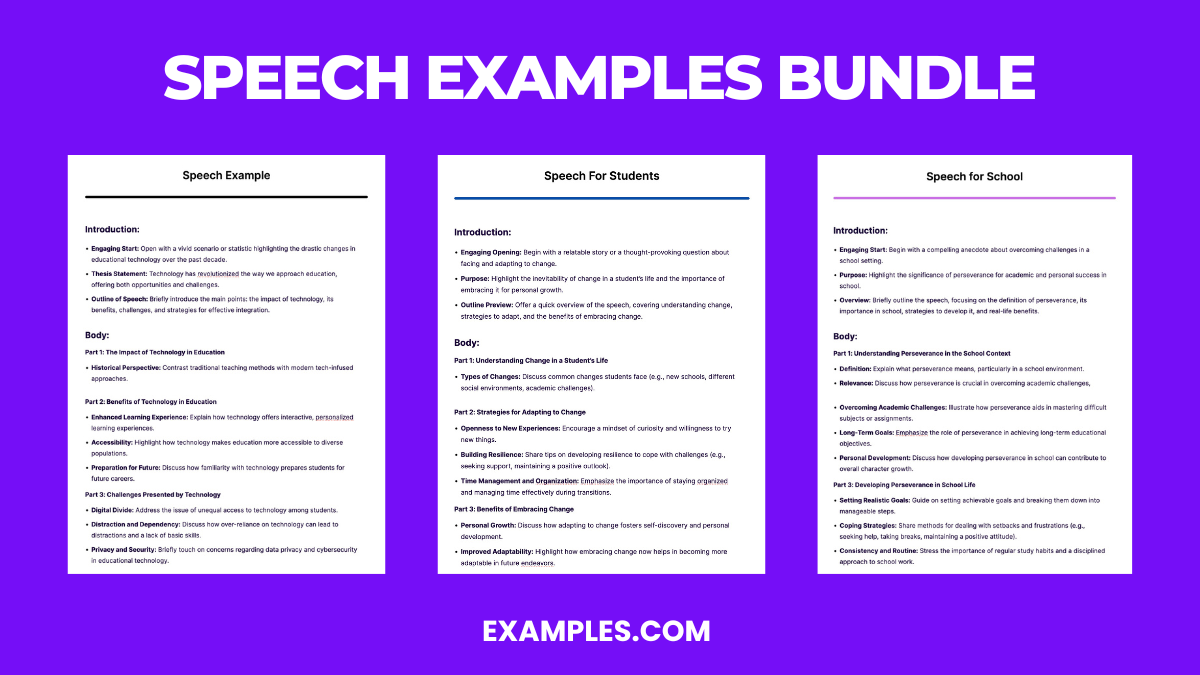
Download Speech Example Bundle
Speech template has been part of our life since we were young. It is the first thing that we learn and taught to us. It is our main form of communication and without it, we could not achieve diplomacy. Without speech, there will be no world peace. Yes, speech has been known to create peace in our time. Remember Martin Luther King? His speech “I Have A Dream” that inspires millions of people. That alone is leadership speech that convinces people to stand up and fight for what is right. A speech no matter, how short can have a huge impact on the one listening.
Speech Example
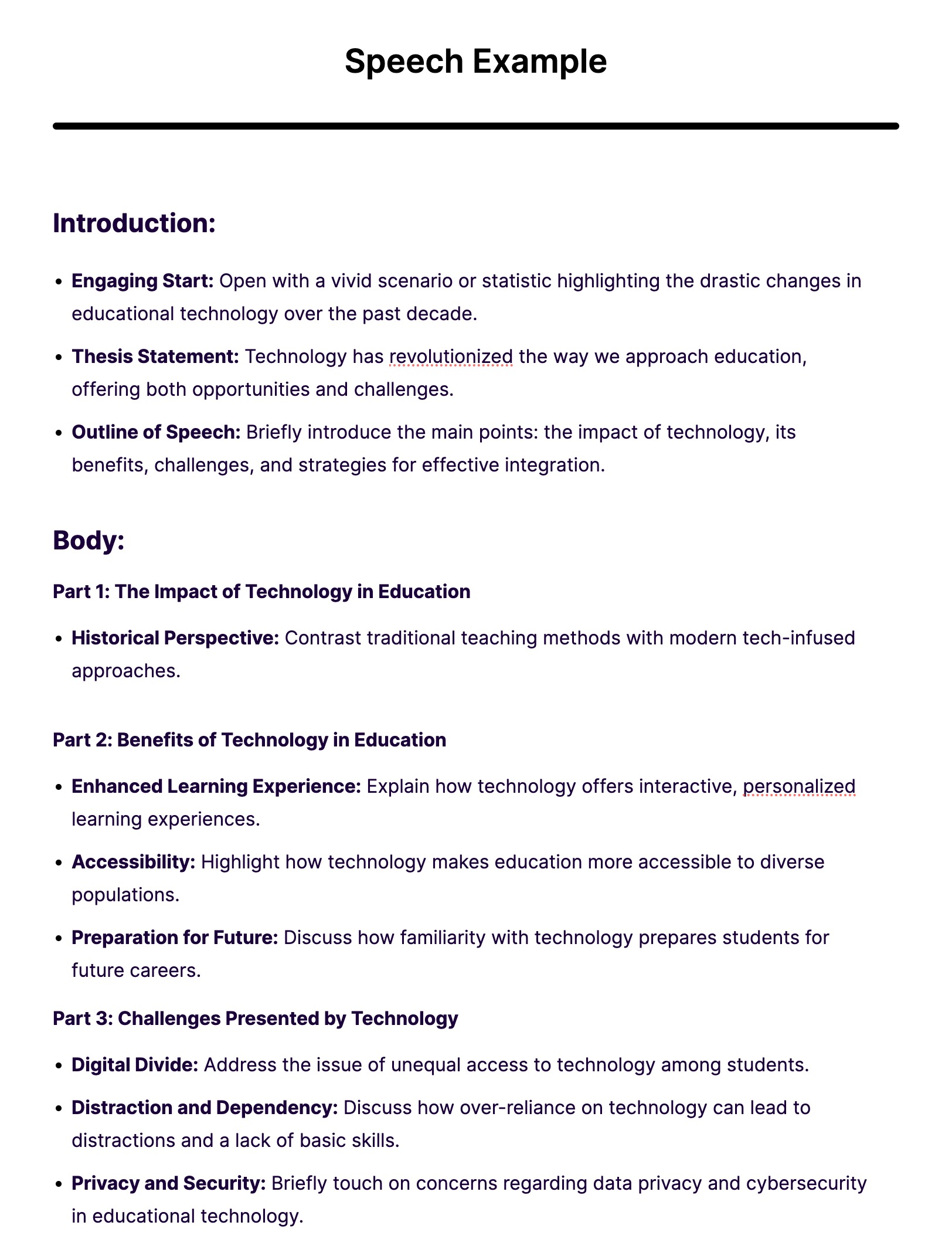
Download in PDF
Speech For Students
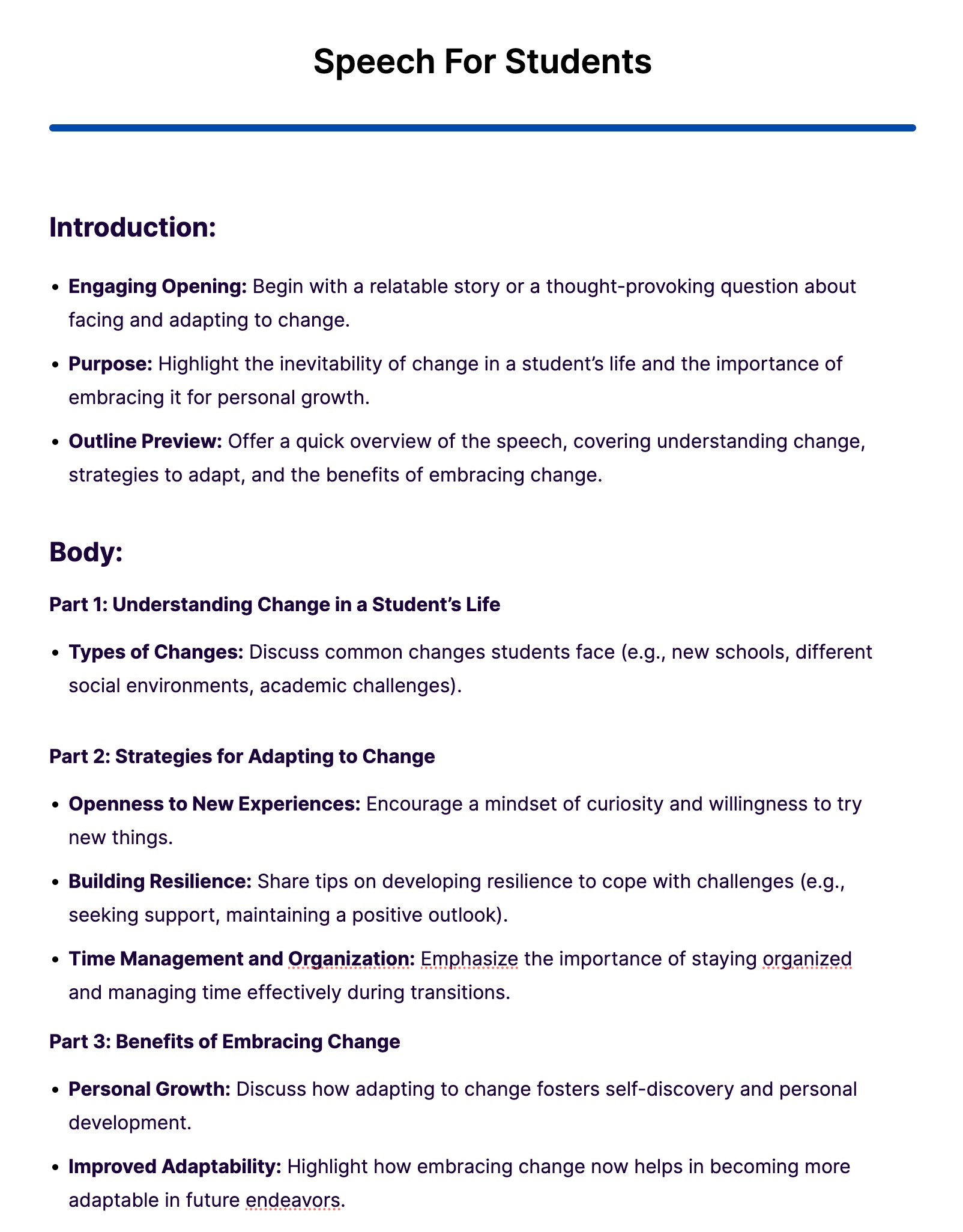
Speech for School
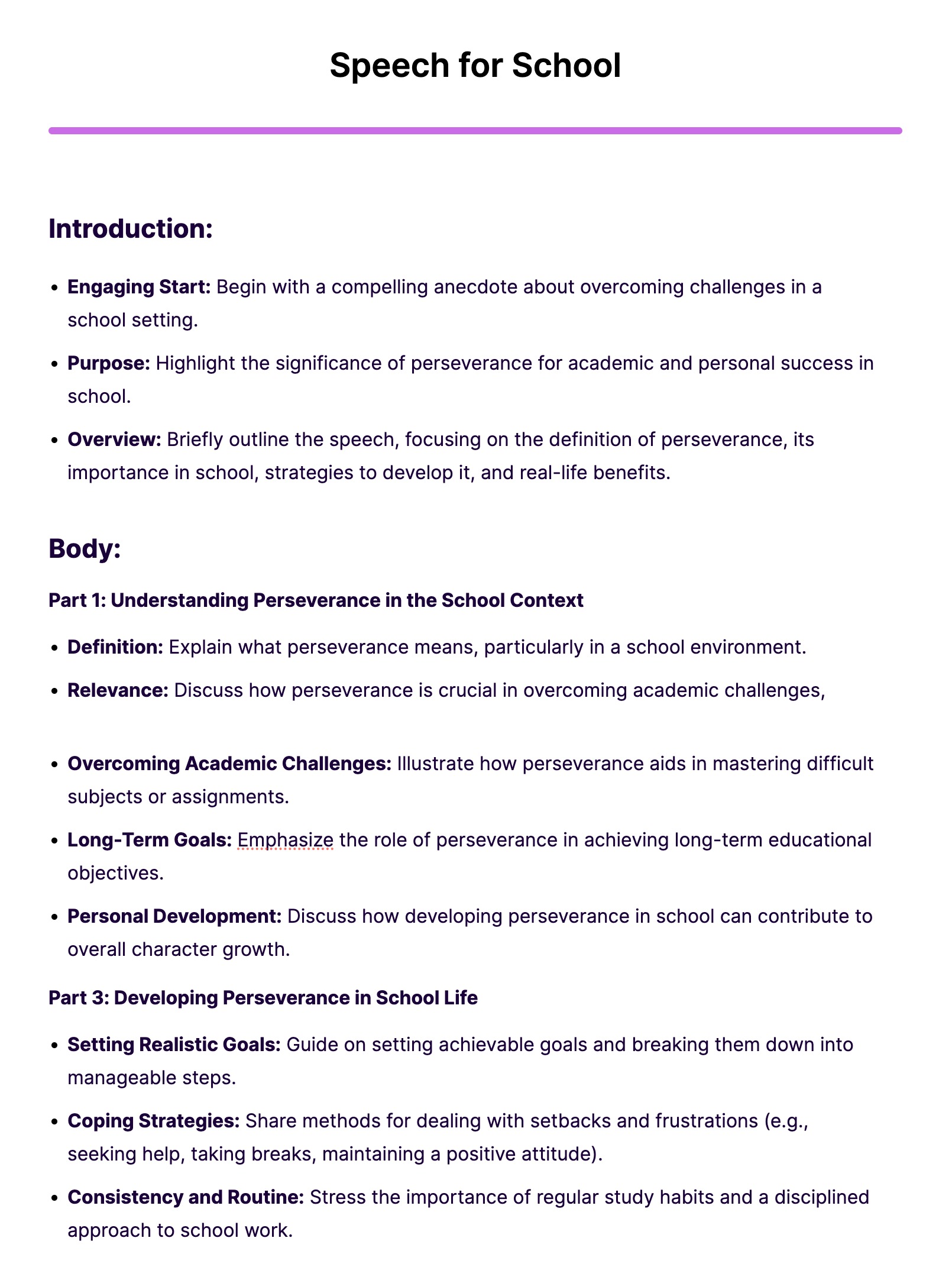
Free Download
College Farewell
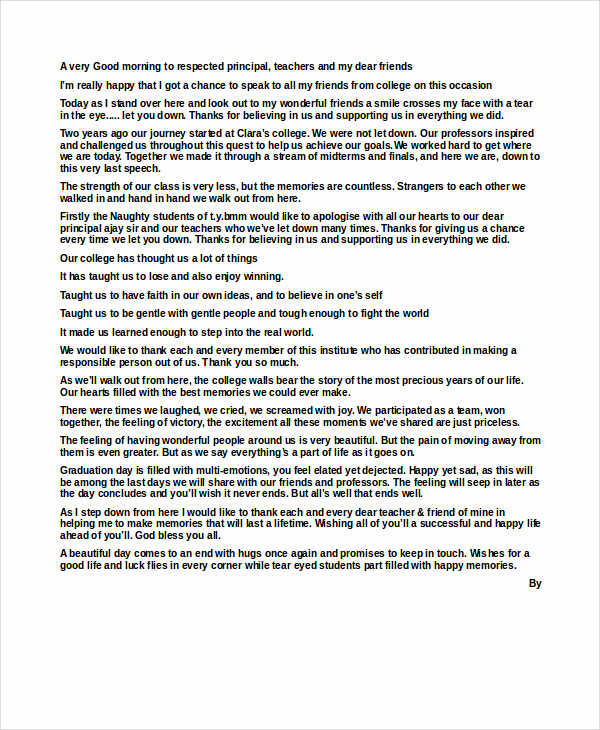
sharminshaikh.blogspot.in
Sample Farewell Speech
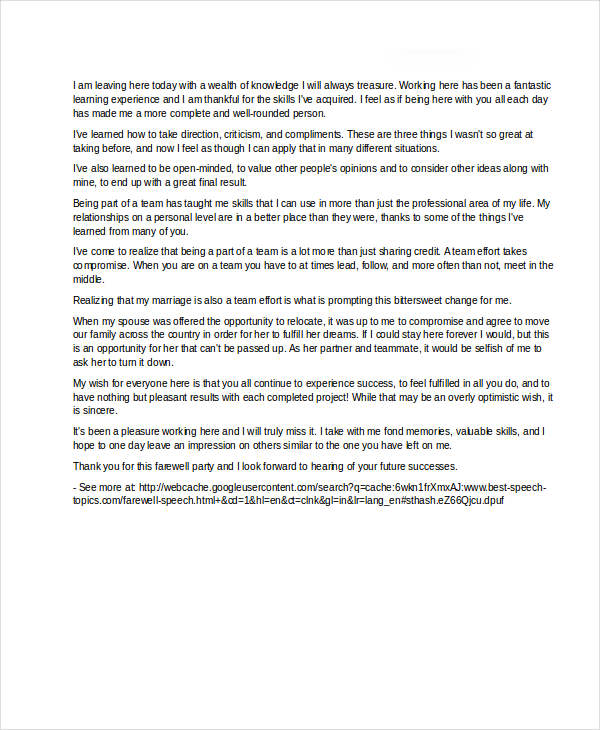
best-speech-topics.com
Informative Speech Outline
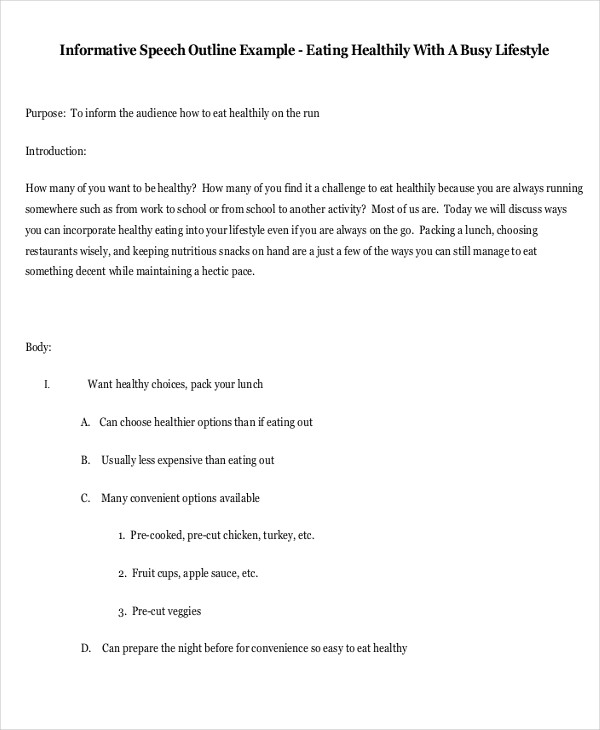
earlham.edu
Size: 44 KB
Expository Speech Outline
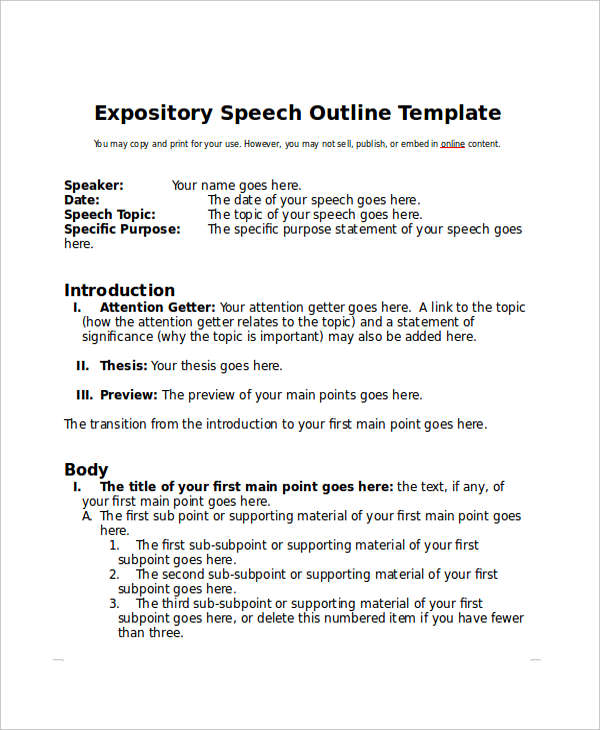
eschool2.bsd7.org
Size: 17 KB
Graduation Speech Example
Student graduation speech.
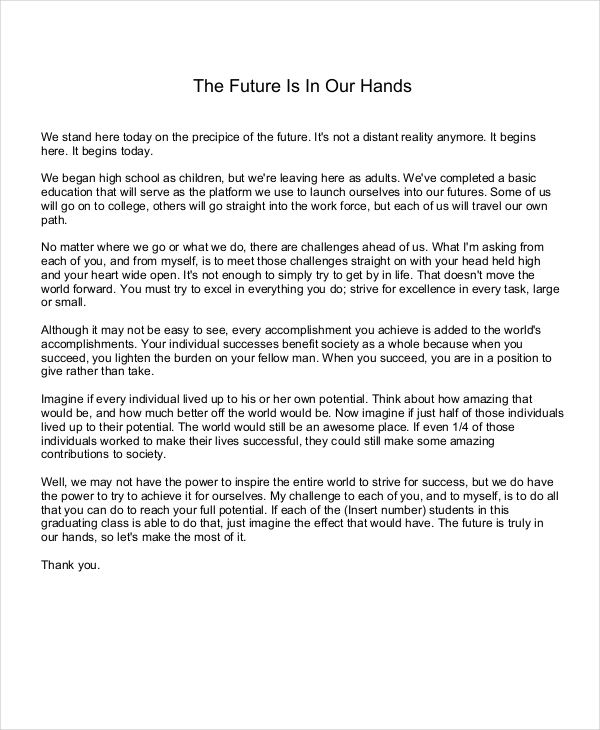
cf.ltkcdn.net
Size: 500 kB
Nursing School Graduation Speech
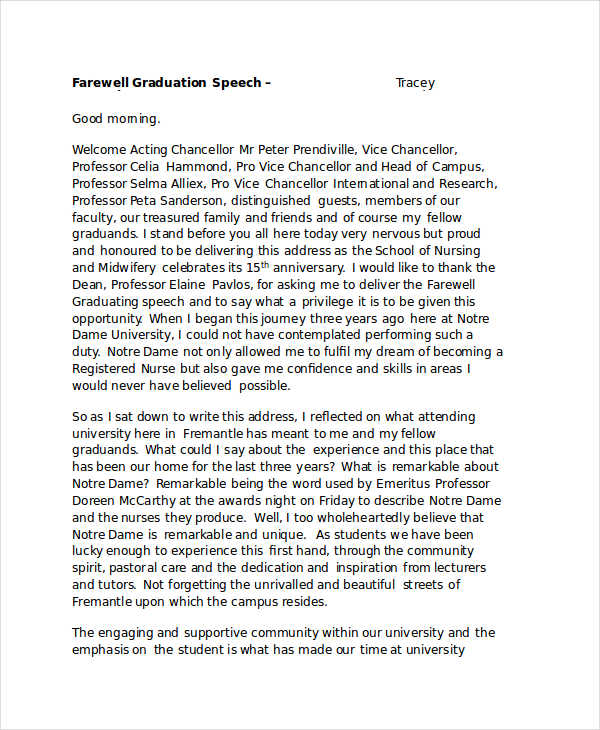
Size: 22 kB
University Graduation Speech
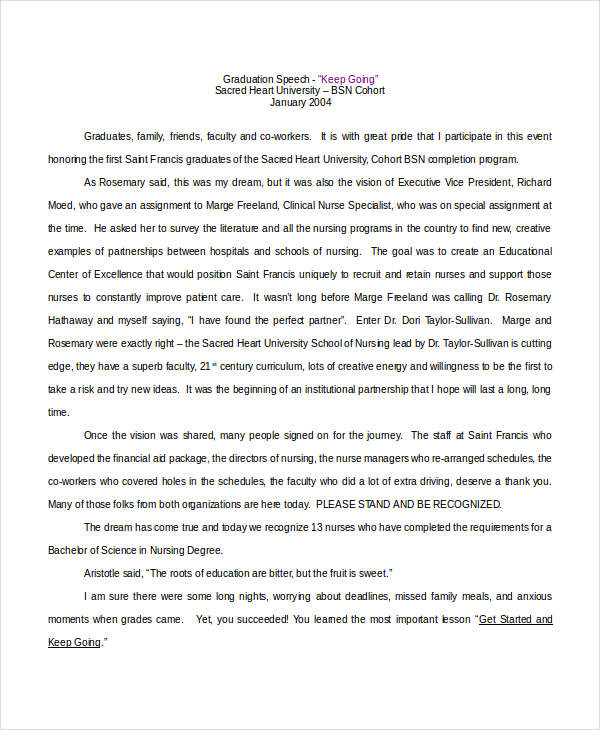
saintfranciscare.com
Graduation Welcome Speech
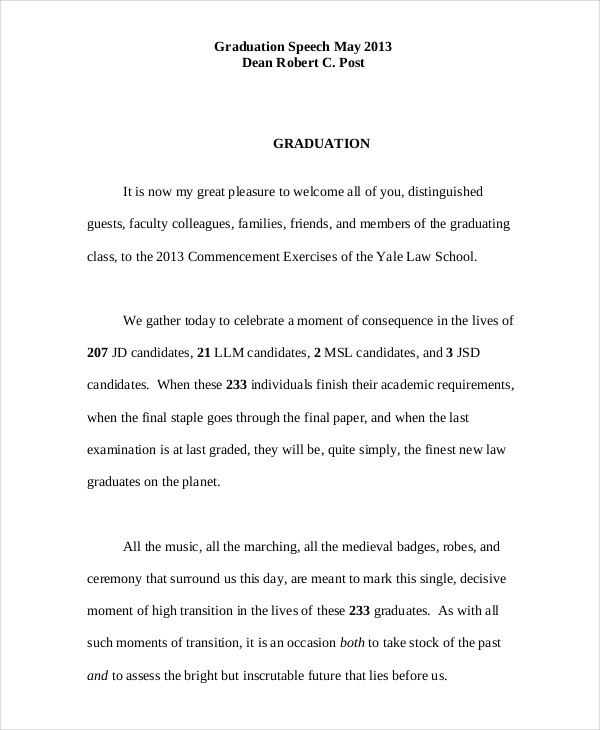
digitalcommons.law.yale.edu
Size: 71 kB
Graduation Party Speech
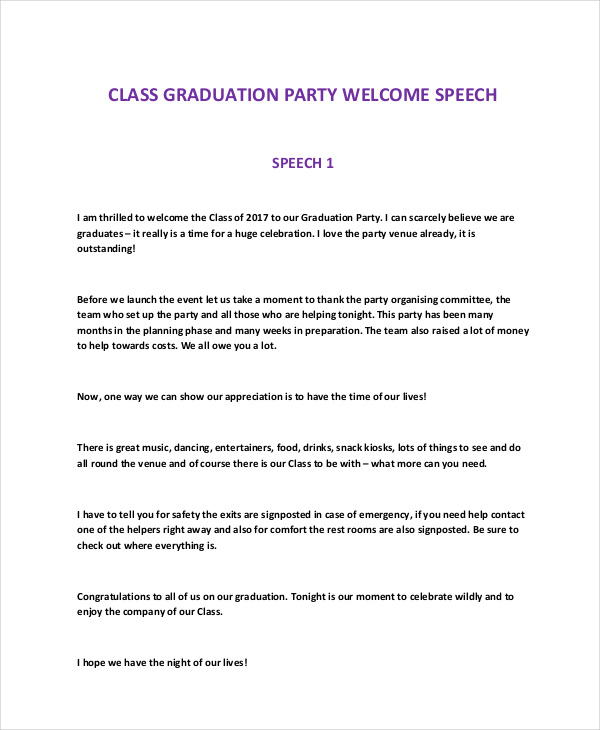
graduation-invitations-graduation-party.com
Size: 139 kB
High School Graduation
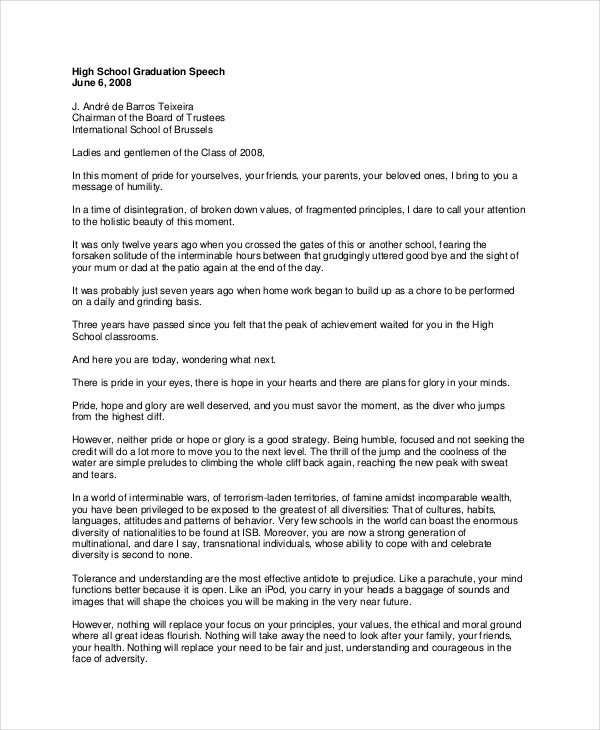
What Is a Speech?
A start a speech, as defined by most website dictionary is a communication or expression of thoughts in spoken words. But most expert orators and speech writer define speech as a formal address given to a large number of people that the purpose of is to persuade, inform, convince, and seek to inspire the people.
However, speech these days, are used to inform people about something or someone. To give them knowledge and information about something that has not been known or is hidden from them. A informative speech is also used to express an emotion and to make a strong stand about one’s belief.
How to Outline a Speech
Speech outline can be a great tool for you to manage your speech and how you will deliver it. Especially if you have trouble in creating and delivering a speech. Here are the steps on creating a speech outline. Basically, a speech outline has 4 essential steps:
Preparation
- This is the part where you decide your topic and your main subjects.
- Determine your audience.
- Identify your purpose.
Introduction
- Create a compelling and attention-getter introduction speech .
- State your main subjects and main points.
- An overview of your whole speech
- Use a transition statement to connect your body to the introduction.
- Discuss your main subject.
- Use supporting details.
- The summary of your speech
- Strong closing statement.
Speech Outline
Persuasive speech.

japanetwork.org
Informative Outline
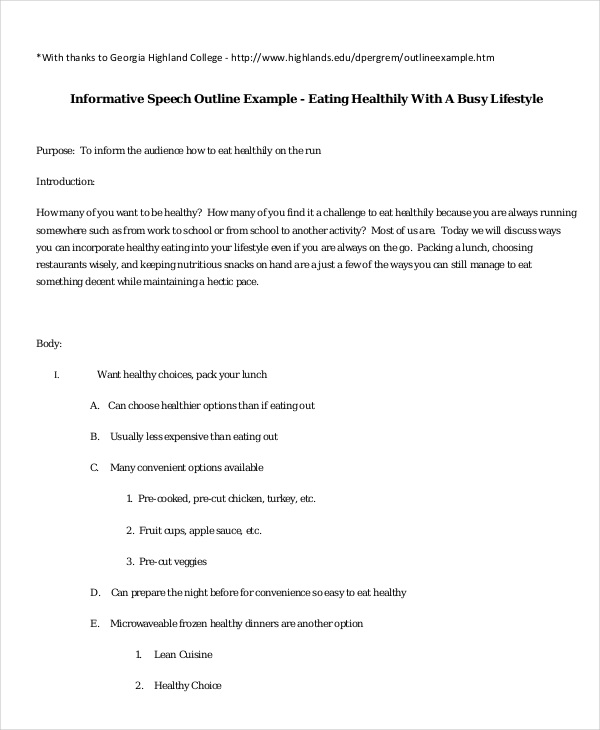
Size: 44 kB
Components of Speech
Effective verbal communication of your ideas and thoughts to others is the general aim for speech classes. Before that, let us take a closer look at the components of writing a speech:
From the moment we first draw breath and announce our arrival into the world, our voice comes into play, a unique amalgamation of our vocal folds and breath to produce sound. This essential aspect of communication, varying distinctly from person to person, is shaped by a myriad of factors including our physiological makeup. It’s particularly pivotal in presentation speech , where the voice becomes more than just a tool for sound; it’s a medium for conveying ideas, emotions, and intentions. In the realm of public speaking or presentation, the voice serves as a powerful instrument, capable of influencing, persuading, and engaging audiences, transforming the mere act of speaking into an art form that resonates and leaves a lasting impact.
2. Articulation
Another component for speech which is equally important is our ability to articulate or control our voice. Meaning how we make the sound of something. Proper articulation also effective leadership speech or oral communications.
Fluency in speech, akin to rhythm in music, is a skill honed through practice. It encompasses the ability to modulate speaking pace, balancing speed with necessary pauses and breaks. This aspect of verbal communication is crucial in special occasion speeches , where the flow and tempo of words significantly impact the effectiveness of the message conveyed. Mastery of fluency transforms speeches into captivating performances, engaging audiences and delivering messages with clarity and impact.
Tips for Giving a Speech
To deliver a powerful and meaningful speech, take note of our hand-picked tips on giving a welcome speech. This is specially made for both newbie and veteran when it comes to giving a speech to the audience.
- Prepare ahead of time . This is important for you to reduce your anxiety and the nerve-wracking feeling.
- Determine your topic . Before giving a speech, you must know and master your topic and the material that comes with it. It is best if you pick a topic that you are interested in or you have a massive background about it.
- Know your audience . When it comes to giving speeches, the best thing to do is to have a little background check of who will be your potential audiences. That way you will know if you could use some s elf-introduction speech .
- Have a quick tour of the room or place where you will give your speech . So that, when the time comes you can maximize your placement on the stage and you will know where to go and face the audience.
- Think like a performer . With the above said that you have to maximize the stage, you also have to walk around, speak to the audience, and use hands gesture to signify your strong emotion about your speech.
- Practice makes (almost) perfect . The keynote speech to every successful speech is practice. Rehearse your speech over and over again to find any mistakes and awkward moments. It is also best to practice your speech in front of your friends or family to give you the feeling of what it is to be in the real situation.
- Be confident . You have to believe in yourself that you can give a successful speech so that the audience will also believe in that too.
Follow those tips and you are good to go. Also, if you want to know more about how you can give an amazing speech, you can browse our speech templates and examples here.
What Is a Speech Template For?
A speech template serves as a guide to simplify speech writing. It does not contain the word-for-word details of the speech outline its basic parts. Common speech examples contain these three essential parts:
- Introduction – It often starts with a quote, a question, or a story.
- Body – This is where the topic’s main points are thoroughly discussed. A written copy of the speech should present important phrases only.
- Conclusion – A summary of what was presented is given. A remark or a call to action serves as thestatement of conclude speech .
How to Start a Speech
To start a speech , you must know the purpose of the speech you are making.
Is it a speech for special occasions? Should it be serious or can it be playful? A special occasion speech has the power to set a mood in a room. For instance, a graduation speech must be encouraging and inspiring. It must be able to garner attention from an audience.
Once you are able to determine the purpose of the speech, it would be easier for you to organize your words into the main parts of the speech.
How to Give a Professional Persuasive Speech
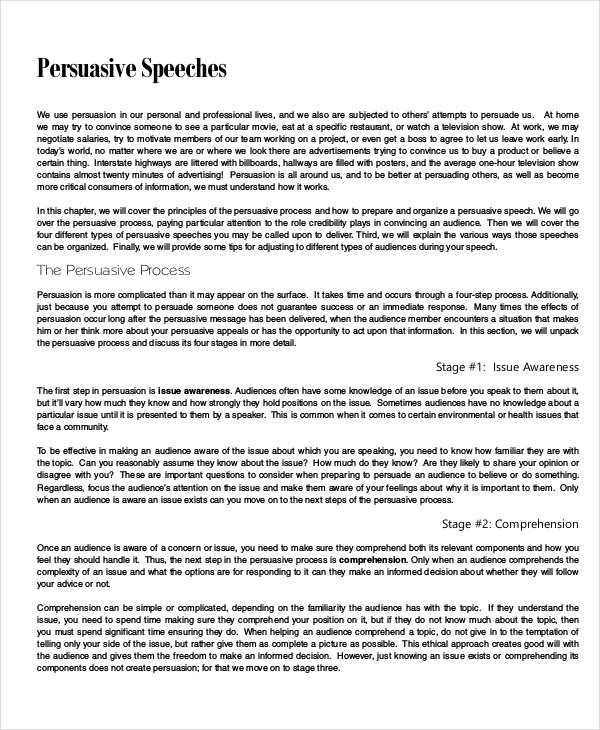
fountainheadpress.com
Size: 84 kB
3 Minute Speech Example
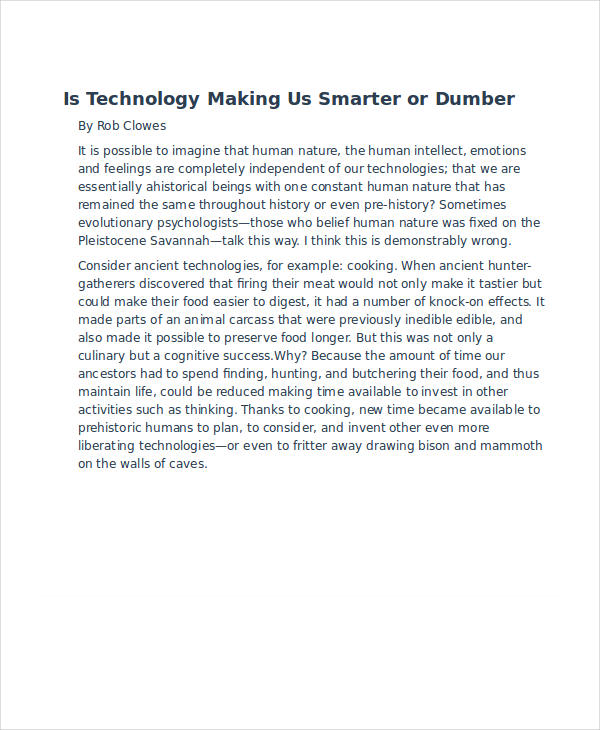
academichelp.net
Tribute Speech Example
Tribute on retirement.
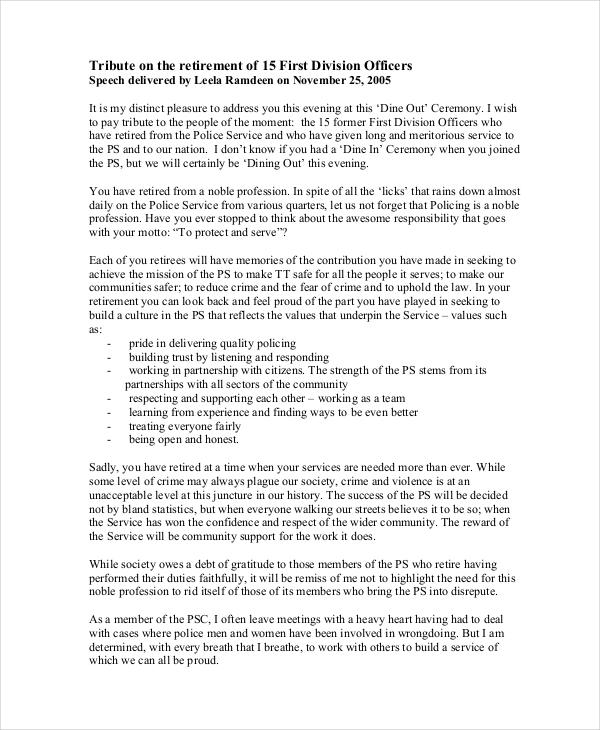
rcsocialjusticett.org
Size: 75 kB
Parent Tribute Speech
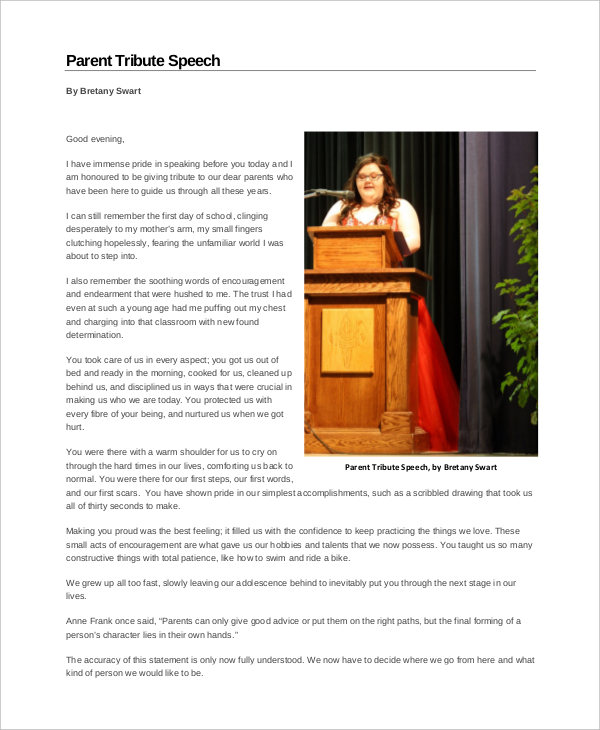
foxinfocus.ca
Size: 260 kB
Types of Speech
Speeches are divided into three types: Informative, persuasive, and impromptu.
- Informative speech. This speech focuses on giving the audience complete (or partial) information about people, events, things, and life. Informative speeches are often used in curricular activities.
- Persuasive speeches. Persuasive speech talks about facts, opinions, the point of views about issues or controversies. The speech must tailor the message to the audience for it to become effective.
- Impromptu speech . This speech is done with little or without preparation. A high speech skill is required when giving this speech.
You can check out our examples speeches here to give you more ideas about the three types of speeches. You can use it in your graduation speech or in your thank-you speech .
Importance of a Good Speech
There are numbers of reason why a good speech is important. There’s a lot actually. I could only name 3 on top of my head.
- It can gain positive perception and opinion from the audience . A good speech does not only make the audience “wow,” it can also give you significant feedbacks from them that you can use in your future development.
- It can express fully your emotion and feelings . You can express what you really want the audience to feel about your speech.
- It can provide complete information . Having said that, a good speech will also make the audience understand and comprehend of the topics you have discussed.
Retirement Speech
Teacher retirement speech.
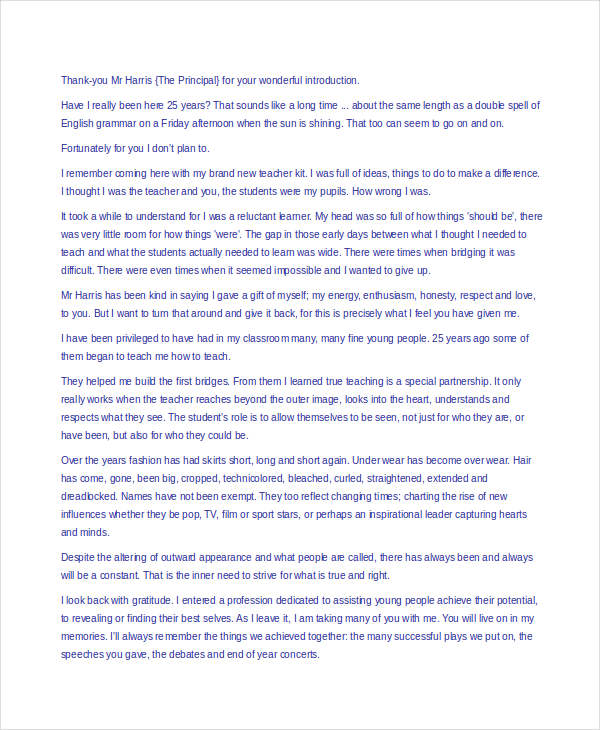
write-out-loud.com
For the Retirement of Administrative Assistant
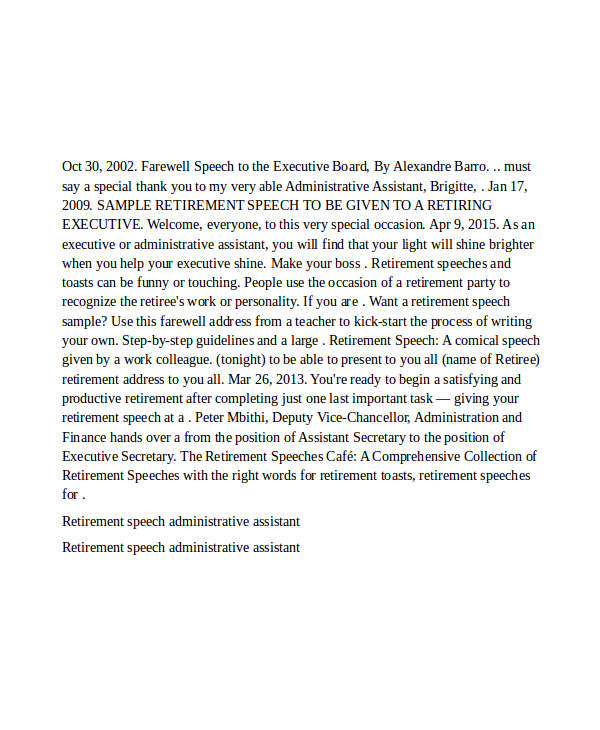
uz.kfty.gdn
Farewell Speech Example
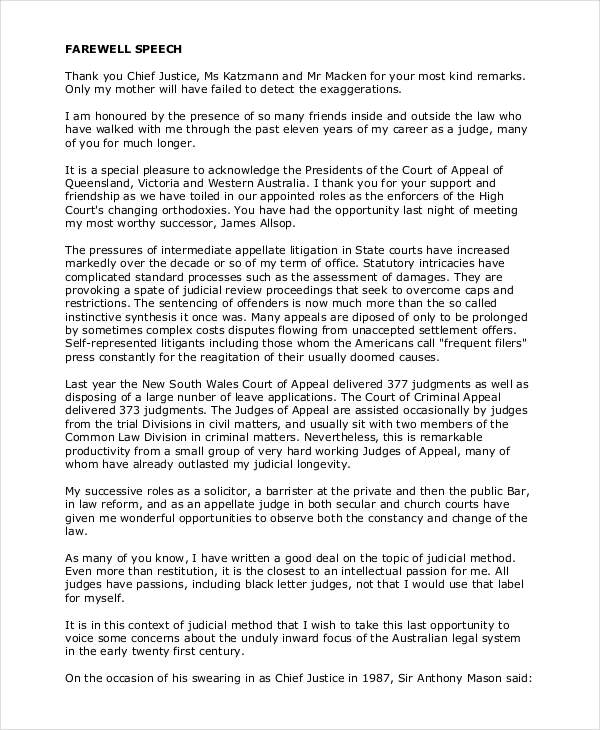
Size: 43 kB
Salutatorian Speech Example
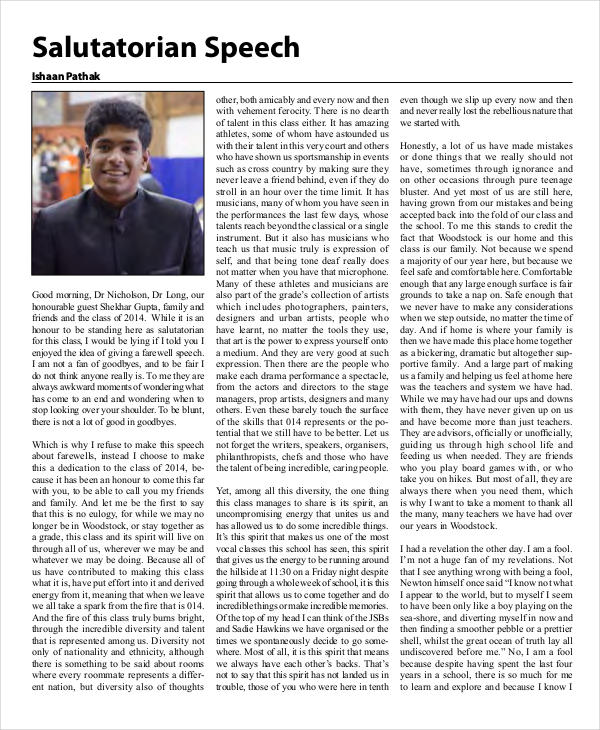
woodstockschool.in
Size: 171 kB
Guidelines for Creating a Speech Outline
As a speaker, you are given the floor to discuss a particular topic over a span of time. Regardless of the type of audience you may face, it’s always best to come prepared. One way is by constructing a speech template as your guide. Here are some guidelines you can take note of when making your s peech template:
- State the purpose of your speech. Whether you wish to inform, to persuade, or to pay tribute to something, determining your purpose will make it easier for you to approach a topic.
- Set a time frame. It’s easy to get carried away while speaking in front of a crowd. Allocating a time limit for the main parts of your speech is a good way to stay on sample schedule .
- Identify the main idea. The main idea will serve as a basis for your thoughts. This will guide you in crafting the main points and the sub points of your speech.
- Include an attention-getter. This is usually found at the start of your speech. It could be a compelling question or a witty story, anything that is sure to grab everyone’s attention from the very start.
- Keep it structured. An effective way is by using roman numerals instead of bullet points. It presents a step by step guide for important details to remember and include in your speech.
- Avoid sequencing your main points in a random order. This is to avoid confusion especially when presenting conflicting statements.
- Observe proper transitions. Transitioning statements and ideas can be challenging. You must be able to gradually transition one point to another.
- Present supporting evidences. If necessary, it’s good to state facts and their sources especially when delivering an informative speech. This is to establish credibility in your speech.
Examples of Introduction Speech
Self introduction sample.
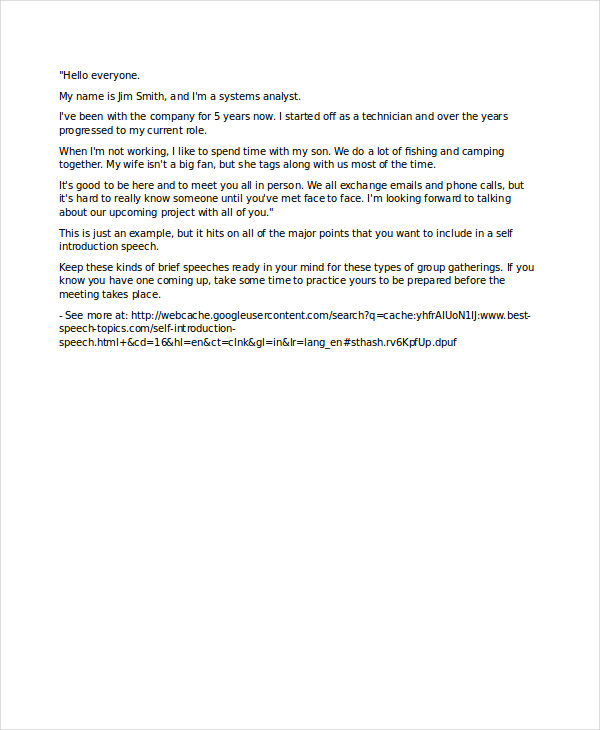
Informative Speech Concept Example
Informative speech for a group.
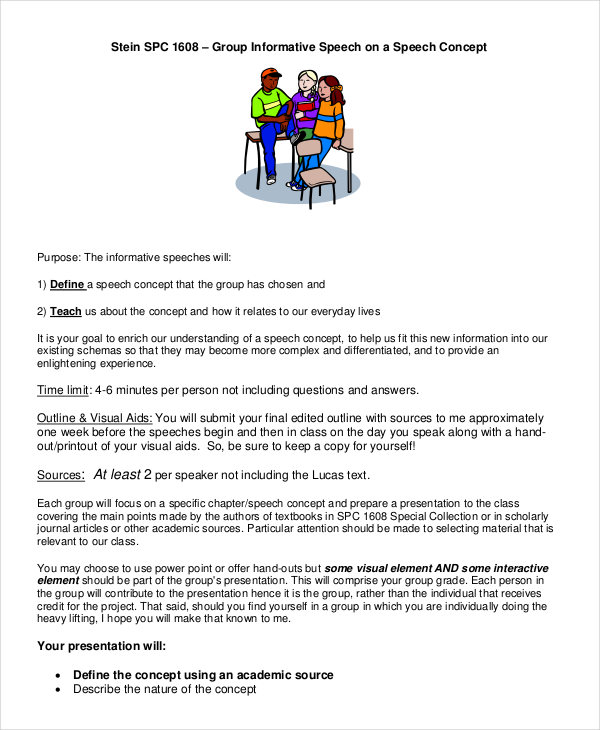
Size: 100 kB
Welcome Speech Example
Wedding welcome.
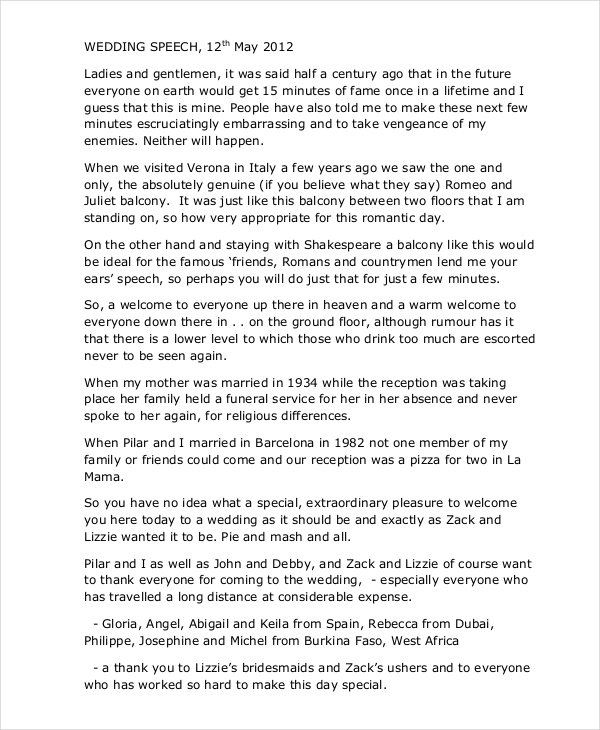
Formal Welcome Speech
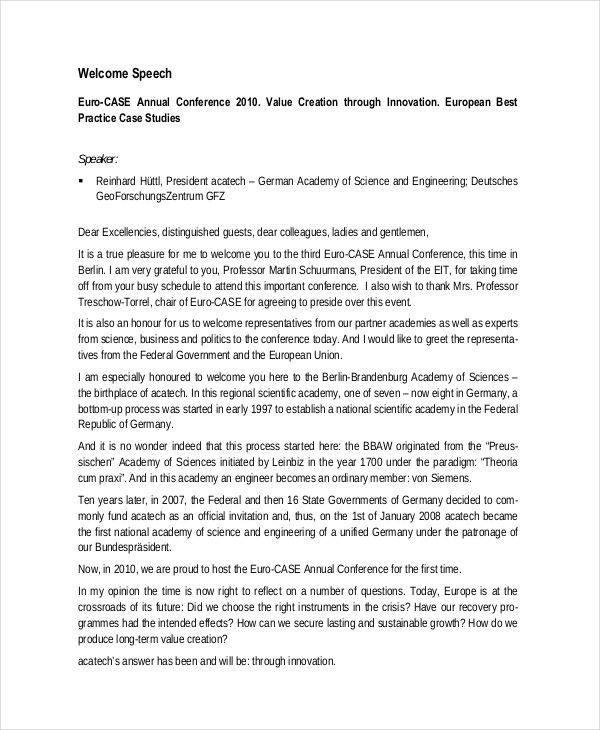
Size: 57 kB
Public Speech Example
Awareness speech.
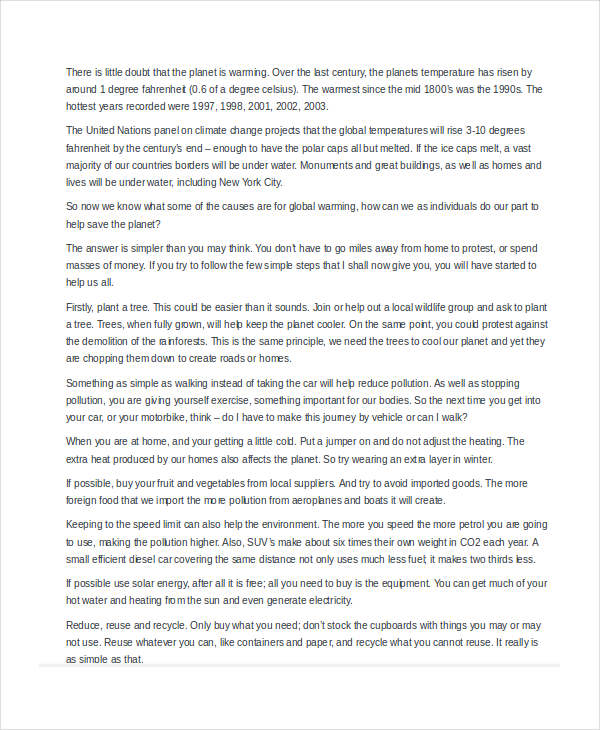
presentationmagazine.com
Purpose of a Speech Template
To deliver a good speech, it’s important to come prepared. For instance, you were asked to prepare a presentation speech about your boss. You don’t know a lot about him, so you need to conduct your research on that matter. Of course, it can also be intimidating to present a significant individual in front of a large audience. A speech template will allow you to keep important notes and details on hand. It also creates structure for your speech and it ensures that your ideas flow smoothly.
Importance of a Speech Template
A motivational speech requires a lot of time and effort to make. A lot of people would prefer to just wing it instead of taking the time to create one. But the truth is, a speech template will save you time when delivering your speech and it will help avoid any problems caused by inadequate preparation.
A speech template will allow you to sequence information effectively. There’s nothing worse than experiencing dead air while delivering your speech just because you blacked out on what you were supposed to say. You can find various keynote speech examples that can serve as your guide for creating your template.
Motivational Speech Example
Motivational sports speech.
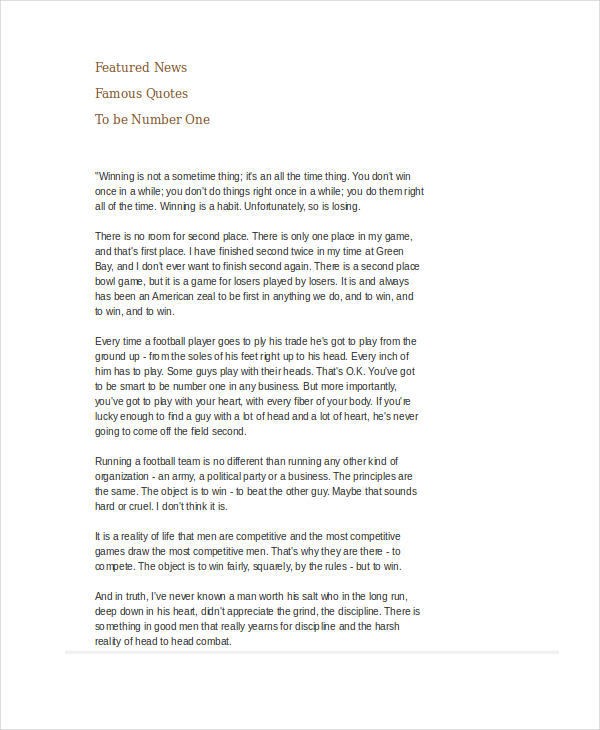
Wedding Speech
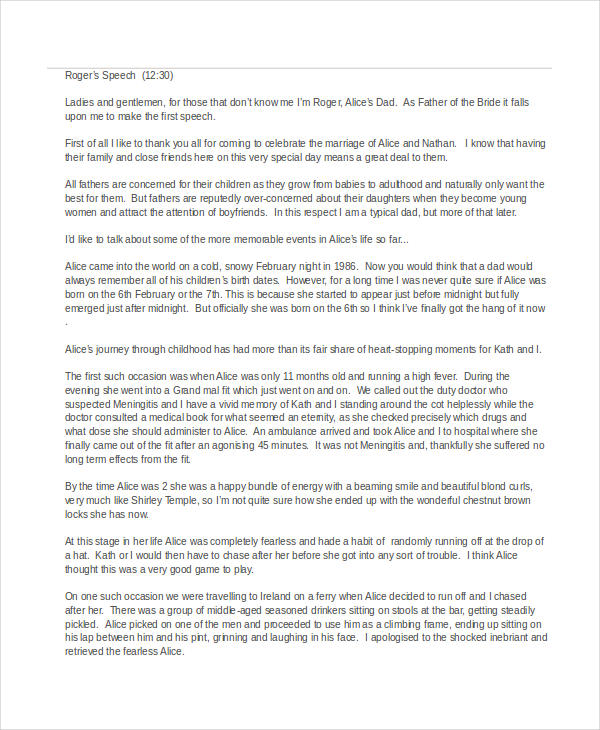
witblitz.net
Groom Wedding Speech
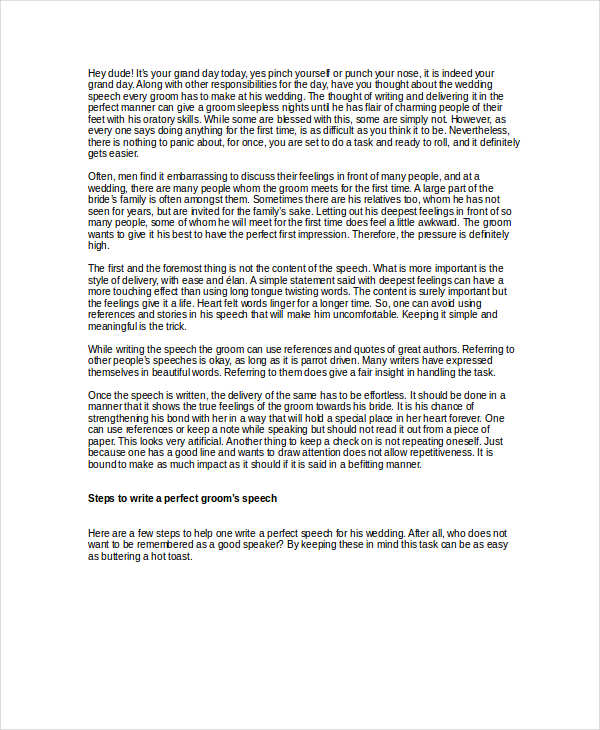
showmesomemoney.com
Size: 239 kB
What is the Purpose of a Speech?
A speech is generally given to satisfy the following points:
1. Informational
Most speeches are about providing more information about a certain topic or subject. These types of speeches are closely related to lectures but are shorter in nature and provide a brief discussion regarding main points of a topic or subject. You may also see speech examples for students .
2. Persuasive
Sales presentations and demonstrations are the type of speeches that aim to entice the audience into taking the desired action after the persuasive speech . Most sales and marketing personnel make use of such speeches with the aim of having the listeners purchase a product or service.
3. Entertainment
Some presentation speeches are made to serve as form of entertainment during functions or events. An example to such are those speeches on weddings or speech intermissions during programs.
4. Inspirational
Inspirational speeches, often delivered during graduations, sermons, and notably in wedding speeches , are crafted to touch the hearts of listeners and motivate them. Their core purpose is to uplift, instill hope, and encourage resilience in facing life’s challenges, whether they seem insurmountable or not. These speeches serve as a beacon of inspiration, guiding individuals to overcome obstacles and find strength in everyday struggles, making them a cherished element of special occasions.
Elevator Speech Examples
Elevator speech for college.
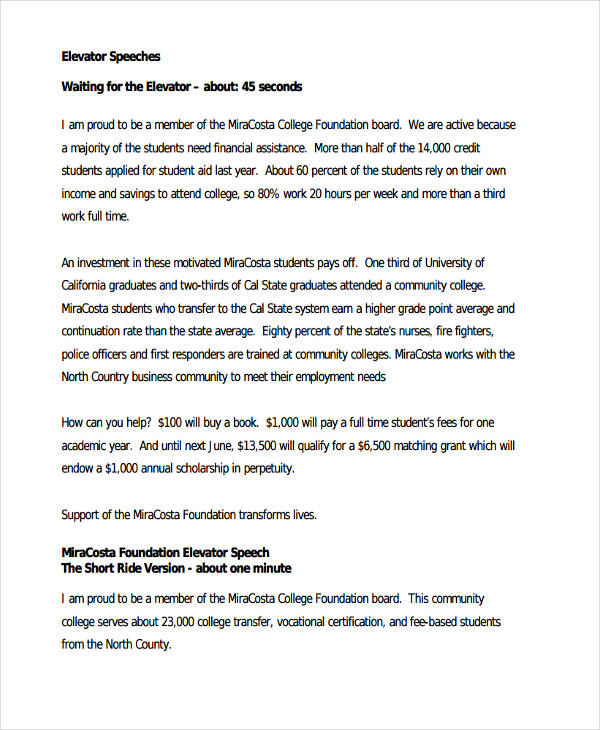
foundation.miracosta.edu
Size: 12 KB
Personal Elevator Speech
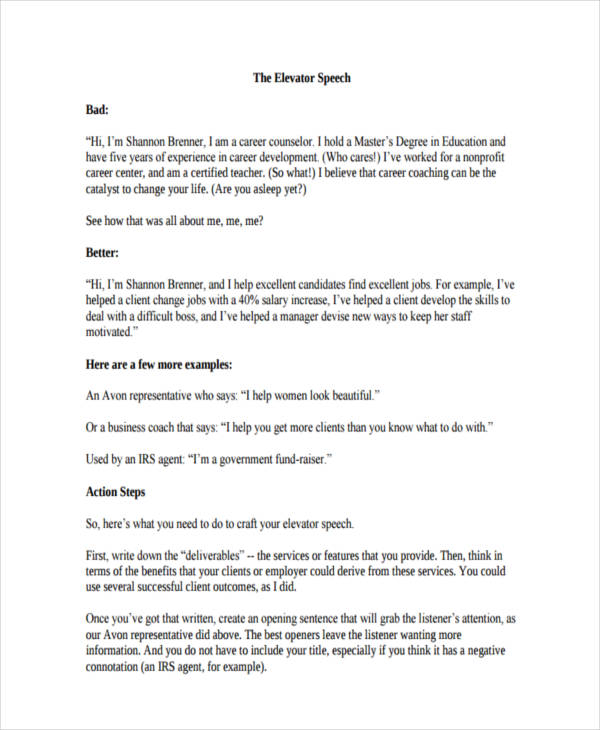
gspia.pitt.edu
Size: 210 KB
Leadership Speech
Leadership skills speech.
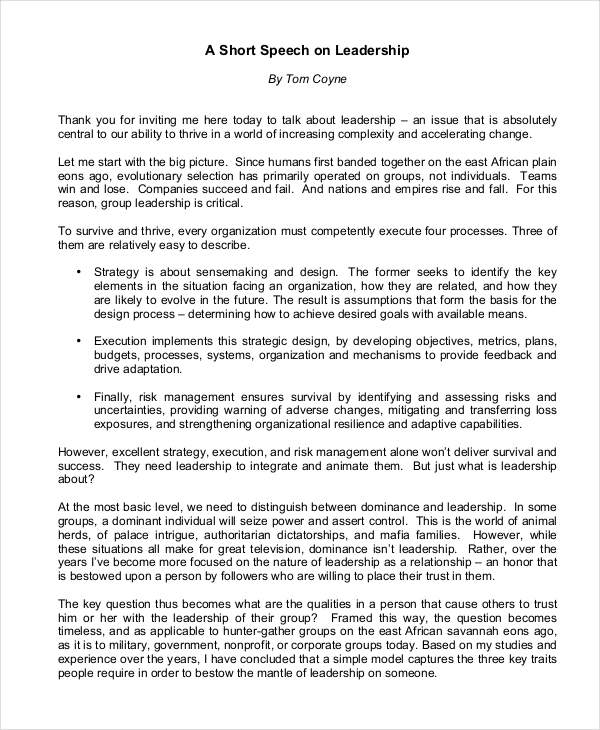
tomcoyne.org
Size: 66 kB
Presentation Speech Example
Award presentation speech.
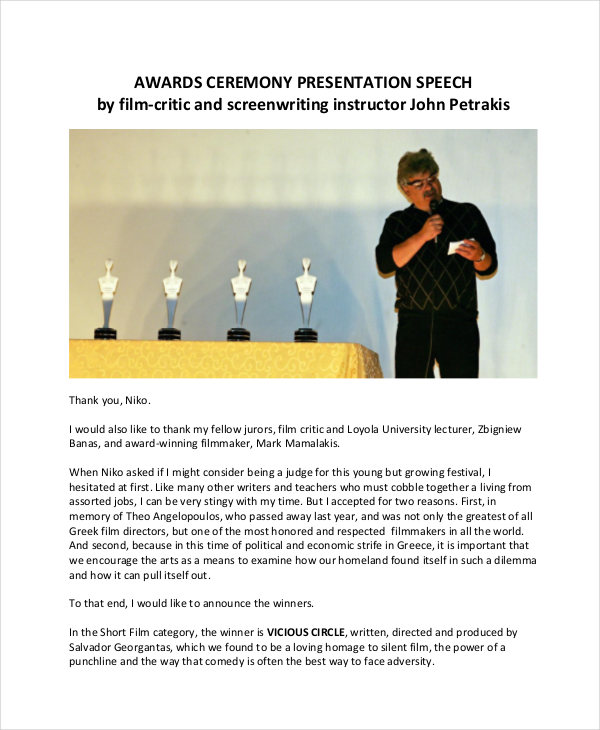
greekfilmfestchicago.org
Size: 287 kB
Thank You Speech
Wedding thank you.
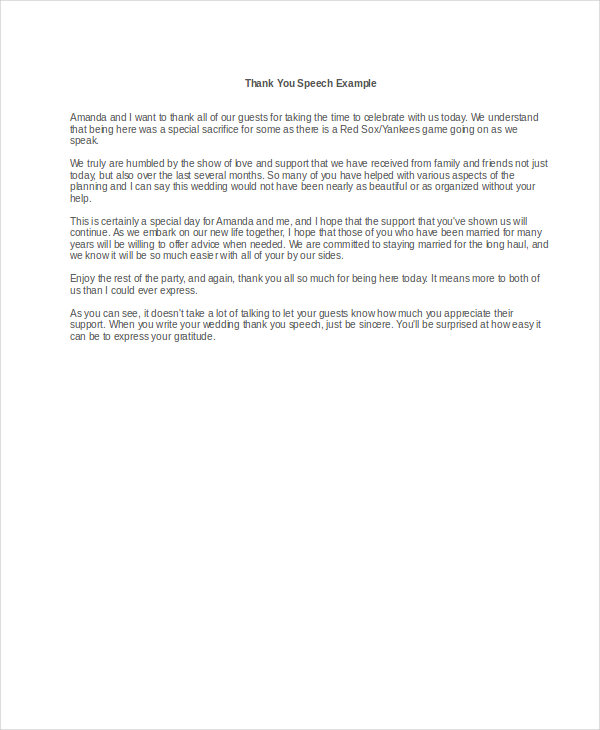
thank-you-notes.com
Formal Thank You Speech Outline
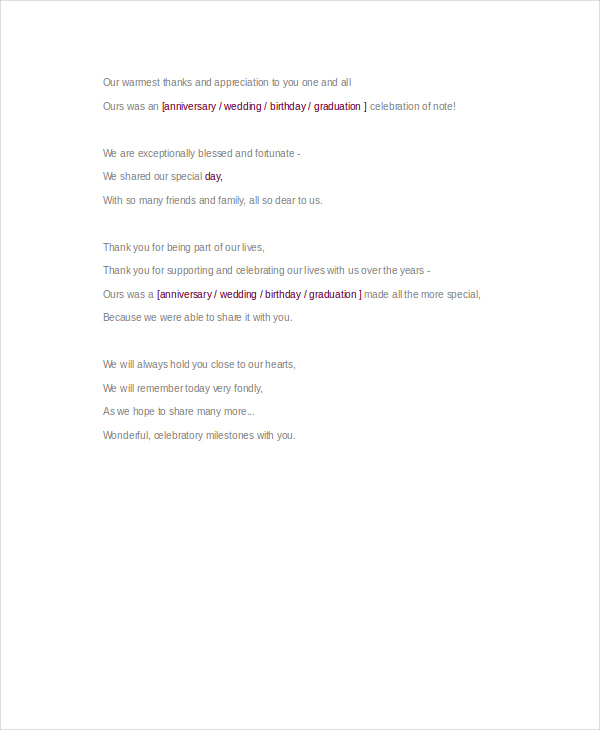
find-the-words.com
Award Thank You
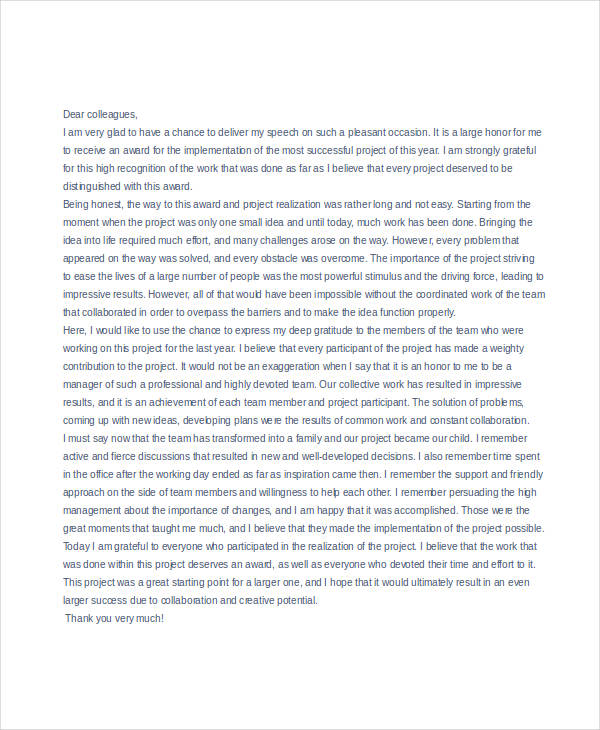
thepensters.com
Benefits of Speech
Constant exposure and practice in making and delivering speeches produces many benefits and gains to an individual such as the following:
1. Self Esteem
Being exposed to public speaking boosts confidence in your self and in your skills. In fact, speech therapy is recommended for people having issues fitting in society or getting along with people.
2. Self Expression
Self introduction speech provide a venue for an individual to express their opinion and ideas about a chosen topic or subject. This also makes others aware of what that individual feels or thinks about the topic or subject.
3. Personal Development
Writing and delivering speeches eventually increases your knowledge of persuasive strategies and in organizing thoughts for a certain topic or subject improving your critical thinking abilities. You may also see farewell speech examples .
4. Personal Evaluation
Being able to speak in public helps an individual gauge his communication skills and get ideas on how to improve them.
5. Network Connections
Through speaking engagements, an individual can vastly improve connections whether for his personal, social, or professional goals. You may also like dedication speech examples .
6. Career Advancement
Delivering speeches gets the attention of management specially if an individual is adept and skillful at doing so. A good speaker is in turn a good motivator and leader.
effective speech-making is a skill that combines thorough preparation, engaging content, and confident delivery. For a deeper understanding of how to structure a speech, including the introduction, body, and conclusion, the Grand Valley State University Speech Lab provides a helpful guide here. This resource can assist in crafting speeches that are coherent, impactful, and memorable.

Speech Generator
Text prompt
- Instructive
- Professional
Write a Speech on the importance of community service.
Create a Speech about the power of positive thinking.

Improve your practice.
Enhance your soft skills with a range of award-winning courses.
Persuasive Speech Outline, with Examples
March 17, 2021 - Gini Beqiri
A persuasive speech is a speech that is given with the intention of convincing the audience to believe or do something. This could be virtually anything – voting, organ donation, recycling, and so on.
A successful persuasive speech effectively convinces the audience to your point of view, providing you come across as trustworthy and knowledgeable about the topic you’re discussing.
So, how do you start convincing a group of strangers to share your opinion? And how do you connect with them enough to earn their trust?
Topics for your persuasive speech
We’ve made a list of persuasive speech topics you could use next time you’re asked to give one. The topics are thought-provoking and things which many people have an opinion on.
When using any of our persuasive speech ideas, make sure you have a solid knowledge about the topic you’re speaking about – and make sure you discuss counter arguments too.
Here are a few ideas to get you started:
- All school children should wear a uniform
- Facebook is making people more socially anxious
- It should be illegal to drive over the age of 80
- Lying isn’t always wrong
- The case for organ donation
Read our full list of 75 persuasive speech topics and ideas .

Preparation: Consider your audience
As with any speech, preparation is crucial. Before you put pen to paper, think about what you want to achieve with your speech. This will help organise your thoughts as you realistically can only cover 2-4 main points before your audience get bored .
It’s also useful to think about who your audience are at this point. If they are unlikely to know much about your topic then you’ll need to factor in context of your topic when planning the structure and length of your speech. You should also consider their:
- Cultural or religious backgrounds
- Shared concerns, attitudes and problems
- Shared interests, beliefs and hopes
- Baseline attitude – are they hostile, neutral, or open to change?
The factors above will all determine the approach you take to writing your speech. For example, if your topic is about childhood obesity, you could begin with a story about your own children or a shared concern every parent has. This would suit an audience who are more likely to be parents than young professionals who have only just left college.
Remember the 3 main approaches to persuade others
There are three main approaches used to persuade others:
The ethos approach appeals to the audience’s ethics and morals, such as what is the ‘right thing’ to do for humanity, saving the environment, etc.
Pathos persuasion is when you appeal to the audience’s emotions, such as when you tell a story that makes them the main character in a difficult situation.
The logos approach to giving a persuasive speech is when you appeal to the audience’s logic – ie. your speech is essentially more driven by facts and logic. The benefit of this technique is that your point of view becomes virtually indisputable because you make the audience feel that only your view is the logical one.
- Ethos, Pathos, Logos: 3 Pillars of Public Speaking and Persuasion
Ideas for your persuasive speech outline
1. structure of your persuasive speech.
The opening and closing of speech are the most important. Consider these carefully when thinking about your persuasive speech outline. A strong opening ensures you have the audience’s attention from the start and gives them a positive first impression of you.
You’ll want to start with a strong opening such as an attention grabbing statement, statistic of fact. These are usually dramatic or shocking, such as:
Sadly, in the next 18 minutes when I do our chat, four Americans that are alive will be dead from the food that they eat – Jamie Oliver
Another good way of starting a persuasive speech is to include your audience in the picture you’re trying to paint. By making them part of the story, you’re embedding an emotional connection between them and your speech.
You could do this in a more toned-down way by talking about something you know that your audience has in common with you. It’s also helpful at this point to include your credentials in a persuasive speech to gain your audience’s trust.
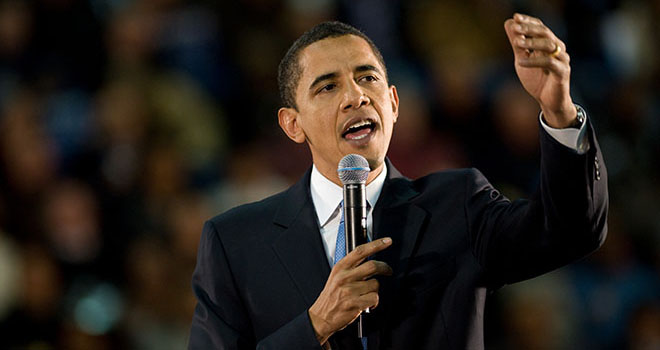
Obama would spend hours with his team working on the opening and closing statements of his speech.
2. Stating your argument
You should pick between 2 and 4 themes to discuss during your speech so that you have enough time to explain your viewpoint and convince your audience to the same way of thinking.
It’s important that each of your points transitions seamlessly into the next one so that your speech has a logical flow. Work on your connecting sentences between each of your themes so that your speech is easy to listen to.
Your argument should be backed up by objective research and not purely your subjective opinion. Use examples, analogies, and stories so that the audience can relate more easily to your topic, and therefore are more likely to be persuaded to your point of view.
3. Addressing counter-arguments
Any balanced theory or thought addresses and disputes counter-arguments made against it. By addressing these, you’ll strengthen your persuasive speech by refuting your audience’s objections and you’ll show that you are knowledgeable to other thoughts on the topic.
When describing an opposing point of view, don’t explain it in a bias way – explain it in the same way someone who holds that view would describe it. That way, you won’t irritate members of your audience who disagree with you and you’ll show that you’ve reached your point of view through reasoned judgement. Simply identify any counter-argument and pose explanations against them.
- Complete Guide to Debating
4. Closing your speech
Your closing line of your speech is your last chance to convince your audience about what you’re saying. It’s also most likely to be the sentence they remember most about your entire speech so make sure it’s a good one!
The most effective persuasive speeches end with a call to action . For example, if you’ve been speaking about organ donation, your call to action might be asking the audience to register as donors.
Practice answering AI questions on your speech and get feedback on your performance .
If audience members ask you questions, make sure you listen carefully and respectfully to the full question. Don’t interject in the middle of a question or become defensive.
You should show that you have carefully considered their viewpoint and refute it in an objective way (if you have opposing opinions). Ensure you remain patient, friendly and polite at all times.
Example 1: Persuasive speech outline
This example is from the Kentucky Community and Technical College.
Specific purpose
To persuade my audience to start walking in order to improve their health.
Central idea
Regular walking can improve both your mental and physical health.
Introduction
Let’s be honest, we lead an easy life: automatic dishwashers, riding lawnmowers, T.V. remote controls, automatic garage door openers, power screwdrivers, bread machines, electric pencil sharpeners, etc., etc. etc. We live in a time-saving, energy-saving, convenient society. It’s a wonderful life. Or is it?
Continue reading
Example 2: Persuasive speech
Tips for delivering your persuasive speech
- Practice, practice, and practice some more . Record yourself speaking and listen for any nervous habits you have such as a nervous laugh, excessive use of filler words, or speaking too quickly.
- Show confident body language . Stand with your legs hip width apart with your shoulders centrally aligned. Ground your feet to the floor and place your hands beside your body so that hand gestures come freely. Your audience won’t be convinced about your argument if you don’t sound confident in it. Find out more about confident body language here .
- Don’t memorise your speech word-for-word or read off a script. If you memorise your persuasive speech, you’ll sound less authentic and panic if you lose your place. Similarly, if you read off a script you won’t sound genuine and you won’t be able to connect with the audience by making eye contact . In turn, you’ll come across as less trustworthy and knowledgeable. You could simply remember your key points instead, or learn your opening and closing sentences.
- Remember to use facial expressions when storytelling – they make you more relatable. By sharing a personal story you’ll more likely be speaking your truth which will help you build a connection with the audience too. Facial expressions help bring your story to life and transport the audience into your situation.
- Keep your speech as concise as possible . When practicing the delivery, see if you can edit it to have the same meaning but in a more succinct way. This will keep the audience engaged.
The best persuasive speech ideas are those that spark a level of controversy. However, a public speech is not the time to express an opinion that is considered outside the norm. If in doubt, play it safe and stick to topics that divide opinions about 50-50.
Bear in mind who your audience are and plan your persuasive speech outline accordingly, with researched evidence to support your argument. It’s important to consider counter-arguments to show that you are knowledgeable about the topic as a whole and not bias towards your own line of thought.
- Get an instant price to have your English document edited by professionals.
English Editing Blog
10 famous speeches in English and what you can learn from them
Speech is an essential element of language, one that we all employ in our daily lives. What about a speech ?
A speech is a formal address, delivered to an audience, that seeks to convince, persuade, inspire or inform. From historic moments to the present day, the English language has given us some extraordinary examples of the spoken word. A powerful tool in the right – or wrong – hands, spoken English can, and has, changed the world.
We’ve chosen ten of the most famous speeches in English. They range from celebrated, world-changing pieces of rhetoric to our personal favourites, but most importantly they still rouse our emotions when we hear them today. We’ve examined each for the tricks of the oratory trade. After each speech you’ll find some bullet points outlining its most distinctive rhetorical features, and why a speech writer would include them.
Remember these celebrated rhetoricians the next time you have to give a speech in public – be this at a wedding, award ceremony or business conference.
Scroll down to the end of this post for our essential tips on crafting speeches.
1. Martin Luther King I Have a Dream 1963
We couldn’t have an article about speeches without mentioning this one. Incredibly famous and iconic, Martin Luther King changed the character of speech making.
I have a dream that one day down in Alabama, with its vicious racists, with its governor having his lips dripping with the words of interposition and nullification – one day right there in Alabama little black boys and black girls will be able to join hands with little white boys and white girls as sisters and brothers. I have a dream today. I have a dream that one day every valley shall be exalted and every hill and mountain shall be made low, the rough places will be made plain, and the crooked places will be made straight, and the glory of the Lord shall be revealed and all flesh shall see it together.
What makes this a great speech?
– Abstract nouns like “ dream ” are incredibly emotional. Our dreams are an intimate part of our subconscious and express our strongest desires. Dreams belong to the realm of fantasy; of unworldly, soaring experiences. King’s repetition of the simple sentence “I have a dream” evokes a picture in our minds of a world where complete equality and freedom exist.
– It fuses simplicity of language with sincerity : something that all persuasive speeches seek to do!
– Use of tenses: King uses the future tense (“will be able”, “shall be”, “will be made””), which gives his a dream certainty and makes it seem immediate and real.
– Thanks to its highly biblical rhetoric , King’s speech reads like a sermon. The last paragraph we’ve quoted here is packed with biblical language and imagery .
2. King George VI Radio Address 1939
This speech was brought back to life recently thanks to the film, The King’s Speech (2010). While George VI will never go down in history as one of the world’s gifted orators, his speech will certainly be remembered.
In this grave hour, perhaps the most fateful in history, I send to every household of my peoples, both at home and overseas, this message, spoken with the same depth of feeling for each one of you as if I were able to cross your threshold and speak to you myself. For the second time in the lives of most of us, we are at war. Over and over again, we have tried to find a peaceful way out of the differences between ourselves and those who are now our enemies, but it has been in vain.
– At only 404 words long, the speech is impressively economical with language. Its short length means that every word is significant, and commands its audiences’ attention.
– This is a great example of how speechwriters use superlatives . George VI says that this moment is “the most fateful in history”. Nothing gets peoples’ attention like saying this is the “most important” or “best”.
– “ We ”, “ us ” and “ I ”: This is an extremely personal speech. George VI is using the first person, “I”, to reach out to each person listening to the speech. He also talks in the third person: “we are at war”, to unite British people against the common enemy: “them”, or Germany.
3. Winston Churchill We shall fight on the beaches 1940
Churchill is an icon of great speech making. All his life Churchill struggled with a stutter that caused him difficulty pronouncing the letter “s”. Nevertheless, with pronunciation and rehearsal he became one of the most famous orators in history.
…we shall defend our Island, whatever the cost may be, we shall fight on the beaches, we shall fight on the landing grounds, we shall fight in the fields and in the streets, we shall fight in the hills; we shall never surrender, and even if, which I do not for a moment believe, this Island or a large part of it were subjugated and starving, then our Empire beyond the seas, armed and guarded by the British Fleet, would carry on the struggle, until, in God’s good time, the New World, with all its power and might, steps forth to the rescue and the liberation of the old.
What makes it a powerful speech?
– Structural repetition of the simple phrase “we shall…”
– Active verbs like “defend” and “fight” are extremely motivational, rousing Churchill’s audience’s spirits.
– Very long sentences build the tension of the speech up to its climax “the rescue and the liberation of the old”, sweeping listeners along. A similar thing happens in musical pieces: the composition weaves a crescendo, which often induces emotion in its audience.
4. Elizabeth I Speech to the Troops 1588
The “Virgin Queen”, Elizabeth I, made this speech at a pivotal moment in English history. It is a remarkable speech in extraordinary circumstances: made by a woman, it deals with issues of gender, sovereignty and nationality.
I am come amongst you, as you see, at this time, not for my recreation and disport, but being resolved, in the midst and heat of the battle, to live and die amongst you all; to lay down for my God, and for my kingdom, and my people, my honour and my blood, even in the dust. I know I have the body but of a weak and feeble woman; but I have the heart and stomach of a king, and of a king of England too, and think foul scorn that Parma or Spain, or any prince of Europe, should dare to invade the borders of my realm; to which rather than any dishonour shall grow by me, I myself will take up arms, I myself will be your general, judge, and rewarder of every one of your virtues in the field.
– Elizabeth puts aside differences in social status and says she will “live and die amongst (her troops)”. This gives her speech a very inclusive message .
– She uses antithesis , or contrasting ideas. To offset the problem of her femininity – of being a “weak and feeble woman” – she swiftly emphasises her masculine qualities: that she has the “heart and stomach of a king”.
– Elizabeth takes on the role of a protector : there is much repetition of the pronoun “I”, and “I myself” to show how active she will be during the battle.
5. Chief Joseph Surrender Speech 1877
We’ve included this speech because there is something extremely raw and humbling about Chief Joseph’s surrender. Combining vulnerability with pride, this is an unusual speech and deserves attention.
Tell General Howard I know his heart. What he told me before, I have it in my heart. I am tired of fighting. Our Chiefs are killed; Looking Glass is dead, Ta Hool Hool Shute is dead. The old men are all dead. It is the young men who say yes or no. He who led on the young men is dead. It is cold, and we have no blankets; the little children are freezing to death. My people, some of them, have run away to the hills, and have no blankets, no food. No one knows where they are – perhaps freezing to death. I want to have time to look for my children, and see how many of them I can find. Maybe I shall find them among the dead. Hear me, my Chiefs! I am tired; my heart is sick and sad. From where the sun now stands I will fight no more forever.
What makes this a good speech?
– This speech is a perfect example of a how a non-native speaker can make the English language their own. Chief Joesph’s rhetoric retains the feels and culture of a Native American Indian speaker, and is all the more moving for this.
– Simple, short sentences.
– Declarative sentences such as “I know his heart” and “It is cold” present a listener with hard facts that are difficult to argue against.
6. Emmeline Pankhurst Freedom or Death 1913
Traditionally silent, women tend to have been left out of rhetoric. All that changed, however, with the advent of feminism. In her struggle for the vote, Pankhurst and her fellow protesters were compelled to find a voice.
You have left it to women in your land, the men of all civilised countries have left it to women, to work out their own salvation. That is the way in which we women of England are doing. Human life for us is sacred, but we say if any life is to be sacrificed it shall be ours; we won’t do it ourselves, but we will put the enemy in the position where they will have to choose between giving us freedom or giving us death.
– Direct acknowledgement of her audience through use of the pronoun you .
– Pankhurst uses stark, irreconcilable contrasts to emphasise the suffragettes’ seriousness. Binary concepts like men/women, salvation/damnation, freedom/imprisonment and life/death play an important role in her speech.
7. John F. Kennedy The Decision to go the Moon 19 61
Great moments require great speeches. The simplicity of Kennedy’s rhetoric preserves a sense of wonder at going beyond human capabilities, at this great event for science and technology.
We choose to go to the moon. We choose to go to the moon in this decade and do the other things, not because they are easy, but because they are hard, because that goal will serve to organize and measure the best of our energies and skills, because that challenge is one that we are willing to accept, one we are unwilling to postpone, and one which we intend to win, and the others, too.
– Simple sentence structures: “We choose to go to the moon” = Subject + Verb + Complement. The grammatical simplicity of the sentence allows an audience to reflect on important concepts, i.e. choice. Repetition emphasises this.
– Kennedy uses demonstrative (or pointing) pronouns e.g. “ this decade”, “ that goal” to create a sense of urgency; to convey how close to success the US is.
8. Shakespeare The Tempest Act 3 Scene 2 c.1610
Of course, any list of great speeches would be incomplete without a mention of the master of rhetoric, the Bard himself. If you caught the London Olympic Opening Ceremony you would have noticed that Kenneth Branagh delivered Caliban’s speech, from The Tempest .
Be not afeard; the isle is full of noises, Sounds and sweet airs, that give delight and hurt not. Sometimes a thousand twangling instruments Will hum about mine ears, and sometime voices That, if I then had waked after long sleep, Will make me sleep again: and then, in dreaming, The clouds methought would open and show riches Ready to drop upon me that, when I waked, I cried to dream again.
– It expresses a wonder and uncertainty of the world, and an inability to comprehend its mystery.
– It is highly alliterative , a rhetorical trick that makes speech memorable and powerful.
– Shakespeare uses onomatopoeia (e.g. “twangling”, “hum”: words whose sound is like they are describing) to make Caliban’s speech evocative.
9. Shakespeare Henry V Act 3 Scene 1, 1598
One of rhetoric’s most primal functions is to transform terrified men into bloodthirsty soldiers. “Once more unto the breach” is a speech that does just that. It is a perfect example of how poetry is an inextricable element of rhetoric.
Once more unto the breach, dear friends, once more; Or close the wall up with our English dead. In peace there’s nothing so becomes a man As modest stillness and humility: But when the blast of war blows in our ears, Then imitate the action of the tiger; Stiffen the sinews, summon up the blood, Disguise fair nature with hard-favour’d rage
What makes this such a great rousing battle speech?
-Shakespeare uses some fantastic imagery in King Henry’s speech. His “dear friends”, or soldiers, are tigers, commanded to block their enemies’ way with their dead comrades. This appeals to ideals of masculinity that men should be fierce and strong.
– Orders and imperative verbs give the speaker authority.
– Repetition of key phrases and units of sound: the vowel sounds in the repeated phrase “once more” are echoed by the words “or” and “our”. This makes it an extraordinarily powerful piece of rhetoric to hear spoken.
10. William Lyon Phelps The Pleasure of Books 1933
This speech was read a year before Nazis began their systematic destruction of books that didn’t match Nazi ideals. As major advocates of books at English Trackers, we’re naturally inclined to love speeches about their importance.
A borrowed book is like a guest in the house; it must be treated with punctiliousness, with a certain considerate formality. You must see that it sustains no damage; it must not suffer while under your roof. You cannot leave it carelessly, you cannot mark it, you cannot turn down the pages, you cannot use it familiarly. And then, some day, although this is seldom done, you really ought to return it.
– Phelps personifies books in this speech; that is, he gives books human characteristics – like the capacity to “suffer”. Comparing a book to a guest creates novelty , which engages and holds the interest of a listener.
– This speech uses both modal verbs (“must”, “ought”) and prohibitions (“you cannot”) to demonstrate both proper and improper behaviour.
Some tips to bear in mind when writing a speech
– KISS : the golden rule of Keep It Short and Simple really does apply. Keep your sentences short, your grammar simple. Not only is this more powerful than long rambling prose, but you’re more likely hold your audience’s attention – and be able to actually remember what you’re trying to say!
– Rule of 3 : another golden rule. The human brain responds magically to things that come in threes. Whether it’s a list of adjectives, a joke, or your main points, it’s most effective if you keep it to this structure.
– Imagery : Metaphors, similes and description will help an audience to understand you, and keep them entertained.
– Pronouns : Use “we” to create a sense of unity, “them” for a common enemy, “you” if you’re reaching out to your audience, and “I” / “me” if you want to take control.
– Poetry : Repetition, rhyme and alliteration are sound effects, used by poets and orators alike. They make a speech much more memorable. Remember to also structure pauses and parentheses into a speech. This will vary the flow of sound, helping you to hold your audience’s attention.
– Jokes : Humour is powerful. Use it to perk up a sleepy audience, as well as a rhetorical tool. Laughter is based on people having common, shared assumptions – and can therefore be used to persuade.
– Key words : “Every”, “improved”, “natural”, “pure”, “tested’ and “recommended” will, according to some surveys, press the right buttons and get a positive response from your listeners.
About the Author: This post comes to you from guest blogger, Natalie. Currently blogging, editing and based in London, Natalie previously worked with the English Trackers team.
Give me more!
Check out our post on Seven Ways to Seriously Improve your English
If you’re applying for a job, read our tips on English Resumes – How to Avoid Five Common Written Mistakes

Persuasive Speech Examples: Taking A Stand In Speech
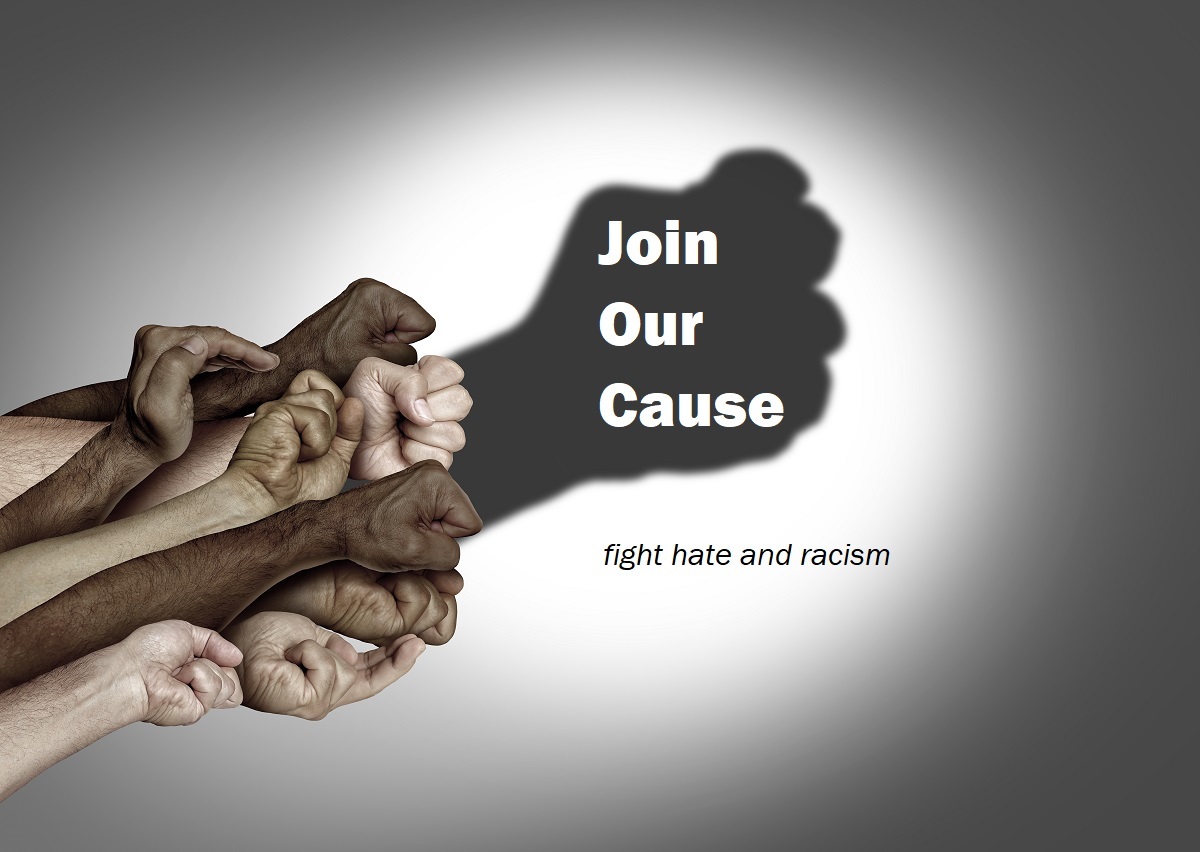
Persuasive speeches have been used throughout history to shape public opinion and shape behavior, and examples abound. Persuasive speech examples include virtually any topic – voting, racism, school uniforms, safety, organ donation, recycling, and so on.
From a teenager asking his parents to go out with friends to an aspiring politician convincing voters to choose him, many people use a persuasive speech to convince their audience members to do something. A successful persuasive speech entails getting someone to take action and be swayed to the speaker’s side.
Table of Contents
What Is A Persuasive Speech?
While an informative speech aims to enlighten the audience about a particular subject, a persuasive speech aims to influence the audience — and convince them to accept a particular point of view.
The central idea is to persuade, whether discussing a persuasive essay or public speaking. This form of communication is a call to action for people to believe in and take action upon something.
Throughout history, persuasive speech ideas and their communicators have played a vital role in driving change, whether on a personal, community, societal, national, or even global level.
We’ve seen leaders and important figures sway public opinions and spark movements. Persuasive speech has been there to raise awareness about a specific issue (e.g., labor rights, gender equality). People have been using such speeches to establish authority, negotiate, and, ultimately, urge the audience to join their side.

What Are Some Examples Of A Persuasive Speech Topic?
There’s a wide range of good persuasive speech topics . To give you an idea, here’s a list of persuasive speech topics:
- Social media is taking a toll on young people’s mental health
- Cell phones and too much screen time are making people lazier
- Violent video games make people more aggressive
- Why authorities must ban fast food for children
- Schools and workplaces should take more action to curb obesity rates
- Why public schools are better than private ones
- College athletes should undergo steroid tests
- There’s more to high school and college students than their GPAs
- Should award-giving bodies rely on the popular vote or the judges’ vote?
- There’s a need to regulate the use of painkillers more heavily
- Cloning must not be legalized
- More government budget should be allocated to health care
- Why businesses must invest in renewable energy
- Should military units be allowed to use drones in warfare?
- How freedom of religion is affecting society
- Libraries are becoming obsolete: A step-by-step guide on keeping them alive
- Should euthanasia be allowed in hospitals, clinical settings, and zoos?
- Developing countries must increase their minimum wage
- Global warming is getting more intense
- The death penalty must be abolished
What Is An Example Of How Start Of A Persuasive Speech?
Persuasion is an art. And when you’re given the chance to make a persuasive speech, one of the first things you must do is to settle down with a thesis statement. Then, you must identify at least two main points, pre-empt counterarguments, and organize your thoughts with a persuasive speech outline.
Remember that your opening (and closing) statements should be strong. Right at the start, you must captivate your audience’s attention. You can give an impactful factual statement or pose a question that challenges conventional views.
The success of a speech doesn’t only end with writing a persuasive one. You must also deliver it with impact. This means maintaining eye contact, keeping your posture open, and using a clear voice and an appropriate facial expression.
What Are The 3 Points To Persuasive Speech?
There are three pillars of a persuasive speech. First is ethos, which taps into the audience’s ethical beliefs. To convince them and establish your credibility, you must resonate with the morals they uphold.
The second one is pathos, which refers to the emotional appeal of your narrative. One approach is to share an anecdote that your audience can relate to. To effectively appeal to your audience’s emotions, you must also use language, tone, diction, and images to paint a better picture of your main point.
On other other hand, logos appeals to logic. This is why it’s important to pepper your speech with facts.
How Are Persuasive Speeches Used?
You may know persuasive speeches as those stirring speeches delivered by politicians and civil rights and business leaders. In reality, you yourself could be using it in everyday life.
There are different types of persuasive speeches. While some mobilize bigger movements, others only persuade a smaller audience or even just one person.
You can use it in a personal context . For example, you’re convincing your parent to extend your curfew or eat at a certain restaurant. In grander ways, you can also use it to advocate for social and political movements. If you’re in business, marketing, or sales, you can use persuasive speech to promote your brand and convince others to buy your product or service.
For example, a teen might try to persuade a parent to let them stay out beyond curfew, while a civil rights leader might use persuasion to encourage listeners to fight racism.
No matter the context of your speech, an effective persuasive speech can compel someone or a group of people to adopt a viewpoint, take a particular action, and change a behavior or belief.

What Are Persuasive Speech Examples?
This AI-created speech about walking shows how a persuasive speech is laid out, using Monroe’s Motivated Sequence (i.e., attention, need, satisfaction, visualization, and call to action) to convey the message that walking can overcome the risks of modern life
The introduction sets up the speech:
“Let’s be honest, we lead an easy life: automatic dishwashers, riding lawnmowers, T.V. remote controls, automatic garage door openers, power screwdrivers, bread machines, electric pencil sharpeners… We live in a time-saving, energy-saving, convenient society. It’s a wonderful life. Or is it?”
Unfortunately, lack of exercise leads to health problems. Walking can overcome the effects of lack of exercise, lethargy, and poor diet. The body of the speech delves into this concept in detail and then concludes with a call to the audience to walk more.
AI pick up the pattern that many living persons have perfected over the year.
Maya Angelou, an American poet and civil rights activist, delivered this compelling poem as a persuasive speech . The performance concludes with this inspiring message about overcoming hardship and discrimination: “Leaving behind nights of terror and fear, I rise/ Into a daybreak that’s wondrously clear, I rise/ Bringing the gifts that my ancestors gave/ I am the dream and the hope of the slave/ I rise, I rise, I rise.”

What Are Some Historical Examples Of Persuasive Speech?
Maya Angelou is just one of the important figures who have delivered powerful speeches etched in history. These individuals have risen and relayed impactful messages, championing advocacies that would resonate with people during their time — and beyond.
Below are more moving examples of a persuasive speech:
The Gettysburg Address by Abraham Lincoln
Context: In November 1863, during the American Civil War, US President Abraham Lincoln delivered this speech in commemoration of the dedication of the Gettysburg National Ceremony (also known as the Soldiers’ National Ceremony).
Snippet: “Now we are engaged in a great civil war, testing whether that nation or any nation so conceived and so dedicated, can long endure. We are met on a great battlefield of that war. We come to dedicate a portion of it as a final resting place for those who died here, that the nation might live. This we may, in all propriety, do.
“ But, in a larger sense, we can not dedicate, we can not consecrate, we can not hallow, this ground, The brave men, living and dead, who struggled here, have hallowed it, far above our poor power to add or detract. The world will little note nor long remember what we say here; while it can never forget what they did here.
“ It is rather for us, the living, we here be dedicated to the great task remaining before us that, from these honored dead, we take increased devotion to that cause for which they here, gave the last full measure of devotion that we here highly resolve these dead shall not have died in vain; that the nation, shall have a new birth of freedom, and that government of the people, by the people, for the people, shall not perish from the earth.”
The Finest Hour by Winston Churchill
Context: In his nearly 40-minute long speech in June 1940, over a month since Winston Churchill became the British Prime Minister, he sparked hope that they could win the impending Battle of Britain during the Second World War.
Snippet: “What General Weygand called the Battle of France is over. I expect that the Battle of Britain is about to begin. Upon this battle depends the survival of Christian civilization. Upon it depends our own British life, and the long continuity of our institutions and our Empire. The whole fury and might of the enemy must very soon be turned on us. Hitler knows that he will have to break us in this Island or lose the war.
If we can stand up to him, all Europe may be free, and the life of the world may move forward into broad, sunlit uplands. But if we fail, then the whole world, including the United States, including all that we have known and cared for, will sink into the abyss of a new Dark Age made more sinister, and perhaps more protracted, by the lights of perverted science. Let us, therefore, brace ourselves to our duties, and so bear ourselves that, if the British Empire and its Commonwealth last for a thousand years, men will still say, ‘This was their finest hour.’”
I Have a Dream by Mary Wollstonecraft
Context: In her 1792 speech, the British writer and women’s rights advocate shared her dream — that a day will come when women will be treated as rational human beings.
Snippet: “These may be termed utopian dreams. – Thanks to that Being who impressed them on my soul, and gave me sufficient strength of mind to dare to exert my own reason, till, becoming dependent only on him for the support of my virtue, I view, with indignation, the mistaken notions that enslave my sex.
“ I love man as my fellow; but his scepter, real or usurped, extends not to me unless the reason of an individual demands my homage; and even then, the submission is to reason and not to man. In fact, the conduct of an accountable being must be regulated by the operations of its own reason; or on what foundation rests the throne of God?”
These snippets of their persuasive speech capture the very essence of this form of communication: to convince the audience through compelling and valid reasoning, evoking their feelings and moral principles, and motivating them to act and join a movement, big or small.
Recent Posts
Active Listening Absorbs The Whole Message, Not Just The Words
Active listening goes beyond hearing the words someone is saying to you and understanding the message they are conveying. Many only hear a small percentage of what is being said as they are...
Counteracting Fear Of Public Speaking With Coaching And Therapy
Nearly 75% of people experience the social phobia of fear of public speaking. The result may be nervousness before speaking or a full-blown panic attack. Practicing public speaking may lessen the...

- 5 Famous Speeches To Help you Learn English
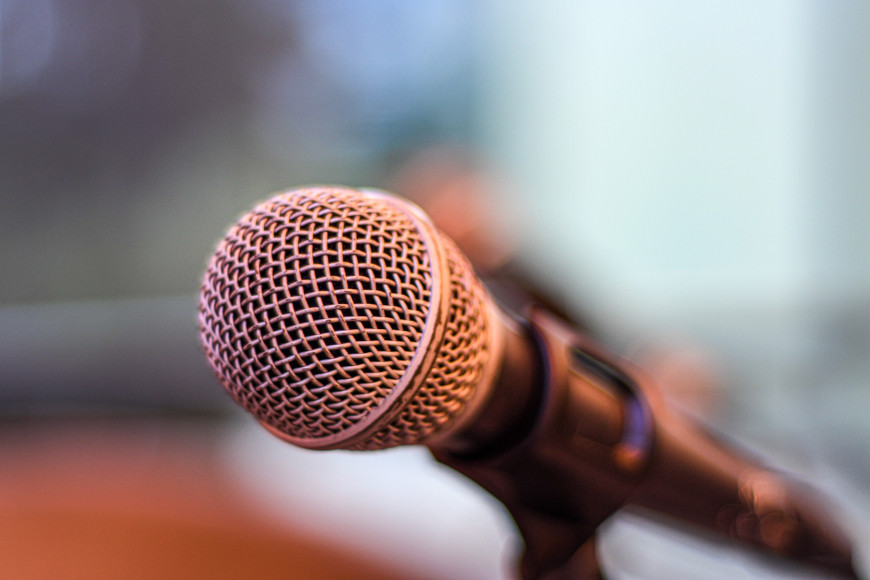
- Posted on 16/06/2021
- Categories: Blog
- Tags: Famous Speeches , Listening , Listening Comprehension , Resources to learn English , Speaking
Everyone likes listening to inspiring speeches. Gifted speakers have a way of making people want to listen and take action to change their lives.
But speeches aren’t just interesting because of their content. They are also great tools to help you improve your English.
Listening to a speech and taking notes can help you develop your comprehension skills. Repeating the words of the speaker allows you to improve your pronunciation. And writing a summary can help you practise your spelling and grammar.
To help you get started, we’ve found 5 famous speeches to help you learn English.
1. Steve Jobs: Stanford Commencement Speech
Steve Jobs was no doubt a great speaker. Millions around the globe were enchanted by the presentations that he gave for Apple as the company’s CEO.
However, he wasn’t just known for speeches related to product launches , like the iconic 2007 speech where he introduced the iPhone . He’s also known for inspirational speeches, like the one he gave in 2005 at a Stanford Commencement ceremony.
In this speech, he addresses the graduating students of Stanford University. He starts by saying that he never actually graduated from college. This makes for an honest and heart-warming speech . For nearly 15 minutes, he talks about his life, telling stories that are funny, relatable, and emotional. He also offers tips for students to apply to their own lives.
Why is it good for learning English?
Jobs uses simple language and speaks in short sentences. He clearly pronounces every word so it’s easy to understand and mimic. Also, this video comes with big subtitles that make the speech even easier to follow.
2. Greta Thunberg: 2019 UN Climate Action Summit Speech
At just 18 years old, Swedish climate activist Greta Thunberg is one of the most well-known speakers of our time. Some of her speeches have even gone viral on social media. And her powerful words have been repeated thousands of times on climate strike placards around the world.
In one of her most moving speeches, Greta Thunberg addresses world leaders at the 2019 UN Climate Action Summit in New York. She challenges them for not taking action to fight global warming and ensure a future for the younger generations.
“How dare you? You have stolen my dreams and my childhood with your empty words,” she says.
Greta’s speech is a lesson in how to express yourself on a variety of environmental issues like climate change. It’s full of lots of useful vocabulary. Plus, the subtitles will help you to understand any complicated language!
3. Will Smith: Speech About Self Discipline
You probably know Will Smith as an actor. He’s played a wide variety of characters – from a police officer in Men in Black to a single father in The Pursuit of Happyness . But did you know that he’s also a great motivational speaker?
A few years ago, a video featuring Will Smith talking about the secret to success went viral on YouTube. In it, he talks about mastering self-discipline as a way to achieve your dreams.
“You cannot win the war against the world if you can’t win the war against your own mind,” he says.
As an actor, Will Smith has a clear and compelling voice, which is easy to follow. Some parts of this talk also sound improvised so it’s great for practising natural speech. It’s also excellent listening practice for understanding an American accent. And there’s lots of slang which you’ll have to guess from the context.
4. Emma Watson: Gender Equality Speech
You may associate Emma Watson’s name with Hermione Granger, the quirky and smart witch from the Harry Potter movies. When she’s not chasing evil wizards, Emma Watson campaigns for real-world issues such as gender equality.
In one of her most famous speeches, which she gave at a special event for the UN’s HeForShe campaign, Emma Watson talks about feminism and fighting for women’s rights. In particular, she explains why neither of these should be confused with ‘man-hating’.
While the actress’s voice is pleasant and calming, the issues she talks about are thought-provoking and will leave you thinking long after this short, 4-minute speech.
This talk is great for helping you get used to a southern English accent. It can also give you some essential vocabulary about a relevant topic. Look out for uses of the passive voice in her speech, and write down those sentences to practise this grammar structure.
5. Benjamin Zander: The Transformative Power of Classical Music
Benjamin Zander is the musical director of the Boston Philharmonic Orchestra. He is also a well-known motivational speaker who loves to share his love for music.
In his 2008 TED talk, he found an engaging way to talk about classical music to people who know nothing about it. As you can see in the video below, he switches between speaking and playing the piano. And, he isn’t afraid to tell a joke or two.
This speech is a bit more of a challenge than the ones described above. Benjamin Zander speaks fast and in a conversational style, using many examples and short stories to tell his tale .
However, the pauses he takes to play the piano give you time to take some notes. Write down any unfamiliar words you heard him say so you can look them up later. If you’re having trouble understanding him, you can always turn on the subtitles.
Glossary for Language Learners
Find the following words in the article and then write down any new ones you didn’t know.
Gifted (adj): talented.
To enchant (v): to captivate.
Launch (n): a product release.
Heart-warming (adj): emotional.
To go viral (v): something spreads quickly on the internet.
Placards (n): cardboard signs.
Moving (adj): emotional.
Compelling (adj): captivating.
Quirky (adj): interesting and different.
Thought-provoking (adj): something interesting that makes you think a lot about the topic.
To switch (v): to change.
Tale (n): story.
To look something up (v): to search for a piece of information in a dictionary or online.
adj = adjective
Leave a Reply
Name (required)
Email (required)
How To Write A B2 First Formal Email/Letter
- By: oxfordadmin
- Posted on 01/06/2021
8 Resources To Help Beginner English Learners
- Posted on 23/06/2021
Related Post


Everything You Need To Know Ab
Although you learn plural nouns early on, they can be challenging. There are many rules and exceptions to remember plus ... Read More

The Importance of English For
No matter where you live, you’ve probably experienced record-breaking temperatures and severe weather. You may have se... Read More

Discovering Barcelona Through
We all know that Barcelona is a fantastic city to live in. You only need to spend the afternoon wandering around one of ... Read More

8 New Words To Improve Your Vo
The arrival of a new year presents an ideal opportunity to work on your language goals. Whether you’re preparing for a... Read More

Learning English through Chris
It’s beginning to look a lot like Christmas! If you resisted the urge to sing that line instead of saying it, then, we... Read More

24 Christmas Phrases for Joyfu
‘Tis the season to be jolly, and what better way to get ready for the festive period than by learning some typical Chr... Read More

3 Easy Ways To Use Music To Im
Are you ready to embark on your latest journey towards mastering the English language? We all know that music is there f... Read More

Grammar Guide – Understandin
Do you sometimes feel a bit lost when deciding which tense to use? Are you a little unsure of the differences between th... Read More

Halloween Humour: Jokes, Puns
We all need a break from time to time. Sometimes we’re up to our eyeballs in projects at work, and we just need a mome... Read More

English for Business: 7 Ways L
If you’re interested in getting a promotion at work, earning a higher salary or landing your dream job, then working o... Read More

A Beginner’s Guide to Ch
Understanding the need for exams An official exam is a fantastic way to demonstrate your English. Why? Firstly,... Read More

English Tongue Twisters to Imp
One of the most fun ways to practise and improve your pronunciation is with tongue twisters. That’s because they’re ... Read More

25 years of Oxford House – O
We all know that fantastic feeling we have after completing an academic year: nine months of English classes, often twic... Read More

Guide to the Cambridge C2 Prof
Are you working towards the Cambridge C2 Proficiency (CPE) exam? Have you been having sleepless nights thinking about wh... Read More

9 Tips For Communicating With
When travelling to or living in an English-speaking country, getting to know the local people can greatly enhance your e... Read More

Are you preparing for the Cambridge C2 Proficiency (CPE) writing exam? If those pre-exam jitters have started to appear,... Read More

English Vocabulary For Getting
Are you feeling bored of the way your hair looks? Perhaps it’s time for a new you. All you need to do is make an appoi... Read More

5 Spelling Rules For Comparati
Messi or Ronaldo? Pizza or sushi? Going to the cinema or bingeing on a series at home? A beach holiday or a walking trip... Read More

Are you preparing for the Cambridge C2 Proficiency (CPE) writing exam? If so, you may be feeling a little nervous and co... Read More

Improve your English pronuncia
What are some of the trickiest words to pronounce in English? Well, we’ve compiled a useful list of ten of the most di... Read More

Using Language Reactor To Lear
If you love watching Netflix series and videos on YouTube to learn English, then you need to download the Language React... Read More

Are you preparing for the Cambridge C2 Proficiency (CPE) exam? Would you like to know some tips to help you feel more at... Read More

How to use ChatGPT to practise
Are you on the lookout for an extra way to practise your English? Do you wish you had an expert available at 2 a.m. that... Read More

Well done. You’ve been moving along your English language journey for some time now. You remember the days of telling ... Read More

Tips for the IELTS listening s
Are you preparing for the IELTS exam and need some help with the listening section? If so, then you’ll know that the l... Read More

7 new English words to improve
A new year is a perfect opportunity to focus on your language goals. Maybe you are working towards an official exam. Per... Read More

How to Write a C1 Advanced Ema
Did you know that there are two parts to the C1 Advanced Writing exam? Part 1 is always a mandatory . Part 2 has ... Read More

5 Interesting Christmas tradit
When you think of the word Christmas, what springs to mind? For most people, it will be words like home, family and trad... Read More

How to write a C1 Advanced Rep
Are you preparing for the Cambridge C1 Advanced exam and need a hand with writing your report/proposal for Part 2 of the... Read More

5 of the best apps to improve
Would you like to improve your English listening skills? With all the technology that we have at our fingertips nowadays... Read More

Tips for the IELTS Reading sec
Looking for some tips to get a high band score in the IELTS Academic Reading exam? If so, then you’re in the right pla... Read More

The 5 best Halloween movies to
Boo! Are you a fan of Halloween? It’s that scary time of year again when the creepy creatures come out to play, and th... Read More

How to Write a Review for Camb
Are you planning to take the Cambridge C1 Advanced (CAE) exam? If so, you will need to complete two pieces of writin... Read More

How To Use Relative Pronouns i
Today we’re taking a look at some English grammar that sometimes trips up language learners. In fact, we’ve just use... Read More

How To Get Top Marks: Cambridg
So you’re taking the ? If so, you’ll know that you have four sections to prepare for: speaking, reading and use of E... Read More

Travel Vocabulary To Get Your
Summer is here and we can’t wait to go on our summer holidays! If you’re thinking about travelling overseas this yea... Read More

How To Get A High Score In The
So you’re preparing for the ! From wanting to live and work abroad to going to university in an English-speaking count... Read More

10 English Idioms To Take To T
Is there anything better than cooling off in the sea on a hot summer’s day? Well, if you live in Barcelona you hav... Read More

Tips for IELTS speaking sectio
Are you preparing for the IELTS test? If so, you’ll need to do the speaking section. While many people find speaking t... Read More

How to use 6 different English
Just when you think English couldn’t get any more confusing, we introduce you to English pronouns! The reason why peop... Read More

How to get top marks: B2 First
Congratulations – you’ve made it to the B2 First Reading and Use of English Part 7! Yet, before we get too excited, ... Read More

5 Of The Best Apps For Improvi
Speaking is often thought to be the hardest skill to master when learning English. What’s more, there are hundreds of ... Read More

Do you like putting together puzzles? If so, your problem solving skills can actually help you with B2 First Reading and... Read More

8 Vocabulary Mistakes Spanish
If you ask a Spanish speaker what they find difficult about English language learning, they may mention false friends an... Read More

How To Get Top Marks: B2 First
Picture this: You’re in your B2 First exam and you’ve finished the Use of English part. You can put it behind you fo... Read More

12 Business Phrasal Verbs to K
Want to improve your English for professional reasons? You’re in the right place. When working in English, it’s comm... Read More

How to use articles (a, an, th
Knowing what articles are and when to use them in English can be difficult for language learners to pick up. Especially ... Read More

Are you preparing for ? Reading and Use of English Part 4 may not be your cup of tea – in fact most students feel quit... Read More

Passing B2 First Part 3: Readi
Are you studying for the B2 First exam? You’re in the right place! In this series of blogs we want to show you al... Read More

8 new English words you need f
New words spring up each year! They often come from popular culture, social and political issues, and innovations in tec... Read More

7 of the Best Apps for Learnin
If you find yourself commuting often and spending a lot of time on the bus, you’ll most likely turn towards playing ga... Read More

The B2 First is one of the most popular English exams for students of English. It is a recognised qualification that can... Read More

4 Different Types Of Modal Ver
What are modal verbs? They are not quite the same as regular verbs such as play, walk and swim. Modal verbs are a type o... Read More

So you’ve decided to take the ! Formerly known as FCE or the First Certificate, this is by far most popular exam. Whe... Read More

Useful Expressions For Negotia
A lot of our global business is conducted in English. So, there’s a strong chance you may have to learn how to negotia... Read More

Passing C1 Advanced Part 8: Re
If you’re wondering how to do Part 8 of the Reading and Use of English paper, you’re in the right place! After s... Read More

The Difference Between IELTS G
You’ve probably heard of . It’s the world’s leading test for study, work and migration after all. And as the world... Read More

Passing C1 Advanced Part 7: Re
Welcome to Part 7 of the Reading and Use of English paper. This task is a bit like a jigsaw puzzle. One where you have ... Read More

The Benefits Of Learning Engli
Who said learning English was just for the young? You're never too old to learn something new. There are plenty of benef... Read More

So, you’re preparing to take the . You’ve been studying for each of the four sections; reading, writing, speaking an... Read More

6 Reels Accounts to Learn Engl
Are you looking for ways to learn English during the summer holidays? We’ve got you covered – Instagram Reels is a n... Read More

Passing Cambridge C1 Advanced
Well done you! You’ve made it to Part 6 of the Reading and Use of English exam. Not long to go now – just three mor... Read More

8 Resources To Help Beginner E
Learning a new language is hard, but fun. If you are learning English but need some help, our monthly course is what y... Read More

How To Write A B2 First Formal
Dear reader… We sincerely hope you enjoyed our previous blog posts about the Writing section of the B2 First. As promi... Read More

4 Conditionals In English And
Conditionals? Is that something you use after shampooing your hair? Not quite. You may have heard your English teacher t... Read More

After racing through the first four parts of the Cambridge English Reading and Use of English paper, you’ve managed t... Read More

7 Of The Best Apps For Learnin
There are roughly 170,000 words in use in the English language. Thankfully, most native English speakers only have a voc... Read More

How to write a B2 First inform
You're probably very familiar with sending emails (and sometimes letters) in your first language. But how about in Engli... Read More

How can I teach my kids Englis
Keep kids’ minds sharp over the Easter holidays with some entertaining, educational activities in English. There are l... Read More

How Roxana went from Beginner
Roxana Milanes is twenty five and from Cuba. She began English classes back in May 2019 at Oxford House, and since then ... Read More

4 Future Tenses In English And
“Your future is whatever you make it, so make it a good one.” - Doc Brown, Back to the future. Just like the and... Read More

10 Business Idioms For The Wor
Business idioms are used throughout the workplace. In meetings, conversations and even whilst making at the coffee mac... Read More

5 Tips For Reading The News In
We spend hours consuming the news. With one click of a button we have access to thousands of news stories all on our pho... Read More

How To Write a Report: Cambrid
Imagine the scene. It’s exam day. You’re nearly at the end of your . You’ve just finished writing Part 1 - , and n... Read More

8 English Words You Need For 2
Back in December 2019, we sat down and attempted to make a list of . No one could have predicted the year that was about... Read More

5 Christmas Movies On Netflix
Christmas movies are one of the best things about the holiday season. They’re fun, they get you in the mood for the ho... Read More

MigraCode: An Inspiring New Pa
Oxford House are extremely proud to announce our partnership with MigraCode - a Barcelona-based charity which trains ref... Read More

The Ultimate Guide To Video Co
The age of telecommunication is well and truly here. Most of our business meetings now take place via video conferencing... Read More

6 Pronunciation Mistakes Spani
One of the biggest challenges for Spanish speakers when learning English is pronunciation. Often it’s a struggle to pr... Read More

6 Ways You Can Learn English w
“Alexa, what exactly are you?” Alexa is a virtual AI assistant owned by Amazon. She is voice-activated - like Sir... Read More

Passing Cambridge C1 Advanced:
Okay, take a deep breath. We’re about to enter the danger zone of the Cambridge exam - Reading and Use of English Par... Read More

What’s new at Oxford House f
Welcome to the new school year! It’s great to have you back. We’d like to remind you that , and classes are all st... Read More

European Languages Day: Where
The 26th of September is . It’s a day to celebrate Europe’s rich linguistic diversity and show the importance of lan... Read More

Back To School: 9 Tips For Lan
It’s the start of a new academic term and new courses are about to begin. This is the perfect opportunity to set your ... Read More

How to Maximise Your Online Co
If there’s one good thing to come out of this year, it’s that learning a language has never been so easy or accessib... Read More

How To Learn English With TikT
Are you bored of Facebook? Tired of Instagram? Don’t feel part of the Twitter generation? Perhaps what you’re lookin... Read More

A Brief Guide To Different Bri
It’s a fact! The UK is obsessed with the way people talk. And with , it’s no surprise why. That’s right, accents a... Read More

Study English This Summer At O
Summer is here! And more than ever, we’re in need of a bit of sunshine. But with travel restrictions still in place, m... Read More

5 Reasons To Learn English Out
As Barcelona and the rest of Spain enters the ‘new normality’, it’s time to plan ahead for the summer. Kids and te... Read More

5 Free Online Resources For Ca
Are you preparing for a Cambridge English qualification? Have you devoured all of your past papers and need some extra e... Read More

6 Different Uses Of The Word �
The word ‘get’ is one of the most common and versatile verbs in English. It can be used in lots of different ways, a... Read More

What Are The 4 Present Tenses
There are three main verb tenses in English - , the present and the future - which each have various forms and uses. Tod... Read More

5 Of The Best Netflix Series T
On average, Netflix subscribers spend streaming their favourite content. With so many binge-worthy series out there, it... Read More

Continue Studying Online At Ox
Due to the ongoing emergency lockdown measures imposed by the Spanish Government . We don’t know when we will be a... Read More

Five Ways To celebrate Sant Jo
The feast of Sant Jordi is one of Barcelona’s most popular and enduring celebrations. Sant Jordi is the patron saint o... Read More

What’s It Like To Study Onli
Educational institutions all over the world have shut their doors. From nurseries to universities, business schools to l... Read More

6 Benefits of Learning English
Whatever your new year’s resolution was this year, it probably didn’t involve staying at home all day. For many of u... Read More

9 Tips For Studying A Language
With the recent outbreak of Covid-19, many of us may have to gather our books and study from home. Schools are clos... Read More

10 Ways To Learn English At Ho
Being stuck inside can make you feel like you’re going crazy. But why not use this time to your advantage, and work on... Read More

Important Information –
Dear students, Due to the recent emergency measures from the Government concerning COVID-19, Oxford House premises wi... Read More

7 Books You Should Read To Imp
Reading is one of the best ways to practice English. It’s fun, relaxing and helps you improve your comprehension skill... Read More

Your Guide To Moving To The US
So that’s it! It’s decided, you’re moving to the USA. It’s time to hike the soaring mountains, listen to country... Read More

How to write a C1 Advanced Ess
The is an excellent qualification to aim for if you’re thinking of studying or working abroad. It’s recognised by u... Read More

Small Talk For Business Englis
Like it or not, small talk is an important part of business. Whether it’s in a lift, at a conference, in a meeting roo... Read More

English Vocabulary For Going O
It’s time for that famous celebration of love and romance - Valentine’s Day! It is inspired by the sad story of Sain... Read More

IELTS: Writing Part 2 –
When it comes to exams, preparation is the key to success - and the IELTS Writing Paper Part 2 is no exception! It is wo... Read More

5 Unmissable Events at Oxford
At Oxford House, we know learning a language extends beyond the classroom. It’s important to practise your skills in m... Read More

Am I ready for the C1 Advanced
Congratulations! You’ve passed your Cambridge B2 First exam. It was a hard road but you did it. Now what’s next? Som... Read More

Ireland is known as the Emerald Isle. When you see its lush green landscape and breathtaking views, it’s easy to see w... Read More

How SMART Goals Can Help You I
New year, new you. As one year ends and another begins, many of us like to set ourselves goals in order to make our live... Read More

15 New English Words You Need
Each year new words enter the English language. Some are added to dictionaries like . Others are old words that are give... Read More

Our Year In Review: Top 10 Blo
2019 went by in a flash - and what a year it’s been! We’re just as excited to be looking back on the past 12 months ... Read More

Telephone Interviews In Englis
Telephone interviews in English can seem scary. Employers often use them to filter-out candidates before the face-to-fa... Read More

How to Write a Great Article i
Writing in your only language can be a challenge, but writing in another language can be a complete nightmare ! Where do... Read More

A Black Friday Guide to Shoppi
Black Friday is the day after Thanksgiving. Traditionally, it signals the start of the Christmas shopping period. Expect... Read More

Passing C1 Advanced: Part 3 Re
The (CAE) is a high-level qualification, designed to show that candidates are confident and flexible language users who... Read More

AI Translators: The Future Of
Many people believe that artificial intelligence (AI) translators are surpassing human translators in their ability to a... Read More

8 Of The Best Apps For Learnin
Apps are a great tool for learning English. They are quick, easy to access and fun. It’s almost like having a mini cla... Read More

6 Ways To Improve Your Speakin
There are four linguistic skills that you utilise when learning a new language: reading, writing speaking and listening.... Read More

Passing Cambridge C2 Proficien
So, you’ve moved onto Part 3, and after completing Part 2 it’s probably a welcome relief to be given some help with ... Read More

8 Resources To Build Your Busi
Whether it’s in meetings, telephone conversations or networking events, you’ll find specific vocabulary and buzzword... Read More

5 Ways to Become a Better Lear
It’s time for some back-to-school motivation. The new school year is about to start and everyone is feeling refreshed ... Read More

Our 10 Favourite YouTubers To
Haven’t you heard? Nobody is watching the TV anymore - 2019 is the year of the YouTuber! If you’re an English langu... Read More

So, you’ve completed the of your Cambridge C1 Advanced (CAE). Now it’s time to sit back and enjoy the rest of the e... Read More

The Secret French Words Hidden
“The problem with the French is that they have no word for entrepreneur.” This phrase was attributed to George W. B... Read More

The Ultimate Guide To Gràcia
The Gràcia Festival, or , is an annual celebration taking place in the lovely, bohemian neighbourhood of Gràcia in upt... Read More

5 Things To Do In Barcelona In
Barcelona residents will often tell you than nothing happens in August. It’s too hot and everyone escapes to little vi... Read More

4 Past Tenses and When to Use
Do you have difficulty with the past tenses in English? Do you know the difference between the past simple and past perf... Read More

How To Write A Review: Cambrid
Students who are taking their B2 First Certificate exam (FCE) will be asked to do two pieces of writing within an 80 min... Read More

8 Hidden Benefits of Being Bil
Unless you were raised to be bilingual, speaking two languages can require years of study and hard work. Even once you�... Read More

7 Films to Practise Your Engli
What’s better than watching a fantastic, original-language movie in a theatre? Watching a fantastic, original-language... Read More

The 10 Best Instagram Accounts
Ever wonder how much time you spend on your phone a day? According to the latest studies, the average person spends on ... Read More

Challenge Yourself This Summer
Here comes the sun! That’s right, summer is on its way and, for many, that means a chance to take a well-deserved brea... Read More

You’ve done the hard part and finally registered for your , congratulations! Now all you need to do is pass it! H... Read More

These 5 Soft Skills Will Boost
Everyone is talking about soft skills. They are the personal traits that allow you to be mentally elastic, to adapt to n... Read More

Which English Exam Is Right Fo
Are you struggling to decide which English language exam to take? You’re not alone: with so many different options on ... Read More

Passing C2 Proficiency: A Guid
We’re sure you’ve done a great job answering the questions for of your . But now you’re faced with a completely d... Read More

Sant Jordi – Dragons, Bo
Imagine you have woken up in Barcelona for the first time in your life. You walk outside and you notice something unusua... Read More

5 Ways To Improve Your Listeni
Have you ever put on an English radio station or podcast and gone to sleep, hoping that when you wake up in the morning ... Read More

The Simple Guide To Communicat
What’s the most challenging thing about going on holiday in an English speaking country? Twenty years ago you might ha... Read More

Stop Making These 7 Grammar Mi
No matter how long you've been learning a language, you're likely to make a mistake every once in a while. The big ones ... Read More

How To Pass Your First Job Int
Passing a job interview in a language that’s not your mother tongue is always a challenge – but however daunting i... Read More

5 Ways To Practise Your Speaki
“How many languages do you speak?” This is what we ask when we want to know about someone’s language skills... Read More

You have survived the Use of English section of your , but now you are faced with a long text full of strange language, ... Read More

Improve Your English Accent Wi
Turn on a radio anywhere in the world and it won’t take long before you’re listening to an English song. And, if you... Read More

10 English Expressions To Fall
It’s nearly Valentine’s day and love is in the air at Oxford House. We’ll soon be surrounded by heart-shaped ballo... Read More

7 Graded Readers To Help You P
Graded readers are adaptations of famous stories, or original books aimed at language learners. They are written to help... Read More

6 Tools To Take Your Writing T
Written language is as important today as it has ever been. Whether you want to prepare for an , to respond to or it’... Read More

EF Report: Do Spanish Schools
The new year is here and many of us will be making promises about improving our language skills in 2019. However, how ma... Read More

Our 10 Most Popular Blog Posts
It’s been a whirlwind 2018. We’ve made so many amazing memories - from our twentieth-anniversary party to some enter... Read More

Time For A Career Change? Here
Have you ever wondered what it would be like to get a job in an international company? Perhaps you’ve thought about tr... Read More

Eaquals Accreditation: A Big S
We are delighted to be going through the final stages of our accreditation, which will help us provide the best languag... Read More

A Guide To The Cambridge Engli
Making the decision to do a Cambridge English language qualification can be intimidating. Whether you’re taking it bec... Read More

8 Top Tips To Get The Most Out
A language exchange (or Intercambio in Spanish) is an excellent way to practise English outside of the classroom. The a... Read More

The Haunted History And Terrib
The nights are drawing in and the leaves are falling from the trees. As our minds turn to the cold and frosty winter nig... Read More

Why Oxford House Is More Than
If you’re a student at , you’ll know it is far more than just a language academy. It’s a place to socialise, make ... Read More

10 Crazy Things You Probably D
From funny bananas, super long words and excitable foxes, our latest infographic explores 10 intriguing facts about the ... Read More

Meet our Director of Studies &
If you’ve been studying at Oxford House for a while there’s a good chance that you’ll recognise Judy - with her bi... Read More

Which English Course Is Right
The new school year is about to begin and many of you are probably thinking that it’s about time to take the plunge an... Read More

5 Ways To Get Over The Holiday
We head off on vacation full of excitement and joy. It’s a time to explore somewhere new, relax and spend time with ou... Read More

10 Essential Aussie Expression
Learning English is difficult! With its irregular verbs, tricky pronunciation and even harder spelling, lots of students... Read More

5 Great Apps To Give Your Engl
The next time you’re walking down the street, in a waiting room, or on public transport in Barcelona take a look aroun... Read More

Here’s Why You Should Move T
Many students have aspirations to move abroad. This might be for a number of reasons such as to find a new job, to impro... Read More

Improving Your Pronunciation W
What do English, Maori, Vietnamese and Zulu have in common? Along with another , they all use the . If your first la... Read More

How To Improve Your English Us
Netflix has changed the way we spend our free time. We don’t have to wait a week for a new episode of our favourite TV... Read More

Oxford House Community: Meet O
The year has flown by and we are already into the second week of our summer intensive courses. Today we look back at th... Read More

6 Amazing Events to Make It an
Things are hotting up in Barcelona. There’s so much to see and do during the summer months that it’s hard to know wh... Read More

How to Improve Your English Ov
The long summer holiday is almost here and we’ve got some top tips on how you can keep up your English over the summer... Read More

World Cup Vocabulary: Let’s
Football, football, football: the whole world is going crazy for the 2022 FIFA World Cup in Qatar! The beautiful game i... Read More

The 10 Characteristics Of A �
Learning a second language has a lot in common with learning to play an instrument or sport. They all require frequent p... Read More

Catch Your Child’s Imaginati
Imagine, for a moment, taking a cooking class in a language you didn’t know - it could be Japanese, Greek, Russian. It... Read More

Exam Day Tips: The Written Pap
Exams are nerve-wracking. Between going to class, studying at home and worrying about the results, it’s easy to forget... Read More

10 Reasons to Study English at
Learning a second language, for many people, is one of the best decisions they ever make. Travel, work, culture, educati... Read More

Shadowing: A New Way to Improv
Speech shadowing is an advanced language learning technique. The idea is simple: you listen to someone speaking and you ... Read More

The Best Websites to Help Your
Our children learn English at school from a young age - with some even starting basic language classes from as early as ... Read More

15 Useful English Expressions
When was the last time you painted the town red or saw a flying pig? We wouldn’t be surprised if you are scratchin... Read More

Help Your Teens Practise Engli
Teenagers today are definitely part of the smartphone generation and many parents are concerned about the amount of time... Read More

IELTS: Writing Part 1 –
Are you taking an IELTS exam soon? Feeling nervous about the writing paper? Read this article for some top tips and usef... Read More

Business skills: How to delive
Love them or hate them, at some point we all have to give a business presentation. Occasionally we have to deliver them ... Read More

10 phrasal verbs to help you b
A lot of students think English is easy to learn - that is until they encounter phrasal verbs! We are sure you have hear... Read More

6 Unbelievably British Easter
Have you heard of these fascinating British Easter traditions? Great Britain is an ancient island, full of superstition... Read More

Guide to getting top marks in
Your is coming to an end and exam day is fast approaching. It’s about time to make sure you are prepared for what man... Read More

4 Ways English Words are Born
Have you ever wondered where English words come from? There are a whopping 171,476 words in the . From aardvark to zyzz... Read More

Writing an effective essay: Ca
Students take language certifications like the Cambridge B2 First qualification for lots of different reasons. You might... Read More

5 Powerful Tools to Perfect Yo
Foreign accent and understanding When you meet someone new, what’s the first thing you notice? Is it how they look?... Read More

Essential Ski Vocabulary [Info
Are you a ski-fanatic that spends all week dreaming about white-capped peaks, fluffy snow and hearty mountain food? ... Read More

5 Tips to Get the Best Out of
Quizlet, Duolingo, Busuu...there are lots of apps on the market nowadays to help you learn and improve your English. But... Read More

10 False Friends in English an
Is English really that difficult? English is a Germanic language, which means it has lots of similarities with Germa... Read More

How to Improve your English wi
If you’ve been studying English for a long time, you’ve probably tried lots of different ways of learning the langua... Read More

Myths and Mysteries of the Eng
Learning another language as an adult can be frustrating. We’re problem-solvers. We look for patterns in language and ... Read More

10 Ways to Improve your Englis
Every year is the same. We promise ourselves to eat more healthily, exercise more and save money. It all seems very easy... Read More

10 English words you need for
Languages are constantly on the move and English is no exception! As technology, culture and politics evolve, we’re fa... Read More

Catalan Christmas Vs British C
All countries are proud of their quirky traditions and this is no more evident than . In South Africa they eat deep-fri... Read More

9 Ideas To Kickstart Your Read
You’ve heard about the four skills: reading, writing, and . Some might be more important to you than others. Although... Read More

How to Write the Perfect Busin
Business is all about communication. Whether it’s colleagues, clients or suppliers, we spend a big chunk of our workin... Read More

10 Phrasal Verbs You Should Le
Why are phrasal verbs so frustrating? It’s like they’ve been sent from the devil to destroy the morale of English la... Read More

How to Ace the Cambridge Speak
Exams are terrifying! The big day is here and after all that studying and hard work, it’s finally time to show what y... Read More

7 Podcasts To Improve Your Lis
Speaking in a foreign language is hard work. Language learners have to think about pronunciation, grammar and vocabulary... Read More

IELTS: Your Ticket to the Worl
Have you ever thought about dropping everything to go travelling around the world? Today, more and more people are quit... Read More

6 Language Hacks to Learn Engl
It’s October and you’ve just signed up for an English course. Maybe you want to pass an official exam. Maybe you nee... Read More

5 Reasons to Learn English in
Learning English is more fun when you do it in a fantastic location like Barcelona. Find out why we think this is the pe... Read More

FAQ Cambridge courses and Exam
Is it better to do the paper-based or the computer-based exam? We recommend the computer-based exam to our stud... Read More

Cambridge English Exams or IEL
What exactly is the difference between an IELTS exam and a Cambridge English exam such as the First (FCE) or Advanced (C... Read More
Oxford House Language School C/Diputación 279, Bajos (entre Pau Claris y Paseo de Gracia). 08007 - Barcelona (Eixample) Tel: 93 174 00 62 | Fax: 93 488 14 05 [email protected]
Oxford TEFL Barcelona Oxford House Prague Oxford TEFL Jobs
Legal Notice – Cookie Policy Ethical channel
- Remember Me
Privacy Overview

- Internet , Productivity
15 Short Memorized Speech Examples
Giving a speech feels hard and that feeling is so common that a majority of people would rather die than speak publicly. But when it is inevitable, maybe as the best man, mother of the bride, or a speech assignment for class, we turn to memorization.
Why? Because we assume that if we know and remember what to say, we won’t embarrass ourselves. Slightly effective, but it comes with its own limitations.
Here, I will show you how to memorize a speech with 15 examples worth referencing.
But first, let’s go over how to write a speech, because it doesn’t matter how well you memorize one if the content is bad.
How to Write a Speech
The anxiety that fuels the need to memorize a speech comes from either not knowing what to say or how to say it. A sure fire way to overcome that is by writing the speech.
And contrary to what you might think, it is not hard to write a good speech. If you know how to have a meaningful conversation, moving from point A to point B, you can write a speech. You just need to follow these tips.
Set the stage with an introduction
How exactly you start depends on the context of your speech. For instance, you may need to introduce yourself if your audience isn’t familiar with you. This is unnecessary if you’ve been introduced or you’re speaking among your peers.
But the main point here is about how you start your speech. The goal is to explain the what and why in a way that captures the audience’s attention.
It could be a famous quote, a shocking statement, or a rhetorical question. As long as it gets ears to perk up and eyes to focus on you.
Create and follow a structure
Now that you have their attention, it is time to hold it. As the speaker, the audience expects a path and destination from you. They want to know where the gist leads and why the point matters.
Ergo, structure.
Each paragraph in your speech must have a central point and connect with the next. Don’t try and stuff everything you know about the subject in the paragraphs. Focus on the key issues and maintain clear, logical transitions from idea to idea.
That is why it is crucial to understand the purpose of the speech. Are you trying to entertain, argue a point, inspire, or educate? The answer will inform the structure and overall tone of the speech.
Use Anecdotes to illustrate key points
When you write a speech, tailor your language and ideas to your audience. The way you speak in a school seminar is different from how you will talk at your best friend’s wedding, and there is no place where this matters more than in your anecdotes.
Countless studies have shown that our brains remember stories pretty well. That means if you want your speech to be memorable, you have to sprinkle some of them in there to illustrate your points.
That way, even if the facts and figures fly over their heads, the story will stick. And the good thing about anecdotes is, you don’t have to memorize them.
Use Transitions
No matter how great every line in your speech is, there will be moments when the audience drifts off. Use transitions to recall their attention. It signals to them that the oncoming part is worth paying attention to.
There are different ways to deploy this. It could be a rhetorical question like “Why does this matter?” followed by a pause, just long enough to create anticipation.
Other examples include “So here’s the lesson” or “In a similar fashion.”
Summarize with a call to action
Your audience won’t remember everything you say, but they are more likely to remember the last thing you said to them. That means, alongside the introduction, this is an integral part of your speech.
Summarize the speech using sentences that drive home the main point. You can do this by repeating a few key takeaways or sharing an anecdote that illustrates the point.
How to Memorize a Speech

Image by Rodnae Productions ( Pexels )
Hopefully, after reading that section, you are starting to get the idea. Once you know what to say and how to say it, you’ve cracked the first step to memorizing a speech.
The next thing is to observe a few steps, and you are well on your way to delivering a captivating speech from memory.
Rehearse the Speech
After writing the speech, try reading it out loud. The goal here is to figure out how it sounds to fix what doesn’t work.
You can add, delete, or reorder parts of the speech until it sounds compelling and natural during this phase. Like something you wouldn’t mind sitting through yourself.
This process could take a few times, so feel free to pause and come back with fresh eyes and ears. You could also try reading it to someone for a different perspective.
Memorize the main ideas
The best way to memorize a speech is to learn the main points. This is where you benefit from writing the speech. Once you understand the subject matter and the goal of the speech, your mind has a framework to follow.
Instead of trying to capture the entire speech word-for-word, you have memorized the main ideas. Enough to talk about it to an audience as if you are having a regular conversation.
There are two main benefits to this. One, it gives a natural feel to your speech. Regurgitating a speech word-for-word makes you seem like a robot. There is no warmth, and it makes your content less engaging.
Two, it makes you immune to a slip-up. When you forget a word or sentence, it has little to zero impact because you know what you are trying to say and how to say it. You have maximum flexibility.
A practical way to memorize each idea is by quizzing yourself over each paragraph. “What is it about?” “What problem is it describing?” “Why does this matter?”
Practice your delivery
Finally, a speech is only as good as its delivery. Think about the most remarkable speeches you’ve heard or seen. What made them stand out?
One thing that is for sure is it isn’t because they remembered every single word. Not that you would know. But instead how the speaker spoke, entertainingly and informatively.
It is possible to memorize this by rehearsing over and over again.
Since you are more concerned about the meaning than the syntax of your sentence, you start to get a feel of when it’s okay to make a joke, change the timing or intonation.
That is how to memorize a speech, and it all starts with focusing on the content. Now, let’s see some good examples of these tips being put to use in different scenarios.
Short Memorized Speech Examples
Short memorized speech for a college paper.

This example might not align with your definition of “short,” but it gets a whole lot right when it comes to speeches.
First, it starts with a question that piques attention, then immediately establishes what and why they are talking about it. The sentence structure is also conversational, and the author doesn’t have to memorize each word.
The rest of the speech maintains that tone, and the thought flows logically. From explaining what dreaming big is to its downsides and negative impact, all told through anecdotal lenses.
Not only is this speech easier to memorize because it is their story, but it makes it more engaging. More than what a rollout of psychological facts would have been.
Finally, the speaker ties it up in a compelling conclusion that summarizes the key point with a call to action.
Short speech for a company event

This is a much shorter speech than the previous example, but it still follows the same principles. In the introduction, the author uses the scale of time to capture the audience’s attention. With a few sentences, it transports their mind to the past and the future. Engaging!
That thought continues its logical progression in the body. The CEO (presumably) zeroes in on the implications and impact of that journey in time on members of the organization. Relatable!
Finally, they tie up the speech with a nice bow with a call back to the beginning.
Not only does this speech have the perfect length for the occasion, but it is also stirring enough to leave a lasting impression.
Short wedding speech

If you have ever attended a wedding, you are probably familiar with speeches like this. What makes them so common yet effective is how much it understands its audience.
A wedding reception is a relaxed atmosphere, which means the audience experts jokes and laughter. The author doesn’t waste time and delivers right from the beginning. Humor makes us attractive, and with that, the audience is interested in what the writer has to say.
Another thing that makes this speech good and easy to memorize is a total familiarity with the subject matter. In this case, that’s Josh. Because of that, the author can craft a structural narrative that establishes Josh’s personality and character and its relevance to the current event.
Short memorized speech for a presentation

Here is a nice example of a proper introduction if you ever have to give a speech to your peers at school, work, or any other setting. They already know who you are, which means your primary focus is to give them something to listen to.
Next, dive into the what and why it matters. Here, the writer offers both at the end of the first paragraph and in the next. In two paragraphs, the audience knows why she’s talking about her future and why it matters to the speaker and them.
The next logical question is how the speaker plans to achieve that, and they answer in the final paragraph.
Short introductory speech for a college seminar

What if you had to come up with an introductory speech for an event? Well, you still follow the same beats as other types of speeches. Establish the what and the why.
For What, this college seminar speech covers the relevance of the seminar by mentioning the dignitaries that have supported it. Without explicitly stating that it is an important event, the roster of those in attendance and the organizing team conveys that to the audience.
To answer Why, the principal plainly states the value of the seminar. The audience understands they are part of a long history, and the content is valuable enough for commercial publication.
Short Personal Introductory Speech

When you have to introduce yourself, you have a limited time to establish who you are and why you should be listened to.
Thankfully there is not much to learn in this scenario because you are the subject, and no one knows you better than you. Start with your name and your experience like this example to prove your credibility.
Since it is a personal introduction, the body of your content should be something that humanizes you. That way, you go from a name and title to a person, and in this example, a relatable one.
The good thing about this type of speech is it is fun to memorize, and you can rehearse and shape it by giving it to as many people as possible.
Short persuasive speech to students

In the game of attention that is speech writing and delivery, there are multiple paths to victory. This example deploys the rhetorical question method to command the attention of its audience.
By asking questions audience members have most likely asked themselves, the speaker has positioned himself as someone with answers. After all, if you know about these questions, then they have probably figured it out.
Furthermore, each point builds on the one before it, in the direction of a typical day. Because it follows the logical progression of their regular day, the audience has permission to insert themselves into the narrative, making them more receptive to the advice and suggestion.
Persuasive for a diverse audience

What if you are trying to write and memorize a speech for a diverse audience? First, you need to find something that unites you all. In this short excerpt from a speech, the speaker has chosen their identity as residents of Thailand.
It would be difficult for the speaker to memorize every single word in this speech. However, by crafting points around how the central purpose of the speech benefits everyone, they don’t have to.
All that needs memorizing are the broader supporting points. To provide jobs, improve the local economy. Each point is bolstered with verifiable facts, which makes it more convincing.
Short speech for an argumentative speech

If you ever find yourself having a debate, the trick to making a convincing argument is to display a complete understanding of the topic interspersed with your opinions and verifiable facts.
This example does two of those things excellently. It starts by recognizing the conflict. Phones are helpful, and they serve an essential role in modern society, but it has its downsides. Then there’s the referenced medical fact that adds credibility to the conflict.
These points are connected by transitional phrases and words like “On the other hand” and “Worryingly” that make it easy for the audience to follow the speaker’s train of thought.
Short Memorizable speech for a proposal

Found the perfect partner and want to propose? Besides the content, writing and delivering your proposal speech is no different from any other kind of speech. It is all about connecting with your audience.
That means, like this example, you need to speak in the first person a lot, i.e., lots of Is. Your key points, as shown here, should focus on how your partner makes you feel and what their presence in your life means to you.
Memorizing the main points of your proposal is especially important in this context because your speech should come from the heart. Or at least feel like it did.
Memorized acceptance speech

Suppose you’ve received an award or recorded an accomplishment that requires a speech. In that case, the majority of your content should focus on showing appreciation.
First, start by thanking the people giving you the award, then move on to thank everyone else, specifically those who contributed to the achievement.
Feel free to introduce humor into your speech, but it should be appropriate for the event and place.
As always, when you memorize this kind of speech, you should focus more on each section than on the exact words. For instance, you could thank the awarding body first, then move to your peers, then family last.
That way, even after rehearsing multiple times in front of a mirror, it still feels natural and spontaneous.
Short acceptance speech with commentary

There are occasions when you want to do more than simply thank you in your acceptance speech. In scenarios like that, find a way to connect your appreciation with your commentary, as seen in this example.
Start by appreciating the organization or people responsible for the award or accomplishment. Then use transitional phrases or a topic sentence to segue into your commentary.
The example above used “…all the effort of my entire team…” to segue into an inspiring comment. It also used an anecdote to illustrate the point further.
Finally, end with a note of thanks to close the circle.
When crafted this way, you only need to memorize the broad strokes of your speech and perhaps the connective phrase if you came up with the perfect line in your draft.
Short Goodwill speech

Above is an excerpt of the famous Ich bin ein Berliner speech by President John F. Kennedy in 1963. You can watch and read the whole thing here .
The popular name appears at the very end of the speech, but it would have made zero sense or had little impact if it wasn’t the conclusion of logically progressive thought.
Goodwill speeches should be informative and persuasive, and this example does that brilliantly from the first paragraph. It starts by showing great respect to the city and sticks to the theme by highlighting the shared values and beliefs.
If you ever have to deliver one, focus your memorization efforts on what you have in common with your hosts and build out from there.
Short memorized speech for a funeral

Many of us will have to deliver a speech at a funeral someday. When that time comes, it is better to memorize the order of your thoughts than the exact words.
A good order starts with introducing yourself and your relationship with the deceased. Then spend the following paragraphs talking about their life and personality. This includes speaking about their accomplishments, major life events. Each talking point should connect back to the impact on you.
Finally, summarize with a final takeaway from the theme, how you want others to remember the individual, and a thank you to attendees.
Short Farewell Speech after leaving a place or position

Your farewell speech is your last time to leave an impression on your audience. This could be your colleagues, boss, or students. Whoever they are, they will determine the exact tone and style you choose in your speech.
Depending on your experience and emotional attachment to the organization, your speech could be a simple thank you. It could also be exciting stories that highlight your history and journey there.
Whatever you decide, make sure it is personal. The second half of the first paragraph and the second paragraph above is an excellent example of this.
Wrapping it Up
That makes it 15, and depending on the scenario, each one is a useful reference when crafting your speech. Remember, the first step to memorizing a speech is to write one.
It gives you a chance to organize your thoughts, deepen your understanding of the topic, and familiarize yourself with the audience. In turn, you get the confidence to deliver in a way that is both engaging and convincing.
By following these tips and examples, you too will be able to deliver a speech that makes you proud.
Tom loves to write on technology, e-commerce & internet marketing. I started my first e-commerce company in college, designing and selling t-shirts for my campus bar crawl using print-on-demand. Having successfully established multiple 6 & 7-figure e-commerce businesses (in women’s fashion and hiking gear), I think I can share a tip or 2 to help you succeed.
Uncategorized
40 famous persuasive speeches you need to hear.
Written by Kai Xin Koh
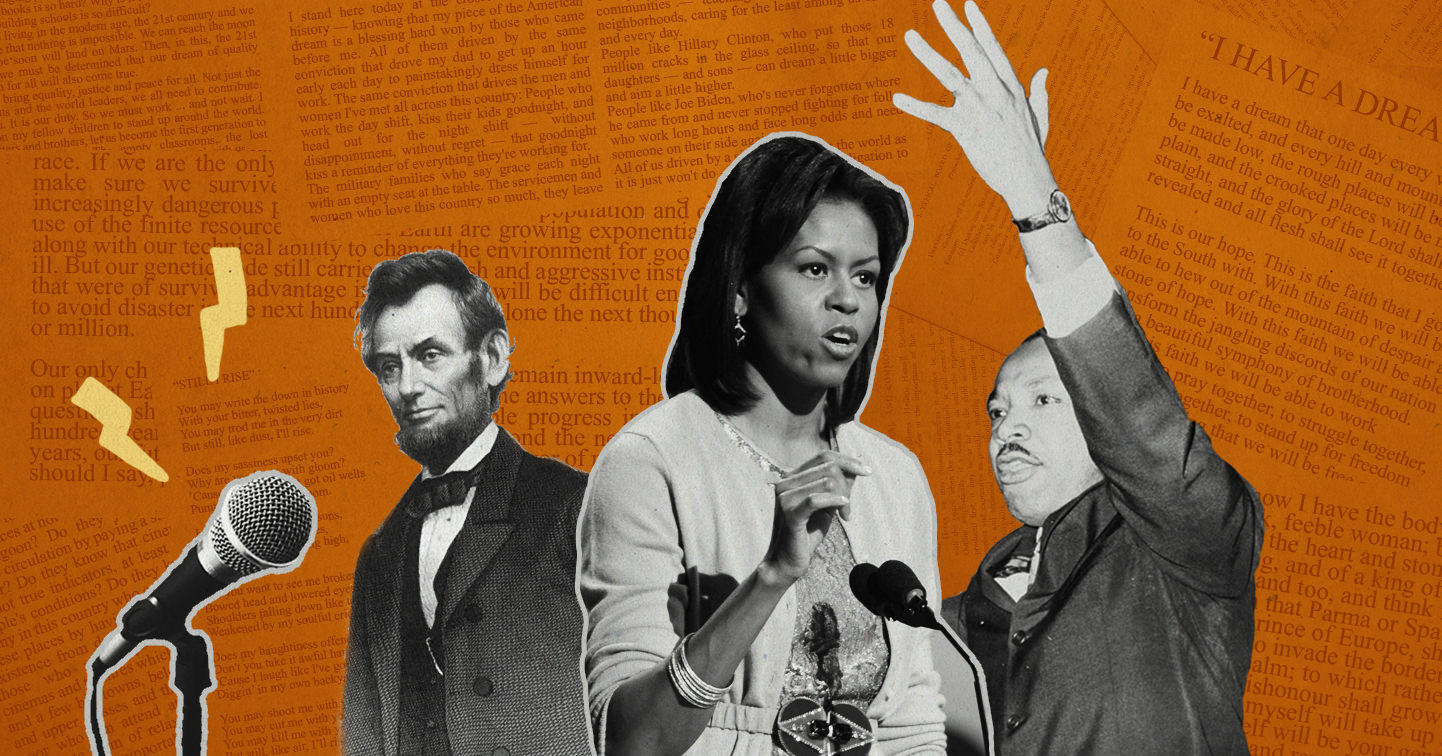
Across eras of calamity and peace in our world’s history, a great many leaders, writers, politicians, theorists, scientists, activists and other revolutionaries have unveiled powerful rousing speeches in their bids for change. In reviewing the plethora of orators across tides of social, political and economic change, we found some truly rousing speeches that brought the world to their feet or to a startling, necessary halt. We’ve chosen 40 of the most impactful speeches we managed to find from agents of change all over the world – a diversity of political campaigns, genders, positionalities and periods of history. You’re sure to find at least a few speeches in this list which will capture you with the sheer power of their words and meaning!
1. I have a dream by MLK
“I have a dream that one day down in Alabama, with its vicious racists, with its governor having his lips dripping with the words of interposition and nullification – one day right there in Alabama little black boys and black girls will be able to join hands with little white boys and white girls as sisters and brothers. I have a dream today. I have a dream that one day every valley shall be exalted, and every hill and mountain shall be made low, the rough places will be made plain, and the crooked places will be made straight, and the glory of the Lord shall be revealed and all flesh shall see it together. This is our hope. This is the faith that I go back to the South with. With this faith we will be able to hew out of the mountain of despair a stone of hope. With this faith we will be able to transform the jangling discords of our nation into a beautiful symphony of brotherhood. With this faith we will be able to work together, to pray together, to struggle together, to go to jail together, to stand up for freedom together, knowing that we will be free one day. This will be the day, this will be the day when all of God’s children will be able to sing with new meaning “My country ’tis of thee, sweet land of liberty, of thee I sing. Land where my father’s died, land of the Pilgrim’s pride, from every mountainside, let freedom ring!”
Unsurprisingly, Martin Luther King’s speech comes up top as the most inspiring speech of all time, especially given the harrowing conditions of African Americans in America at the time. In the post-abolition era when slavery was outlawed constitutionally, African Americans experienced an intense period of backlash from white supremacists who supported slavery where various institutional means were sought to subordinate African American people to positions similar to that of the slavery era. This later came to be known as the times of Jim Crow and segregation, which Martin Luther King powerfully voiced his vision for a day when racial discrimination would be a mere figment, where equality would reign.
2. Tilbury Speech by Queen Elizabeth I
“My loving people, We have been persuaded by some that are careful of our safety, to take heed how we commit our selves to armed multitudes, for fear of treachery; but I assure you I do not desire to live to distrust my faithful and loving people. Let tyrants fear. I have always so behaved myself that, under God, I have placed my chiefest strength and safeguard in the loyal hearts and good-will of my subjects; and therefore I am come amongst you, as you see, at this time, not for my recreation and disport, but being resolved, in the midst and heat of the battle, to live and die amongst you all; to lay down for my God, and for my kingdom, and my people, my honour and my blood, even in the dust. I know I have the body of a weak, feeble woman; but I have the heart and stomach of a king, and of a king of England too, and think foul scorn that Parma or Spain, or any prince of Europe, should dare to invade the borders of my realm; to which rather than any dishonour shall grow by me, I myself will take up arms, I myself will be your general, judge, and rewarder of every one of your virtues in the field. I know already, for your forwardness you have deserved rewards and crowns; and We do assure you on a word of a prince, they shall be duly paid. In the mean time, my lieutenant general shall be in my stead, than whom never prince commanded a more noble or worthy subject; not doubting but by your obedience to my general, by your concord in the camp, and your valour in the field, we shall shortly have a famous victory over these enemies of my God, of my kingdom, and of my people.”
While at war with Spain, Queen Elizabeth I was most renowned for her noble speech rallying the English troops against their comparatively formidable opponent. Using brilliant rhetorical devices like metonymy, meronymy, and other potent metaphors, she voiced her deeply-held commitment as a leader to the battle against the Spanish Armada – convincing the English army to keep holding their ground and upholding the sacrifice of war for the good of their people. Eventually against all odds, she led England to victory despite their underdog status in the conflict with her confident and masterful oratory.
3. Woodrow Wilson, address to Congress (April 2, 1917)
“The world must be made safe for democracy. Its peace must be planted upon the tested foundations of political liberty. We have no selfish ends to serve. We desire no conquest, no dominion. We seek no indemnities for ourselves, no material compensation for the sacrifices we shall freely make. We are but one of the champions of the rights of mankind. We shall be satisfied when those rights have been made as secure as the faith and the freedom of nations can make them. Just because we fight without rancor and without selfish object, seeking nothing for ourselves but what we shall wish to share with all free peoples, we shall, I feel confident, conduct our operations as belligerents without passion and ourselves observe with proud punctilio the principles of right and of fair play we profess to be fighting for. … It will be all the easier for us to conduct ourselves as belligerents in a high spirit of right and fairness because we act without animus, not in enmity toward a people or with the desire to bring any injury or disadvantage upon them, but only in armed opposition to an irresponsible government which has thrown aside all considerations of humanity and of right and is running amuck. We are, let me say again, the sincere friends of the German people, and shall desire nothing so much as the early reestablishment of intimate relations of mutual advantage between us—however hard it may be for them, for the time being, to believe that this is spoken from our hearts. We have borne with their present government through all these bitter months because of that friendship—exercising a patience and forbearance which would otherwise have been impossible. We shall, happily, still have an opportunity to prove that friendship in our daily attitude and actions toward the millions of men and women of German birth and native sympathy who live among us and share our life, and we shall be proud to prove it toward all who are in fact loyal to their neighbors and to the government in the hour of test. They are, most of them, as true and loyal Americans as if they had never known any other fealty or allegiance. They will be prompt to stand with us in rebuking and restraining the few who may be of a different mind and purpose. If there should be disloyalty, it will be dealt with with a firm hand of stern repression; but, if it lifts its head at all, it will lift it only here and there and without countenance except from a lawless and malignant few. It is a distressing and oppressive duty, gentlemen of the Congress, which I have performed in thus addressing you. There are, it may be, many months of fiery trial and sacrifice ahead of us. It is a fearful thing to lead this great peaceful people into war, into the most terrible and disastrous of all wars, civilization itself seeming to be in the balance. But the right is more precious than peace, and we shall fight for the things which we have always carried nearest our hearts—for democracy, for the right of those who submit to authority to have a voice in their own governments, for the rights and liberties of small nations, for a universal dominion of right by such a concert of free peoples as shall bring peace and safety to all nations and make the world itself at last free. To such a task we can dedicate our lives and our fortunes, everything that we are and everything that we have, with the pride of those who know that the day has come when America is privileged to spend her blood and her might for the principles that gave her birth and happiness and the peace which she has treasured. God helping her, she can do no other.”
On April 2, 1917, President Woodrow Wilson of the USA delivered his address to Congress, calling for declaration of war against what was at the time, a belligerent and aggressive Germany in WWI. Despite his isolationism and anti-war position earlier in his tenure as president, he convinced Congress that America had a moral duty to the world to step out of their neutral observer status into an active role of world leadership and stewardship in order to liberate attacked nations from their German aggressors. The idealistic values he preached in his speech left an indelible imprint upon the American spirit and self-conception, forming the moral basis for the country’s people and aspirational visions to this very day.
4. Ain’t I A Woman by Sojourner Truth
“That man over there says that women need to be helped into carriages, and lifted over ditches, and to have the best place everywhere. Nobody ever helps me into carriages, or over mud-puddles, or gives me any best place! And ain’t I a woman? Look at me! Look at my arm! I have ploughed and planted, and gathered into barns, and no man could head me! And ain’t I a woman? I could work as much and eat as much as a man – when I could get it – and bear the lash as well! And ain’t I a woman? I have borne thirteen children, and seen most all sold off to slavery, and when I cried out with my mother’s grief, none but Jesus heard me! And ain’t I a woman? … If the first woman God ever made was strong enough to turn the world upside down all alone, these women together ought to be able to turn it back , and get it right side up again! And now they is asking to do it, the men better let them.”
Hailing from a background of slavery and oppression, Sojourner Truth was one of the most revolutionary advocates for women’s human rights in the 1800s. In spite of the New York Anti-Slavery Law of 1827, her slavemaster refused to free her. As such, she fled, became an itinerant preacher and leading figure in the anti-slavery movement. By the 1850s, she became involved in the women’s rights movement as well. At the 1851 Women’s Rights Convention held in Akron, Ohio, she delivered her illuminating, forceful speech against discrimination of women and African Americans in the post-Civil War era, entrenching her status as one of the most revolutionary abolitionists and women’s rights activists across history.
5. The Gettsyburg Address by Abraham Lincoln
“Fondly do we hope, fervently do we pray, that this mighty scourge of war may speedily pass away. Yet, if God wills that it continue until all the wealth piled by the bondsman’s two hundred and fifty years of unrequited toil shall be sunk, and until every drop of blood drawn with the lash shall be paid by another drawn with the sword, as was said three thousand years ago, so still it must be said “the judgments of the Lord are true and righteous altogether.” With malice toward none, with charity for all, with firmness in the right as God gives us to see the right, let us strive on to finish the work we are in, to bind up the nation’s wounds, to care for him who shall have borne the battle and for his widow and his orphan, to do all which may achieve and cherish a just and lasting peace among ourselves and with all nations.”
President Abraham Lincoln had left the most lasting legacy upon American history for good reason, as one of the presidents with the moral courage to denounce slavery for the national atrocity it was. However, more difficult than standing up for the anti-slavery cause was the task of unifying the country post-abolition despite the looming shadows of a time when white Americans could own and subjugate slaves with impunity over the thousands of Americans who stood for liberation of African Americans from discrimination. He urged Americans to remember their common roots, heritage and the importance of “charity for all”, to ensure a “just and lasting peace” among within the country despite throes of racial division and self-determination.
6. Woman’s Rights to the Suffrage by Susan B Anthony
“For any State to make sex a qualification that must ever result in the disfranchisement of one entire half of the people is to pass a bill of attainder, or an ex post facto law, and is therefore a violation of the supreme law of the land. By it the blessings of liberty are for ever withheld from women and their female posterity. To them this government has no just powers derived from the consent of the governed. To them this government is not a democracy. It is not a republic. It is an odious aristocracy; a hateful oligarchy of sex; the most hateful aristocracy ever established on the face of the globe; an oligarchy of wealth, where the right govern the poor. An oligarchy of learning, where the educated govern the ignorant, or even an oligarchy of race, where the Saxon rules the African, might be endured; but this oligarchy of sex, which makes father, brothers, husband, sons, the oligarchs over the mother and sisters, the wife and daughters of every household–which ordains all men sovereigns, all women subjects, carries dissension, discord and rebellion into every home of the nation. Webster, Worcester and Bouvier all define a citizen to be a person in the United States, entitled to vote and hold office. The only question left to be settled now is: Are women persons? And I hardly believe any of our opponents will have the hardihood to say they are not. Being persons, then, women are citizens; and no State has a right to make any law, or to enforce any old law, that shall abridge their privileges or immunities. Hence, every discrimination against women in the constitutions and laws of the several States is today null and void, precisely as in every one against Negroes.”
Susan B. Anthony was a pivotal leader in the women’s suffrage movement who helped to found the National Woman Suffrage Association with Elizabeth Cady Stanton and fight for the constitutional right for women to vote. She courageously and relentlessly advocated for women’s rights, giving speeches all over the USA to convince people of women’s human rights to choice and the ballot. She is most well known for her act of righteous rebellion in 1872 when she voted in the presidential election illegally, for which she was arrested and tried unsuccessfully. She refused to pay the $100 fine in a bid to reject the demands of the American system she denounced as a ‘hateful oligarchy of sex’, sparking change with her righteous oratory and inspiring many others in the women’s suffrage movement within and beyond America.
7. Vladimir Lenin’s Speech at an International Meeting in Berne, February 8, 1916
“It may sound incredible, especially to Swiss comrades, but it is nevertheless true that in Russia, also, not only bloody tsarism, not only the capitalists, but also a section of the so-called or ex-Socialists say that Russia is fighting a “war of defence,” that Russia is only fighting against German invasion. The whole world knows, however, that for decades tsarism has been oppressing more than a hundred million people belonging to other nationalities in Russia; that for decades Russia has been pursuing a predatory policy towards China, Persia, Armenia and Galicia. Neither Russia, nor Germany, nor any other Great Power has the right to claim that it is waging a “war of defence”; all the Great Powers are waging an imperialist, capitalist war, a predatory war, a war for the oppression of small and foreign nations, a war for the sake of the profits of the capitalists, who are coining golden profits amounting to billions out of the appalling sufferings of the masses, out of the blood of the proletariat. … This again shows you, comrades, that in all countries of the world real preparations are being made to rally the forces of the working class. The horrors of war and the sufferings of the people are incredible. But we must not, and we have no reason whatever, to view the future with despair. The millions of victims who will fall in the war, and as a consequence of the war, will not fall in vain. The millions who are starving, the millions who are sacrificing their lives in the trenches, are not only suffering, they are also gathering strength, are pondering over the real cause of the war, are becoming more determined and are acquiring a clearer revolutionary understanding. Rising discontent of the masses, growing ferment, strikes, demonstrations, protests against the war—all this is taking place in all countries of the world. And this is the guarantee that the European War will be followed by the proletarian revolution against capitalism”
Vladimir Lenin remains to this day one of the most lauded communist revolutionaries in the world who brought the dangers of imperialism and capitalism to light with his rousing speeches condemning capitalist structures of power which inevitably enslave people to lives of misery and class stratification. In his genuine passion for the rights of the working class, he urged fellow comrades to turn the “imperialist war” into a “civil” or class war of the proletariat against the bourgeoisie. He encouraged the development of new revolutionary socialist organisations, solidarity across places in society so people could unite against their capitalist overlords, and criticised nationalism for its divisive effect on the socialist movement. In this speech especially, he lambasts “bloody Tsarism” for its oppression of millions of people of other nationalities in Russia, calling for the working class people to revolt against the Tsarist authority for the proletariat revolution to succeed and liberate them from class oppression.
8. I Have A Dream Speech by Mary Wollstonecraft
“If, I say, for I would not impress by declamation when Reason offers her sober light, if they be really capable of acting like rational creatures, let them not be treated like slaves; or, like the brutes who are dependent on the reason of man, when they associate with him; but cultivate their minds, give them the salutary, sublime curb of principle, and let them attain conscious dignity by feeling themselves only dependent on God. Teach them, in common with man, to submit to necessity, instead of giving, to render them more pleasing, a sex to morals. Further, should experience prove that they cannot attain the same degree of strength of mind, perseverance, and fortitude, let their virtues be the same in kind, though they may vainly struggle for the same degree; and the superiority of man will be equally clear, if not clearer; and truth, as it is a simple principle, which admits of no modification, would be common to both. Nay, the order of society as it is at present regulated would not be inverted, for woman would then only have the rank that reason assigned her, and arts could not be practised to bring the balance even, much less to turn it.”
In her vindication of the rights of women, Mary Wollstonecraft was one of the pioneers of the feminist movement back in 1792 who not only theorised and advocated revolutionarily, but gave speeches that voiced these challenges against a dominantly sexist society intent on classifying women as irrational less-than-human creatures to be enslaved as they were. In this landmark speech, she pronounces her ‘dream’ of a day when women would be treated as the rational, deserving humans they are, who are equal to man in strength and capability. With this speech setting an effective precedent for her call to equalize women before the law, she also went on to champion the provision of equal educational opportunities to women and girls, and persuasively argued against the patriarchal gender norms which prevented women from finding their own lot in life through their being locked into traditional institutions of marriage and motherhood against their will.
9. First Inaugural Speech by Franklin D Roosevelt
“So, first of all, let me assert my firm belief that the only thing we have to fear is…fear itself — nameless, unreasoning, unjustified terror which paralyzes needed efforts to convert retreat into advance. In every dark hour of our national life a leadership of frankness and of vigor has met with that understanding and support of the people themselves which is essential to victory. And I am convinced that you will again give that support to leadership in these critical days. … More important, a host of unemployed citizens face the grim problem of existence, and an equally great number toil with little return. Only a foolish optimist can deny the dark realities of the moment. Our greatest primary task is to put people to work. This is no unsolvable problem if we face it wisely and courageously. There are many ways in which it can be helped, but it can never be helped merely by talking about it. We must act and act quickly. … I am prepared under my constitutional duty to recommend the measures that a stricken Nation in the midst of a stricken world may require. These measures, or such other measures as the Congress may build out of its experience and wisdom, I shall seek, within my constitutional authority, to bring to speedy adoption. But in the event that the Congress shall fail to take one of these two courses, and in the event that the national emergency is still critical, I shall not evade the clear course of duty that will then confront me. I shall ask the Congress for the one remaining instrument to meet the crisis — broad Executive power to wage a war against the emergency, as great as the power that would be given to me if we were in fact invaded by a foreign foe.”
Roosevelt’s famous inaugural speech was delivered in the midst of a period of immense tension and strain under the Great Depression, where he highlighted the need for ‘quick action’ by Congress to prepare for government expansion in his pursuit of reforms to lift the American people out of devastating poverty. In a landslide victory, he certainly consolidated the hopes and will of the American people through this compelling speech.
10. The Hypocrisy of American Slavery by Frederick Douglass
“What to the American slave is your Fourth of July? I answer, a day that reveals to him more than all other days of the year, the gross injustice and cruelty to which he is the constant victim. To him your celebration is a sham; your boasted liberty an unholy license; your national greatness, swelling vanity; your sounds of rejoicing are empty and heartless; your shouts of liberty and equality, hollow mock; your prayers and hymns, your sermons and thanksgivings, with all your religious parade and solemnity, are to him mere bombast, fraud, deception, impiety, and hypocrisy – a thin veil to cover up crimes which would disgrace a nation of savages. There is not a nation of the earth guilty of practices more shocking and bloody than are the people of these United States at this very hour. Go search where you will, roam through all the monarchies and despotisms of the Old World, travel through South America, search out every abuse and when you have found the last, lay your facts by the side of the everyday practices of this nation, and you will say with me that, for revolting barbarity and shameless hypocrisy, America reigns without a rival.”
On 4 July 1852, Frederick Douglass gave this speech in Rochester, New York, highlighting the hypocrisy of celebrating freedom while slavery continues. He exposed the ‘revolting barbarity and shameless hypocrisy’ of slavery which had gone unabolished amidst the comparatively obscene celebration of independence and liberty with his potent speech and passion for the anti-abolition cause. After escaping from slavery, he went on to become a national leader of the abolitionist movement in Massachusetts and New York with his oratory and incisive antislavery writings. To this day, his fierce activism and devotion to exposing virulent racism for what it was has left a lasting legacy upon pro-Black social movements and the overall sociopolitical landscape of America.
11. Still I Rise by Maya Angelou
“You may write me down in history With your bitter, twisted lies, You may trod me in the very dirt But still, like dust, I’ll rise. Does my sassiness upset you? Why are you beset with gloom? ’Cause I walk like I’ve got oil wells Pumping in my living room. Just like moons and like suns, With the certainty of tides, Just like hopes springing high, Still I’ll rise. Did you want to see me broken? Bowed head and lowered eyes? Shoulders falling down like teardrops, Weakened by my soulful cries? Does my haughtiness offend you? Don’t you take it awful hard ’Cause I laugh like I’ve got gold mines Diggin’ in my own backyard. You may shoot me with your words, You may cut me with your eyes, You may kill me with your hatefulness, But still, like air, I’ll rise. Does my sexiness upset you? Does it come as a surprise That I dance like I’ve got diamonds At the meeting of my thighs? Out of the huts of history’s shame I rise Up from a past that’s rooted in pain I rise I’m a black ocean, leaping and wide, Welling and swelling I bear in the tide. Leaving behind nights of terror and fear I rise Into a daybreak that’s wondrously clear I rise Bringing the gifts that my ancestors gave, I am the dream and the hope of the slave. I rise I rise I rise.”
With her iconic poem Still I Rise , Maya Angelou is well-known for uplifting fellow African American women through her empowering novels and poetry and her work as a civil rights activist. Every bit as lyrical on the page, her recitation of Still I Rise continues to give poetry audiences shivers all over the world, inspiring women of colour everywhere to keep the good faith in striving for equality and peace, while radically believing in and empowering themselves to be agents of change. A dramatic reading of the poem will easily showcase the self-belief, strength and punch that it packs in the last stanza on the power of resisting marginalization.
12. Their Finest Hour by Winston Churchill
“What General Weygand called the Battle of France is over. I expect that the Battle of Britain is about to begin. Upon this battle depends the survival of Christian civilization. Upon it depends our own British life, and the long continuity of our institutions and our Empire. The whole fury and might of the enemy must very soon be turned on us. Hitler knows that he will have to break us in this Island or lose the war. If we can stand up to him, all Europe may be free and the life of the world may move forward into broad, sunlit uplands. But if we fail, then the whole world, including the United States, including all that we have known and cared for, will sink into the abyss of a new Dark Age made more sinister, and perhaps more protracted, by the lights of perverted science. Let us therefore brace ourselves to our duties, and so bear ourselves that, if the British Empire and its Commonwealth last for a thousand years, men will still say, “This was their finest hour.””
In the darkest shadows cast by war, few leaders have been able to step up to the mantle and effectively unify millions of citizens for truly sacrificial causes. Winston Churchill was the extraordinary exception – lifting 1940 Britain out of the darkness with his hopeful, convicted rhetoric to galvanise the English amidst bleak, dreary days of war and loss. Through Britain’s standalone position in WWII against the Nazis, he left his legacy by unifying the nation under shared sacrifices of the army and commemorating their courage.
13. A Room of One’s Own by Virginia Woolf
“Life for both sexes – and I looked at them (through a restaurant window while waiting for my lunch to be served), shouldering their way along the pavement – is arduous, difficult, a perpetual struggle. It calls for gigantic courage and strength. More than anything, perhaps, creatures of illusion as we are, it calls for confidence in oneself. Without self-confidence we are babes in the cradle. And how can we generate this imponderable quality, which is yet so invaluable, most quickly? By thinking that other people are inferior to oneself. By feeling that one has some innate superiority – it may be wealth, or rank, a straight nose, or the portrait of a grandfather by Romney – for there is no end to the pathetic devices of the human imagination – over other people. Hence the enormous importance to a patriarch who has to conquer, who has to rule, of feeling that great numbers of people, half the human race indeed, are by nature inferior to himself. It must indeed be one of the great sources of his power….Women have served all these centuries as looking-glasses possessing the magic and delicious power of reflecting the figure of man at twice its natural size. Without that power probably the earth would still be swamp and jungle. The glories of all our wars would be on the remains of mutton bones and bartering flints for sheepskins or whatever simple ornament took our unsophisticated taste. Supermen and Fingers of Destiny would never have existed. The Czar and the Kaiser would never have worn their crowns or lost them. Whatever may be their use in civilised societies, mirrors are essential to all violent and heroic action. That is why Napoleon and Mussolini both insist so emphatically upon the inferiority of women, for if they were not inferior, they would cease to enlarge. That serves to explain in part the necessity that women so often are to men. And it serves to explain how restless they are under her criticism; how impossible it is for her to say to them this book is bad, this picture is feeble, or whatever it may be, without giving far more pain and rousing far more anger than a man would do who gave the same criticism. For if she begins to tell the truth, the figure in the looking-glass shrinks; his fitness in life is diminished. How is he to go on giving judgment, civilising natives, making laws, writing books, dressing up and speechifying at banquets, unless he can see himself at breakfast and at dinner at least twice the size he really is?”
In this transformational speech , Virginia Woolf pronounces her vision that ‘a woman must have money and a room of her own if she is to write fiction’. She calls out the years in which women have been deprived of their own space for individual development through being chained to traditional arrangements or men’s prescriptions – demanding ‘gigantic courage’ and ‘confidence in oneself’ to brave through the onerous struggle of creating change for women’s rights. With her steadfast, stolid rhetoric and radical theorization, she paved the way for many women’s rights activists and writers to forge their own paths against patriarchal authority.
14. Inaugural Address by John F Kennedy
“In the long history of the world, only a few generations have been granted the role of defending freedom in its hour of maximum danger. I do not shrink from this responsibility–I welcome it. I do not believe that any of us would exchange places with any other people or any other generation. The energy, the faith, the devotion which we bring to this endeavor will light our country and all who serve it–and the glow from that fire can truly light the world. And so, my fellow Americans: ask not what your country can do for you–ask what you can do for your country. My fellow citizens of the world: ask not what America will do for you, but what together we can do for the freedom of man. Finally, whether you are citizens of America or citizens of the world, ask of us here the same high standards of strength and sacrifice which we ask of you. With a good conscience our only sure reward, with history the final judge of our deeds, let us go forth to lead the land we love, asking His blessing and His help, but knowing that here on earth God’s work must truly be our own.”
For what is probably the most historically groundbreaking use of parallelism in speech across American history, President JFK placed the weighty task of ‘asking what one can do for their country’ onto the shoulders of each American citizen. Using an air of firmness in his rhetoric by declaring his commitment to his countrymen, he urges each American to do the same for the broader, noble ideal of freedom for all. With his crucial interrogation of a citizen’s moral duty to his nation, President JFK truly made history.
15. Atoms for Peace Speech by Dwight Eisenhower
“To pause there would be to confirm the hopeless finality of a belief that two atomic colossi are doomed malevolently to eye each other indefinitely across a trembling world. To stop there would be to accept helplessly the probability of civilization destroyed, the annihilation of the irreplaceable heritage of mankind handed down to us from generation to generation, and the condemnation of mankind to begin all over again the age-old struggle upward from savagery towards decency, and right, and justice. Surely no sane member of the human race could discover victory in such desolation. Could anyone wish his name to be coupled by history with such human degradation and destruction?Occasional pages of history do record the faces of the “great destroyers”, but the whole book of history reveals mankind’s never-ending quest for peace and mankind’s God-given capacity to build. It is with the book of history, and not with isolated pages, that the United States will ever wish to be identified. My country wants to be constructive,not destructive. It wants agreements, not wars, among nations. It wants itself to live in freedom and in the confidence that the peoples of every other nation enjoy equally the right of choosing their own way of life. So my country’s purpose is to help us to move out of the dark chamber of horrors into the light, to find a way by which the minds of men, the hopes of men, the souls of men everywhere, can move forward towards peace and happiness and well-being.”
On a possibility as frightful and tense as nuclear war, President Eisenhower managed to convey the gravity of the world’s plight in his measured and persuasive speech centred on the greater good of mankind. Using rhetorical devices such as the three-part paratactical syntax which most world leaders are fond of for ingraining their words in the minds of their audience, he centers the discourse of the atomic bomb on those affected by such a world-changing decision in ‘the minds, hopes and souls of men everywhere’ – effectively putting the vivid image of millions of people’s fates at stake in the minds of his audience. Being able to make a topic as heavy and fraught with moral conflict as this as eloquent as he did, Eisenhower definitely ranks among some of the most skilled orators to date.
16. The Transformation of Silence into Language and Action by Audre Lorde
“I was going to die, if not sooner then later, whether or not I had ever spoken myself. My silences had not protected me. Your silence will not protect you. But for every real word spoken, for every attempt I had ever made to speak those truths for which I am still seeking, I had made contact with other women while we examined the words to fit a world in which we all believed, bridging our differences. What are the words you do not have yet? What do you need to say? What are the tyrannies you swallow day by day and attempt to make your own, until you will sicken and die of them, still in silence? Perhaps for some of you here today, I am the face of one of your fears. Because I am a woman, because I am black, because I am myself, a black woman warrior poet doing my work, come to ask you, are you doing yours?”
Revolutionary writer, feminist and civil rights activist Audre Lorde first delivered this phenomenal speech at Lesbian and Literature panel of the Modern Language Association’s December 28, 1977 meeting, which went on to feature permanently in her writings for its sheer wisdom and truth. Her powerful writing and speech about living on the margins of society has enlightened millions of people discriminated across various intersections, confronting them with the reality that they must speak – since their ‘silence will not protect’ them from further marginalization. Through her illuminating words and oratory, she has reminded marginalized persons of the importance of their selfhood and the radical capacity for change they have in a world blighted by prejudice and division.
17. 1965 Cambridge Union Hall Speech by James Baldwin
“What is dangerous here is the turning away from – the turning away from – anything any white American says. The reason for the political hesitation, in spite of the Johnson landslide is that one has been betrayed by American politicians for so long. And I am a grown man and perhaps I can be reasoned with. I certainly hope I can be. But I don’t know, and neither does Martin Luther King, none of us know how to deal with those other people whom the white world has so long ignored, who don’t believe anything the white world says and don’t entirely believe anything I or Martin is saying. And one can’t blame them. You watch what has happened to them in less than twenty years.”
Baldwin’s invitation to the Cambridge Union Hall is best remembered for foregrounding the unflinching differences in white and African Americans’ ‘system of reality’ in everyday life. Raising uncomfortable truths about the insidious nature of racism post-civil war, he provides several nuggets of thought-provoking wisdom on the state of relations between the oppressed and their oppressors, and what is necessary to mediate such relations and destroy the exploitative thread of racist hatred. With great frankness, he admits to not having all the answers but provides hard-hitting wisdom on engagement to guide activists through confounding times nonetheless.
18. I Am Prepared to Die by Nelson Mandela
“Above all, My Lord, we want equal political rights, because without them our disabilities will be permanent. I know this sounds revolutionary to the whites in this country, because the majority of voters will be Africans. This makes the white man fear democracy. But this fear cannot be allowed to stand in the way of the only solution which will guarantee racial harmony and freedom for all. It is not true that the enfranchisement of all will result in racial domination. Political division, based on colour, is entirely artificial and, when it disappears, so will the domination of one colour group by another. The ANC has spent half a century fighting against racialism. When it triumphs as it certainly must, it will not change that policy. This then is what the ANC is fighting. Our struggle is a truly national one. It is a struggle of the African people, inspired by our own suffering and our own experience. It is a struggle for the right to live. During my lifetime I have dedicated my life to this struggle of the African people. I have fought against white domination, and I have fought against black domination. I have cherished the ideal of a democratic and free society in which all persons will live together in harmony and with equal opportunities. It is an ideal for which I hope to live for and to see realised. But, My Lord, if it needs be, it is an ideal for which I am prepared to die.”
Apartheid is still considered one of these most devastating events of world history, and it would not have ended without the crucial effort and words of Nelson Mandela during his courageous political leadership. In this heartbreaking speech , he voices his utter devotion to the fight against institutionalised racism in African society – an ideal for which he was ‘prepared to die for’. Mandela continues to remind us today of his moral conviction in leading, wherein the world would likely to be a better place if all politicians had the same resolve and genuine commitment to human rights and the abolition of oppression as he did.
19. Critique on British Imperialism by General Aung San
“Do they form their observations by seeing the attendances at not very many cinemas and theatres of Rangoon? Do they judge this question of money circulation by paying a stray visit to a local bazaar? Do they know that cinemas and theatres are not true indicators, at least in Burma, of the people’s conditions? Do they know that there are many in this country who cannot think of going to these places by having to struggle for their bare existence from day to day? Do they know that those who nowadays patronise or frequent cinemas and theatres which exist only in Rangoon and a few big towns, belong generally to middle and upper classes and the very few of the many poor who can attend at all are doing so as a desperate form of relaxation just to make them forget their unsupportable existences for the while whatever may be the tomorrow that awaits them?”
Under British colonial rule, one of the most legendary nationalist leaders emerged from the ranks of the thousands of Burmese to boldly lead them towards independence, out of the exploitation and control under the British. General Aung San’s speech criticising British social, political and economic control of Burma continues to be scathing, articulate, and relevant – especially given his necessary goal of uniting the Burmese natives against their common oppressor. He successfully galvanised his people against the British, taking endless risks through nationalist speeches and demonstrations which gradually bore fruit in Burma’s independence.
20. Nobel Lecture by Mother Teresa
“I believe that we are not real social workers. We may be doing social work in the eyes of the people, but we are really contemplatives in the heart of the world. For we are touching the Body Of Christ 24 hours. We have 24 hours in this presence, and so you and I. You too try to bring that presence of God in your family, for the family that prays together stays together. And I think that we in our family don’t need bombs and guns, to destroy to bring peace–just get together, love one another, bring that peace, that joy, that strength of presence of each other in the home. And we will be able to overcome all the evil that is in the world. There is so much suffering, so much hatred, so much misery, and we with our prayer, with our sacrifice are beginning at home. Love begins at home, and it is not how much we do, but how much love we put in the action that we do. It is to God Almighty–how much we do it does not matter, because He is infinite, but how much love we put in that action. How much we do to Him in the person that we are serving.”
In contemporary culture, most people understand Mother Teresa to be the epitome of compassion and kindness. However, if one were to look closer at her speeches from the past, one would discover not merely her altruistic contributions, but her keen heart for social justice and the downtrodden. She wisely and gracefully remarks that ‘love begins at home’ from the individual actions of each person within their private lives, which accumulate into a life of goodness and charity. For this, her speeches served not just consolatory value or momentary relevance, as they still inform the present on how we can live lives worth living.
21. June 9 Speech to Martial Law Units by Deng Xiaoping
“This army still maintains the traditions of our old Red Army. What they crossed this time was in the true sense of the expression a political barrier, a threshold of life and death. This was not easy. This shows that the People’s Army is truly a great wall of iron and steel of the party and state. This shows that no matter how heavy our losses, the army, under the leadership of the party, will always remain the defender of the country, the defender of socialism, and the defender of the public interest. They are a most lovable people. At the same time, we should never forget how cruel our enemies are. We should have not one bit of forgiveness for them. The fact that this incident broke out as it did is very worthy of our pondering. It prompts us cool-headedly to consider the past and the future. Perhaps this bad thing will enable us to go ahead with reform and the open policy at a steadier and better — even a faster — pace, more speedily correct our mistakes, and better develop our strong points.”
Mere days before the 4 June 1989 Tiananmen Square uprising, Chinese Communist Party leader Deng Xiaoping sat with six party elders (senior officials) and the three remaining members of the Politburo Standing Committee, the paramount decision-making body in China’s government. The meeting was organised to discuss the best course of action for restoring social and political order to China, given the sweeping economic reforms that had taken place in the past decade that inevitably resulted in some social resistance from the populace. Deng then gave this astute and well-regarded speech, outlining the political complexities in shutting down student protests given the context of reforms encouraging economic liberalization already taking place, as aligned with the students’ desires. It may not be the most rousing or inflammatory of speeches, but it was certainly persuasive in voicing the importance of taking a strong stand for the economic reforms Deng was implementing to benefit Chinese citizens in the long run. Today, China is an economic superpower, far from its war-torn developing country status before Deng’s leadership – thanks to his foresight in ensuring political stability would allow China to enjoy the fruits of the massive changes they adapted to.
22. Freedom or Death by Emmeline Pankhurst
“You won your freedom in America when you had the revolution, by bloodshed, by sacrificing human life. You won the civil war by the sacrifice of human life when you decided to emancipate the negro. You have left it to women in your land, the men of all civilised countries have left it to women, to work out their own salvation. That is the way in which we women of England are doing. Human life for us is sacred, but we say if any life is to be sacrificed it shall be ours; we won’t do it ourselves, but we will put the enemy in the position where they will have to choose between giving us freedom or giving us death. Now whether you approve of us or whether you do not, you must see that we have brought the question of women’s suffrage into a position where it is of first rate importance, where it can be ignored no longer. Even the most hardened politician will hesitate to take upon himself directly the responsibility of sacrificing the lives of women of undoubted honour, of undoubted earnestness of purpose. That is the political situation as I lay it before you today.”
In 1913 after Suffragette Emily Davison stepped in front of King George V’s horse at the Epsom Derby and suffered fatal injuries, Emmeline Pankhurst delivered her speech to Connecticut as a call to action for people to support the suffragette movement. Her fortitude in delivering such a sobering speech on the state of women’s rights is worth remembering for its invaluable impact and contributions to the rights we enjoy in today’s world.
23. Quit India by Mahatma Gandhi
“We shall either free India or die in the attempt; we shall not live to see the perpetuation of our slavery. Every true Congressman or woman will join the struggle with an inflexible determination not to remain alive to see the country in bondage and slavery. Let that be your pledge. Keep jails out of your consideration. If the Government keep me free, I will not put on the Government the strain of maintaining a large number of prisoners at a time, when it is in trouble. Let every man and woman live every moment of his or her life hereafter in the consciousness that he or she eats or lives for achieving freedom and will die, if need be, to attain that goal. Take a pledge, with God and your own conscience as witness, that you will no longer rest till freedom is achieved and will be prepared to lay down your lives in the attempt to achieve it. He who loses his life will gain it; he who will seek to save it shall lose it. Freedom is not for the coward or the faint-hearted.”
Naturally, the revolutionary activist Gandhi had to appear in this list for his impassioned anti-colonial speeches which rallied Indians towards independence. Famous for leading non-violent demonstrations, his speeches were a key element in gathering Indians of all backgrounds together for the common cause of eliminating their colonial masters. His speeches were resolute, eloquent, and courageous, inspiring the hope and admiration of many not just within India, but around the world.
24. 1974 National Book Award Speech by Adrienne Rich, Alice Walker, Audre Lorde
“The statement I am going to read was prepared by three of the women nominated for the National Book Award for poetry, with the agreement that it would be read by whichever of us, if any, was chosen.We, Audre Lorde, Adrienne Rich, and Alice Walker, together accept this award in the name of all the women whose voices have gone and still go unheard in a patriarchal world, and in the name of those who, like us, have been tolerated as token women in this culture, often at great cost and in great pain. We believe that we can enrich ourselves more in supporting and giving to each other than by competing against each other; and that poetry—if it is poetry—exists in a realm beyond ranking and comparison. We symbolically join together here in refusing the terms of patriarchal competition and declaring that we will share this prize among us, to be used as best we can for women. We appreciate the good faith of the judges for this award, but none of us could accept this money for herself, nor could she let go unquestioned the terms on which poets are given or denied honor and livelihood in this world, especially when they are women. We dedicate this occasion to the struggle for self-determination of all women, of every color, identification, or derived class: the poet, the housewife, the lesbian, the mathematician, the mother, the dishwasher, the pregnant teen-ager, the teacher, the grandmother, the prostitute, the philosopher, the waitress, the women who will understand what we are doing here and those who will not understand yet; the silent women whose voices have been denied us, the articulate women who have given us strength to do our work.”
Adrienne Rich, Audre Lorde, and Alice Walker wrote this joint speech to be delivered by Adrienne Rich at the 1974 National Book Awards, based on their suspicions that the first few African American lesbian women to be nominated for the awards would be snubbed in favour of a white woman nominee. Their suspicions were confirmed, and Adrienne Rich delivered this socially significant speech in solidarity with her fellow nominees, upholding the voices of the ‘silent women whose voices have been denied’.
25. Speech to 20th Congress of the CPSU by Nikita Khruschev
“Considering the question of the cult of an individual, we must first of all show everyone what harm this caused to the interests of our Party. Vladimir Ilyich Lenin had always stressed the Party’s role and significance in the direction of the socialist government of workers and peasants; he saw in this the chief precondition for a successful building of socialism in our country. Pointing to the great responsibility of the Bolshevik Party, as ruling Party of the Soviet state, Lenin called for the most meticulous observance of all norms of Party life; he called for the realization of the principles of collegiality in the direction of the Party and the state. Collegiality of leadership flows from the very nature of our Party, a Party built on the principles of democratic centralism. “This means,” said Lenin, “that all Party matters are accomplished by all Party members – directly or through representatives – who, without any exceptions, are subject to the same rules; in addition, all administrative members, all directing collegia, all holders of Party positions are elective, they must account for their activities and are recallable.””
This speech is possibly the most famed Russian speech for its status as a ‘secret’ speech delivered only to the CPSU at the time, which was eventually revealed to the public. Given the unchallenged political legacy and cult of personality which Stalin left in the Soviet Union, Nikita Khruschev’s speech condemning the authoritarian means Stalin had resorted to to consolidate power as un-socialist was an important mark in Russian history.
26. The Struggle for Human Rights by Eleanor Roosevelt
“It is my belief, and I am sure it is also yours, that the struggle for democracy and freedom is a critical struggle, for their preservation is essential to the great objective of the United Nations to maintain international peace and security. Among free men the end cannot justify the means. We know the patterns of totalitarianism — the single political party, the control of schools, press, radio, the arts, the sciences, and the church to support autocratic authority; these are the age-old patterns against which men have struggled for three thousand years. These are the signs of reaction, retreat, and retrogression. The United Nations must hold fast to the heritage of freedom won by the struggle of its people; it must help us to pass it on to generations to come. The development of the ideal of freedom and its translation into the everyday life of the people in great areas of the earth is the product of the efforts of many peoples. It is the fruit of a long tradition of vigorous thinking and courageous action. No one race and on one people can claim to have done all the work to achieve greater dignity for human beings and great freedom to develop human personality. In each generation and in each country there must be a continuation of the struggle and new steps forward must be taken since this is preeminently a field in which to stand still is to retreat.”
Eleanor Roosevelt has been among the most well-loved First Ladies for good reason – her eloquence and gravitas in delivering every speech convinced everyone of her suitability for the oval office. In this determined and articulate speech , she outlines the fundamental values that form the bedrock of democracy, urging the rest of the world to uphold human rights regardless of national ideology and interests.
27. The Ballot or The Bullet by Malcolm X
“And in this manner, the organizations will increase in number and in quantity and in quality, and by August, it is then our intention to have a black nationalist convention which will consist of delegates from all over the country who are interested in the political, economic and social philosophy of black nationalism. After these delegates convene, we will hold a seminar; we will hold discussions; we will listen to everyone. We want to hear new ideas and new solutions and new answers. And at that time, if we see fit then to form a black nationalist party, we’ll form a black nationalist party. If it’s necessary to form a black nationalist army, we’ll form a black nationalist army. It’ll be the ballot or the bullet. It’ll be liberty or it’ll be death.”
Inarguably, the revolutionary impact Malcolm X’s fearless oratory had was substantial in his time as a radical anti-racist civil rights activist. His speeches’ emancipatory potential put forth his ‘theory of rhetorical action’ where he urges Black Americans to employ both the ballot and the bullet, strategically without being dependent on the other should the conditions of oppression change. A crucial leader in the fight for civil rights, he opened the eyes of thousands of Black Americans, politicising and convincing them of the necessity of fighting for their democratic rights against white supremacists.
28. Living the Revolution by Gloria Steinem
“The challenge to all of us, and to you men and women who are graduating today, is to live a revolution, not to die for one. There has been too much killing, and the weapons are now far too terrible. This revolution has to change consciousness, to upset the injustice of our current hierarchy by refusing to honor it, and to live a life that enforces a new social justice. Because the truth is none of us can be liberated if other groups are not.”
In an unexpected commencement speech delivered at Vassar College in 1970, Gloria Steinem boldly makes a call to action on behalf of marginalized groups in need of liberation to newly graduated students. She proclaimed it the year of Women’s Liberation and forcefully highlighted the need for a social revolution to ‘upset the injustice of the current hierarchy’ in favour of human rights – echoing the hard-hitting motto on social justice, ‘until all of us are free, none of us are free’.
29. The Last Words of Harvey Milk by Harvey Milk
“I cannot prevent some people from feeling angry and frustrated and mad in response to my death, but I hope they will take the frustration and madness and instead of demonstrating or anything of that type, I would hope that they would take the power and I would hope that five, ten, one hundred, a thousand would rise. I would like to see every gay lawyer, every gay architect come out, stand up and let the world know. That would do more to end prejudice overnight than anybody could imagine. I urge them to do that, urge them to come out. Only that way will we start to achieve our rights. … All I ask is for the movement to continue, and if a bullet should enter my brain, let that bullet destroy every closet door…”
As the first openly gay elected official in the history of California, Harvey Milk’s entire political candidature was in itself a radical statement against the homophobic status quo at the time. Given the dangerous times he was in as an openly gay man, he anticipated that he would be assassinated eventually in his political career. As such, these are some of his last words which show the utter devotion he had to campaigning against homophobia while representing the American people, voicing his heartbreaking wish for the bullet that would eventually kill him to ‘destroy every closet door’.
30. Black Power Address at UC Berkeley by Stokely Carmichael
“Now we are now engaged in a psychological struggle in this country, and that is whether or not black people will have the right to use the words they want to use without white people giving their sanction to it; and that we maintain, whether they like it or not, we gonna use the word “Black Power” — and let them address themselves to that; but that we are not going to wait for white people to sanction Black Power. We’re tired waiting; every time black people move in this country, they’re forced to defend their position before they move. It’s time that the people who are supposed to be defending their position do that. That’s white people. They ought to start defending themselves as to why they have oppressed and exploited us.”
A forceful and impressive orator, Stokely Carmichael was among those at the forefront of the civil rights movement, who was a vigorous socialist organizer as well. He led the Black Power movement wherein he gave this urgent, influential speech that propelled Black Americans forward in their fight for constitutional rights in the 1960s.
31. Speech on Vietnam by Lyndon Johnson
“The true peace-keepers are those men who stand out there on the DMZ at this very hour, taking the worst that the enemy can give. The true peace-keepers are the soldiers who are breaking the terrorist’s grip around the villages of Vietnam—the civilians who are bringing medical care and food and education to people who have already suffered a generation of war. And so I report to you that we are going to continue to press forward. Two things we must do. Two things we shall do. First, we must not mislead the enemy. Let him not think that debate and dissent will produce wavering and withdrawal. For I can assure you they won’t. Let him not think that protests will produce surrender. Because they won’t. Let him not think that he will wait us out. For he won’t. Second, we will provide all that our brave men require to do the job that must be done. And that job is going to be done. These gallant men have our prayers-have our thanks—have our heart-felt praise—and our deepest gratitude. Let the world know that the keepers of peace will endure through every trial—and that with the full backing of their countrymen, they are going to prevail.”
During some of the most harrowing periods of human history, the Vietnam War, American soldiers were getting soundly defeated by the Vietnamese in guerrilla warfare. President Lyndon Johnson then issued this dignified, consolatory speech to encourage patriotism and support for the soldiers putting their lives on the line for the nation.
32. A Whisper of AIDS by Mary Fisher
“We may take refuge in our stereotypes, but we cannot hide there long, because HIV asks only one thing of those it attacks. Are you human? And this is the right question. Are you human? Because people with HIV have not entered some alien state of being. They are human. They have not earned cruelty, and they do not deserve meanness. They don’t benefit from being isolated or treated as outcasts. Each of them is exactly what God made: a person; not evil, deserving of our judgment; not victims, longing for our pity people, ready for support and worthy of compassion. We must be consistent if we are to be believed. We cannot love justice and ignore prejudice, love our children and fear to teach them. Whatever our role as parent or policymaker, we must act as eloquently as we speak else we have no integrity. My call to the nation is a plea for awareness. If you believe you are safe, you are in danger. Because I was not hemophiliac, I was not at risk. Because I was not gay, I was not at risk. Because I did not inject drugs, I was not at risk. The lesson history teaches is this: If you believe you are safe, you are at risk. If you do not see this killer stalking your children, look again. There is no family or community, no race or religion, no place left in America that is safe. Until we genuinely embrace this message, we are a nation at risk.”
Back when AIDS research was still undeveloped, the stigma of contracting HIV was even more immense than it is today. A celebrated artist, author and speaker, Mary Fisher became an outspoken activist for those with HIV/AIDS, persuading people to extend compassion to the population with HIV instead of stigmatizing them – as injustice has a way of coming around to people eventually. Her bold act of speaking out for the community regardless of the way they contracted the disease, their sexual orientation or social group, was an influential move in advancing the human rights of those with HIV and spreading awareness on the discrimination they face.
33. Freedom from Fear by Aung San Suu Kyi
“The quintessential revolution is that of the spirit, born of an intellectual conviction of the need for change in those mental attitudes and values which shape the course of a nation’s development. A revolution which aims merely at changing official policies and institutions with a view to an improvement in material conditions has little chance of genuine success. Without a revolution of the spirit, the forces which produced the iniquities of the old order would continue to be operative, posing a constant threat to the process of reform and regeneration. It is not enough merely to call for freedom, democracy and human rights. There has to be a united determination to persevere in the struggle, to make sacrifices in the name of enduring truths, to resist the corrupting influences of desire, ill will, ignorance and fear. Saints, it has been said, are the sinners who go on trying. So free men are the oppressed who go on trying and who in the process make themselves fit to bear the responsibilities and to uphold the disciplines which will maintain a free society. Among the basic freedoms to which men aspire that their lives might be full and uncramped, freedom from fear stands out as both a means and an end. A people who would build a nation in which strong, democratic institutions are firmly established as a guarantee against state-induced power must first learn to liberate their own minds from apathy and fear.”
Famous for her resoluteness and fortitude in campaigning for democracy in Burma despite being put under house arrest by the military government, Aung San Suu Kyi’s speeches have been widely touted as inspirational. In this renowned speech of hers, she delivers a potent message to Burmese to ‘liberate their minds from apathy and fear’ in the struggle for freedom and human rights in the country. To this day, she continues to tirelessly champion the welfare and freedom of Burmese in a state still overcome by vestiges of authoritarian rule.
34. This Is Water by David Foster Wallace
“Our own present culture has harnessed these forces in ways that have yielded extraordinary wealth and comfort and personal freedom. The freedom all to be lords of our tiny skull-sized kingdoms, alone at the centre of all creation. This kind of freedom has much to recommend it. But of course there are all different kinds of freedom, and the kind that is most precious you will not hear much talk about much in the great outside world of wanting and achieving…. The really important kind of freedom involves attention and awareness and discipline, and being able truly to care about other people and to sacrifice for them over and over in myriad petty, unsexy ways every day. That is real freedom. That is being educated, and understanding how to think. The alternative is unconsciousness, the default setting, the rat race, the constant gnawing sense of having had, and lost, some infinite thing.”
Esteemed writer David Foster Wallace gave a remarkably casual yet wise commencement speech at Kenyon College in 2005 on the importance of learning to think beyond attaining a formal education. He encouraged hundreds of students to develop freedom of thought, a heart of sacrificial care for those in need of justice, and a consciousness that would serve them in discerning the right choices to make within a status quo that is easy to fall in line with. His captivating speech on what it meant to truly be ‘educated’ tugged at the hearts of many young and critical minds striving to achieve their dreams and change the world.
35. Questioning the Universe by Stephen Hawking
“This brings me to the last of the big questions: the future of the human race. If we are the only intelligent beings in the galaxy, we should make sure we survive and continue. But we are entering an increasingly dangerous period of our history. Our population and our use of the finite resources of planet Earth are growing exponentially, along with our technical ability to change the environment for good or ill. But our genetic code still carries the selfish and aggressive instincts that were of survival advantage in the past. It will be difficult enough to avoid disaster in the next hundred years, let alone the next thousand or million. Our only chance of long-term survival is not to remain inward-looking on planet Earth, but to spread out into space. The answers to these big questions show that we have made remarkable progress in the last hundred years. But if we want to continue beyond the next hundred years, our future is in space. That is why I am in favor of manned — or should I say, personned — space flight.”
Extraordinary theoretical physicist, cosmologist, and author Stephen Hawking was a considerable influence upon modern physics and scientific research at large, inspiring people regardless of physical ability to aspire towards expanding knowledge in the world. In his speech on Questioning the Universe, he speaks of the emerging currents and issues in the scientific world like that of outer space, raising and answering big questions that have stumped great thinkers for years.
36. 2008 Democratic National Convention Speech by Michelle Obama
“I stand here today at the crosscurrents of that history — knowing that my piece of the American dream is a blessing hard won by those who came before me. All of them driven by the same conviction that drove my dad to get up an hour early each day to painstakingly dress himself for work. The same conviction that drives the men and women I’ve met all across this country: People who work the day shift, kiss their kids goodnight, and head out for the night shift — without disappointment, without regret — that goodnight kiss a reminder of everything they’re working for. The military families who say grace each night with an empty seat at the table. The servicemen and women who love this country so much, they leave those they love most to defend it. The young people across America serving our communities — teaching children, cleaning up neighborhoods, caring for the least among us each and every day. People like Hillary Clinton, who put those 18 million cracks in the glass ceiling, so that our daughters — and sons — can dream a little bigger and aim a little higher. People like Joe Biden, who’s never forgotten where he came from and never stopped fighting for folks who work long hours and face long odds and need someone on their side again. All of us driven by a simple belief that the world as it is just won’t do — that we have an obligation to fight for the world as it should be. That is the thread that connects our hearts. That is the thread that runs through my journey and Barack’s journey and so many other improbable journeys that have brought us here tonight, where the current of history meets this new tide of hope. That is why I love this country.”
Ever the favourite modern First Lady of America, Michelle Obama has delivered an abundance of iconic speeches in her political capacity, never forgetting to foreground the indomitable human spirit embodied in American citizens’ everyday lives and efforts towards a better world. The Obamas might just have been the most articulate couple of rhetoricians of their time, making waves as the first African American president and First Lady while introducing important policies in their period of governance.
37. The Audacity of Hope by Barack Obama
“I’m not talking about blind optimism here — the almost willful ignorance that thinks unemployment will go away if we just don’t think about it, or the health care crisis will solve itself if we just ignore it. That’s not what I’m talking about. I’m talking about something more substantial. It’s the hope of slaves sitting around a fire singing freedom songs; the hope of immigrants setting out for distant shores; the hope of a young naval lieutenant bravely patrolling the Mekong Delta; the hope of a millworker’s son who dares to defy the odds; the hope of a skinny kid with a funny name who believes that America has a place for him, too. Hope — Hope in the face of difficulty. Hope in the face of uncertainty. The audacity of hope! In the end, that is God’s greatest gift to us, the bedrock of this nation. A belief in things not seen. A belief that there are better days ahead.”
Now published into a book, Barack Obama’s heart-capturing personal story of transformational hope was first delivered as a speech on the merits of patriotic optimism and determination put to the mission of concrete change. He has come to be known as one of the most favoured and inspiring presidents in American history, and arguably the most skilled orators ever.
38. “Be Your Own Story” by Toni Morrison
“But I’m not going to talk anymore about the future because I’m hesitant to describe or predict because I’m not even certain that it exists. That is to say, I’m not certain that somehow, perhaps, a burgeoning ménage a trois of political interests, corporate interests and military interests will not prevail and literally annihilate an inhabitable, humane future. Because I don’t think we can any longer rely on separation of powers, free speech, religious tolerance or unchallengeable civil liberties as a matter of course. That is, not while finite humans in the flux of time make decisions of infinite damage. Not while finite humans make infinite claims of virtue and unassailable power that are beyond their competence, if not their reach. So, no happy talk about the future. … Because the past is already in debt to the mismanaged present. And besides, contrary to what you may have heard or learned, the past is not done and it is not over, it’s still in process, which is another way of saying that when it’s critiqued, analyzed, it yields new information about itself. The past is already changing as it is being reexamined, as it is being listened to for deeper resonances. Actually it can be more liberating than any imagined future if you are willing to identify its evasions, its distortions, its lies, and are willing to unleash its secrets.”
Venerated author and professor Toni Morrison delivered an impressively articulate speech at Wellesley College in 2004 to new graduates, bucking the trend by discussing the importance of the past in informing current and future ways of living. With her brilliance and eloquence, she blew the crowd away and renewed in them the capacity for reflection upon using the past as a talisman to guide oneself along the journey of life.
39. Nobel Speech by Malala Yousafzai
“Dear brothers and sisters, the so-called world of adults may understand it, but we children don’t. Why is it that countries which we call “strong” are so powerful in creating wars but so weak in bringing peace? Why is it that giving guns is so easy but giving books is so hard? Why is it that making tanks is so easy, but building schools is so difficult? As we are living in the modern age, the 21st century and we all believe that nothing is impossible. We can reach the moon and maybe soon will land on Mars. Then, in this, the 21st century, we must be determined that our dream of quality education for all will also come true. So let us bring equality, justice and peace for all. Not just the politicians and the world leaders, we all need to contribute. Me. You. It is our duty. So we must work … and not wait. I call upon my fellow children to stand up around the world. Dear sisters and brothers, let us become the first generation to decide to be the last. The empty classrooms, the lost childhoods, wasted potential-let these things end with us.”
At a mere 16 years of age, Malala Yousafzai gave a speech on the severity of the state of human rights across the world, and wowed the world with her passion for justice at her tender age. She displayed tenacity and fearlessness speaking about her survival of an assassination attempt for her activism for gender equality in the field of education. A model of courage to us all, her speech remains an essential one in the fight for human rights in the 21st century.
40. Final Commencement Speech by Michelle Obama
“If you are a person of faith, know that religious diversity is a great American tradition, too. In fact, that’s why people first came to this country — to worship freely. And whether you are Muslim, Christian, Jewish, Hindu, Sikh — these religions are teaching our young people about justice, and compassion, and honesty. So I want our young people to continue to learn and practice those values with pride. You see, our glorious diversity — our diversities of faiths and colors and creeds — that is not a threat to who we are, it makes us who we are. So the young people here and the young people out there: Do not ever let anyone make you feel like you don’t matter, or like you don’t have a place in our American story — because you do. And you have a right to be exactly who you are. But I also want to be very clear: This right isn’t just handed to you. No, this right has to be earned every single day. You cannot take your freedoms for granted. Just like generations who have come before you, you have to do your part to preserve and protect those freedoms. … It is our fundamental belief in the power of hope that has allowed us to rise above the voices of doubt and division, of anger and fear that we have faced in our own lives and in the life of this country. Our hope that if we work hard enough and believe in ourselves, then we can be whatever we dream, regardless of the limitations that others may place on us. The hope that when people see us for who we truly are, maybe, just maybe they, too, will be inspired to rise to their best possible selves.”
Finally, we have yet another speech by Michelle Obama given in her final remarks as First Lady – a tear-inducing event for many Americans and even people around the world. In this emotional end to her political tenure, she gives an empowering, hopeful, expressive speech to young Americans, exhorting them to take hold of its future in all their diversity and work hard at being their best possible selves.
Amidst the bleak era of our current time with Trump as president of the USA, not only Michelle Obama, but all 40 of these amazing speeches can serve as sources of inspiration and hope to everyone – regardless of their identity or ambitions. After hearing these speeches, which one’s your favorite? Let us know in the comments below!
Article Written By: Kai Xin Koh
You may also like….

How To Prepare An Awesome Business Presentation
by Kai Xin Koh
Business presentations are inescapable in today’s world, where entrepreneurship and innovation are at the heart of businesses. With limited...
Sign Up for Winning With Stories!
- First Name *
- Phone This field is for validation purposes and should be left unchanged.
- Skip to main content
- Keyboard shortcuts for audio player
Like a Phish concert but with more grievance, this is what it's like at a Trump rally

Danielle Kurtzleben

A couple kisses while waiting for the start of a campaign rally with former President Donald Trump on March 9 in Rome, Ga. Chip Somodevilla/Getty Images hide caption
A couple kisses while waiting for the start of a campaign rally with former President Donald Trump on March 9 in Rome, Ga.
At 6:30 a.m. it was still dark in Rome, Ga. But people had been lined up for a long time already, still nearly 12 hours before Trump was set to take the stage at another of his rallies.
Some had waited all night amid the crowd-control gates, in the bottom level of a downtown parking garage. At the very front of the line, Sharon Anderson waited under a blanket on a camp chair.
She told me this was her 50th rally. Why does she attend so many?
"I want to show my support for the best president in the history of this nation," she explained.
Anderson and some friends were all wearing tops styled to look like baseball shirts, with a big "47" on the back (for Trump's quest to be the 47th president) and "FRONT ROW JOES" on the front. Those "Joes" are a team of Trump superfans who get right up front at rallies.
I asked Anderson how she would describe a Trump rally to someone who has never been to one.
"Oh, it's very uplifting, encouraging, exciting," she said. "You just can't describe it verbally."
Many Americans won't share her experience — or her view — and will instead witness Trump events through viral clips of his at times violent, anti-democratic rhetoric — for example, his recent dehumanizing language about migrants and comments about a "bloodbath" should Joe Biden win a second term.
And that's important. But nine years in, these surreal events say so much more about the continued Trump phenomenon.
A Trump rally has the feel of an all-day pep rally mixed with a megachurch service — except with Trumpism as the religion. The rallies are places where a movement largely defined by grievance can be together, away from opponents — not to mention assertions that Trump lies and is harmful to democracy.
They are places to see that for many Americans, Trumpism isn't just about politics; it's a core part of their identities.

Trump supporters hold images of Laken Riley before he speaks at a rally in Rome, Ga., on March 9. Elijah Nouvelage/AFP via Getty Images hide caption
Trump supporters hold images of Laken Riley before he speaks at a rally in Rome, Ga., on March 9.
Families, fandoms, and 'FJB'
Not far away from Sharon — maybe 20th in line — Lauren Tucker waited. She and her mother traded off holding their place in line overnight. This would be her first rally.
"Everybody here, all the people that were in line before us, they have been so amazing all night long. And they told us exactly what to expect. They helped us get our little buttons and they've just been wonderful," Tucker exclaimed. "It's almost like a little family."
Tucker is the mother of six, and her 6-year-old son played on a tablet next to her.
"It was very important for me to have my kids be here because this is something that, A, they're going to remember, and, B, this is going to be talked about for years," she said. "For the next hundred years, this is going to be talked about. And my kids will be able to say, 'Hey, I was there. My mom took me to that. I saw that man.'"
Tucker was wearing red white and blue eyeshadow and an American flag cowboy hat.
And this is a hallmark of Trump rallies: people dress up for them in a way they don't for other politicians.
Merch sellers like Amber Johnson add to a growing sea of Trumpwear. Johnson is a Trump supporter herself — she calls herself a "Republican Mississippi hippie" — and compares the rallies to rock concerts. She speaks from experience.

The merch at a Trump rally varies widely, with people procuring it from street vendors as well as all over the internet. Elijah Nouvelage/AFP via Getty Images hide caption
The merch at a Trump rally varies widely, with people procuring it from street vendors as well as all over the internet.
"It's kind of the same vibe. So I followed Dead & Company and Phish around all summer, and now I'm out here doing the same thing, but selling political merchandise," she said with a laugh.
And this is one way to understand what makes Trump such a singular phenomenon. His fans aren't just out to hear a political message; they're participating in a fandom — a political version of Deadheads or Parrotheads.
Then again, there's a combativeness at a Trump concert that doesn't exist at a Phish concert — or at a Biden event, for that matter.
One man nearby sold t-shirts printed with vulgar, sexually explicit statements about Joe Biden, Kamala Harris, and Nancy Pelosi. Among Johnson's tamer shirts was one that read, "If you don't like Trump, then you probably won't like me, and I'm OK with that."
Another read "FJB," where the JB stands for Joe Biden and the F is an expletive.

Young conservatives have grown up in Trump's Republican Party. Now, it's time to vote
Carli Godfrey is 16 and came with her grandmother, in matching t-shirts. She read the defiant phrase written across their chests: "I'm still a Trump girl. I make no apologies."
I asked Godfrey what that means – does she think people want her to make apologies? She answered that even in uberconservative northwest Georgia, her politics differ from some of her peers'.
"Being in high school, some people are like, 'Why are you doing that?'" she said, referring to her Trump fandom. "I mean, a lot of people — this is going to sound really sad, but a lot of people don't stand for [the] flag. But I do. I always will."

Rep. Marjorie Taylor Greene (R-GA) got a hero's welcome at the Rome rally, which took place in the heart of her congressional district. Chip Somodevilla/Getty Images hide caption
Rep. Marjorie Taylor Greene (R-GA) got a hero's welcome at the Rome rally, which took place in the heart of her congressional district.
The grievance of the underdog
The aggressive merch suggests that wearers expect, even relish, opposition. And Trump rallies have perhaps a more confrontational feel than ever, amid his four indictments, and his insistence that he won in 2020. All the voters I asked about 2020 also think Trump won that election. He didn't.
Midmorning, a few hundred deep into the line, Angie Patrick had just helped a friend wriggle into a new t-shirt reading "God, Guns, and Trump". Patrick said me she has her own way of fighting for the former president.

Conservatives are warning about noncitizens voting. It's a myth with a long history
"I'm a digital warrior. That means sharing things that perhaps maybe the mainstream media doesn't necessarily share with the public," she explained.
She mentioned multiple conspiracy theories she believes in and said she had been kicked off of Twitter 31 times (pre-Elon Musk's tenure, that is).
To Patrick, Trump is beleaguered and bullied...but also massively powerful. It's a careful needle he has managed to thread with his followers.
"I think he's beaten the odds. And I like an underdog," she said. But she quickly added, "although I don't think Trump is an underdog. I think he's definitely the front dog."

Toby Keith's 'Courtesy of the Red, White and Blue' lives on in MAGA country
A lot of Trump's supporters themselves feel like underdogs.
By mid-afternoon, people were taking their seats in the city arena. One of them, college student Zachary Wright, said he feels economically strapped, but also feels marginalized culturally.
"If the economy keeps on getting worse and worse and worse, then how much is it going to cost for my kids to get lunch? And not only that, what's so frustrating is that the leftist wing focuses so much on minorities that it feels like me as a white man, that I am the minority."
We versus 'they'
All afternoon, people queued for concessions and restrooms, chatting with their fellow Trump disciples.
But the mood darkened as Trump's opening act took the stage — a run of right-wing politicians. Their message was that the Trump movement has an endless string of enemies outside the arena.
Representative Marjorie Taylor Greene, for example, repeatedly referenced a nameless "they."
"We said build the wall. And they were offended. We said back the blue and they were offended, right?" she added, as the crowd started booing in agreement.

The crowd turns to taunt the press during Trump's speech in Rome. Danielle Kurtzleben/NPR hide caption
The crowd turns to taunt the press during Trump's speech in Rome.
At a Trump rally, even the rioters who attacked the capitol on Jan. 6 are recast as victims of anti-Trump forces.
"Ladies and gentlemen," an announcer's deep voice boomed over dramatic music. "Please rise for the horribly and unfairly treated January 6 hostages."
Lately, Trump takes the stage after a recording of the national anthem sung by those jailed for that attack. While Trump's indictment for his actions on Jan. 6 looms over his campaign, he also embraces that day. Indeed, he has said he plans to pardon many of the convicted rioters .
Trump started speaking in Rome at around 6:00 p.m., about an hour late. He would remain on stage for nearly 2 hours — long even for a Trump rally speech.
As usual, the demonization of undocumented immigrants was a key focus and drew loud cheers.
"What Joe Biden has done on our border is a crime against humanity and the people of this nation for which he will never be forgiven. We're going to fix it. We're going to fix it fast. We're going to have the largest deportation in history," he said, to thunderous applause.

Now that he's the presumptive nominee, Trump readies next campaign: who will be VP?
Even when his particular wording doesn't make headlines, Trump's speeches are full of false — and sometimes strange — rhetoric about migrants.
"They always say suburban housewives, they want something that's very important: security," he told the crowd. "They don't want illegal immigrants coming into our country. They don't want illegal immigrants knocking on their front door and saying, 'I'm going to use your kitchen, and I'm going to use your bedroom, and there's not a damn thing-' And that's the nice ones, okay?"
The speech went beyond immigration though, meandering toward many more of trump's grievances — yes, against Joe Biden, but also Fulton County, Ga., prosecutor Fani Willis, N.Y. Attorney General Letitia James, Megyn Kelly and Martha Stewart...to name a few.
In addition, he praised Hungarian autocrat Viktor Orban and North Korean dictator Kim Jong Un.
After it all, the evening ended with a familiar benediction: "We will make America great again."
Just outside, Tynisha Williams said she had a great time. She added — paradoxically — she thinks Trump's divisiveness will unify the U.S.
"It's time for the kid gloves to be taken off," she said. "You need to know the hard truth. And the hard truth is we need to come back together as a country. We need to get this country back together. And we got to unite. We gotta make this country great again, as simple as that."
It's not clear how Trump would unite the nation, however. A week later, at another rally, he would say that some undocumented immigrants aren't people, whipping up another firestorm of controversy.

Trump says some migrants are 'not people', and warns of 'bloodbath' if he loses
- trump rallies
- illegal immigrants
- trump rally
- undocumented immigrants
Mobile Menu Overlay
The White House 1600 Pennsylvania Ave NW Washington, DC 20500
Statement from President Joseph R. Biden on the Occasion of Ramadan
Tonight—as the new crescent moon marks the beginning of the Islamic holy month of Ramadan—Jill and I extend our best wishes and prayers to Muslims across our country and around the world.
The sacred month is a time for reflection and renewal. This year, it comes at a moment of immense pain. The war in Gaza has inflicted terrible suffering on the Palestinian people. More than 30,000 Palestinians have been killed, most of them civilians, including thousands of children. Some are family members of American Muslims, who are deeply grieving their lost loved ones today. Nearly two million Palestinians have been displaced by the war; many are in urgent need of food, water, medicine, and shelter. As Muslims gather around the world over the coming days and weeks to break their fast, the suffering of the Palestinian people will be front of mind for many. It is front of mind for me.
The United States will continue to lead international efforts to get more humanitarian assistance into Gaza by land, air, and sea. Earlier this week, I directed our military to lead an emergency mission to establish a temporary pier on the coast of Gaza that can receive large shipments of aid. We are carrying out airdrops of aid, in coordination with our international partners, including Jordan. And we’ll continue to work with Israel to expand deliveries by land, insisting that it facilitate more routes and open more crossings to get more aid to more people.
While we get more life-saving aid to Gaza, the United States will continue working non-stop to establish an immediate and sustained ceasefire for at least six weeks as part of a deal that releases hostages. And we will continue building toward a long-term future of stability, security, and peace. That includes a two-state solution to ensure Palestinians and Israelis share equal measures of freedom, dignity, security, and prosperity. That is the only path toward an enduring peace.
Here at home, we have seen an appalling resurgence of hate and violence toward Muslim Americans. Islamophobia has absolutely no place in the United States, a country founded on freedom of worship and built on the contributions of immigrants, including Muslim immigrants. My Administration is developing the first-ever National Strategy to Counter Islamophobia and Related Forms of Bias and Discrimination, to take on hate against Muslim, Sikh, South Asian, and Arab American communities, wherever it occurs. No one should ever fear being targeted at school, at work, on the street, or in their community because of their background or beliefs.
To Muslims across our country, please know that you are deeply valued members of our American family. To those who are grieving during this time of war, I hear you, I see you, and I pray you find solace in your faith, family, and community. And to all who are marking the beginning of Ramadan tonight, I wish you a safe, healthy, and blessed month. Ramadan kareem.
Stay Connected
We'll be in touch with the latest information on how President Biden and his administration are working for the American people, as well as ways you can get involved and help our country build back better.
Opt in to send and receive text messages from President Biden.

A judge dismissed Elon Musk's lawsuit as 'unabashedly' trying to punish an anti-hate speech group
A federal judge in California on Monday dismissed a lawsuit by Elon Musk’s social media platform X. The lawsuit was brought against the non-profit, anti-hate speech group Center for Countering Digital Hate (CCDH).
In his ruling, U.S. District Judge Charles Breyer said it was “evident” that the lawsuit was filed to punish CCDH.
The group published a series of research articles last year that claimed that hate speech on the social network was on the rise since Musk took over the company in 2022 and that it even profited from accounts that promoted such speech .
X, formerly known as Twitter, filed the lawsuit in July accusing CCDH of violating its terms of service and unlawfully accessing data . The lawsuit went on to allege that the group cherry-picked posts for a “scare campaign” that resulted in the platform losing tens of million of dollars in advertising revenue.
In July, Elon Musk claimed advertising revenue at the company dropped 50% .
“Sometimes it is unclear what is driving a litigation, and only by reading between the lines of a complaint can one attempt to surmise a plaintiff’s true purpose. Other times, a complaint is so unabashedly and vociferously about one thing that there can be no mistaking that purpose,” Breyer said in his ruling. “This case represents the latter circumstance. This case is about punishing the defendants for their speech.”
In a post on the platform, X said that it plans to appeal the decision .
“The courts today have affirmed our fundamental right to research, to speak, to advocate, and to hold accountable social media companies for decisions they make behind closed doors that affect our kids, our democracy, and our fundamental human rights and civil liberties,” CCDH founder and CEO Imran Ahmed said in a statement.
For the latest news, Facebook , Twitter and Instagram .

The fraying of freedom in New Mexico
Freedoms are fraying.
Current examples include book-banning, Otero County Commission’s citizen censorship, and a New Mexico order limiting free speech.
Nationally, book-banning is on the rise. As in a recent local example, it’s mostly a small conservative group. It’s not someone reading a book and getting disgusted or offended. Partially sparked by “copycat” bans, book bans are up 33% this year, mostly censoring discussions of race, sex, and gender identity. It’s even struck fine literature like Toni Morrison’s The Bluest Eye ?
The Otero County Commission, during Couy Griffin’s tenure, was Trump Country. In public input, some crazy guy said the 2020 election wasn’t stolen. The sheriff hustled him roughly out of the chambers. Matthew Crecelius wasn’t just any citizen. He was a veteran, an ex-MP. He had also objected to the banning of library books. The ACLU helped him win a $45,000 apology in court recently.
Meanwhile, Governor Michelle Lujan-Grisham, likely with good intentions, issued Executive Order 2022-118, adopting as state law an overly broad definition of antisemitism that will chill free speech.
For years, Israeli lobbyists have been pushing the International Holocaust Remembrance Alliance’s (IHRA’s) definition of antisemitism, in what a panel of scholars called, “a movement seeking to redefine and curtail global conversations through the misappropriation and mobilization of legitimate concerns.” Bigotry is a legitimate concern, but the misleading definition can be used as a weapon against legitimate political dialogue.
Therefore been dozens of attempts to sell governments, universities, and major organizations on the definition. Assessing it, a team concluded, “The IHRA definition is fundamentally unsuitable for adoption” and recommended rejecting it because it didn’t “reflect the historical phenomena of antisemitism fully, didn’t “reflect the current realities of antisemitism,” and “has been, and could continue to be, used to suppress freedom of speech.”
For example, the definition forbids “Calling Israel a ‘racist endeavor.’” Whatever Zionists originally wanted, even many Jews call Israel an apartheid state now. Palestinians mostly can only be second-class citizens. Israel may say that’s necessary for security; but South Africa retained apartheid partially for security, lest Blacks, given more rights and freedom, might butcher Whites.
I find “Comparing Israel to the Nazis” both tasteless and inaccurate, but if I had family in Gaza, why couldn’t I compare Israel’s slaughters to Nazi slaughters? A major Israeli general has done so, publicly. Is he antisemitic?
I would distinguish what Israel’s is doing in Gaza from “genocide.” But others disagree. How many tens of thousands of civilian deaths would make that a legitimate question? No amount, says our guv.
Hating who I am differs fundamentally from hating what I do. Anti-Antisemitism traditionally, means punishing or mistreating people simply because they’re Jewish. Further, we mustn’t hold any Jew or Palestinian here responsible for misconduct there.
A New York Congressman has urged Congress to enact this restrictive standard. He has the chutzpah to shout that it’s completely unrelated to free speech! It’s not a free-speech issue because it could lead to people getting harmed. But Gazans are people, too.
We’d let a Tutsi or Armenian accuse Hutus or Turks of attempting genocide. No nationality should have some special privilege against having its bad conduct called out by others, particularly victims. Let public opinion or courts figure out the truth. New Mexico law should not outlaw the debate!
Governor, please don’t let free speech get chopped up by a definition, accepted by you with good intentions, that was designed as a weapon.
Trump’s ‘bloodbath’ and other rhetoric inflame his 2024 campaign trail

BLOOD POISONING
Immigrants are 'animals,' 'not people', black americans and crime, apocalypse now, dictator on 'day one'.
Get weekly news and analysis on the U.S. elections and how it matters to the world with the newsletter On the Campaign Trail. Sign up here.
Reporting by Gram Slattery, editing by Ross Colvin, Kieran Murray and Howard Goller
Our Standards: The Thomson Reuters Trust Principles. , opens new tab

Thomson Reuters
Washington-based correspondent covering campaigns and Congress. Previously posted in Rio de Janeiro, Sao Paulo and Santiago, Chile, and has reported extensively throughout Latin America. Co-winner of the 2021 Reuters Journalist of the Year Award in the business coverage category for a series on corruption and fraud in the oil industry. He was born in Massachusetts and graduated from Harvard College.

Divers to search Baltimore Harbor for six presumed dead in bridge collapse
Search divers were expected to return near dawn on Wednesday to the waters surrounding the twisted ruins of a bridge knocked down in Baltimore Harbor by a faltering cargo ship, leaving six workers missing and presumed dead.

A Tunisian court sentenced on Wednesday four people to death and two people to life in prison on charges of participating in the murder of prominent political leader Chokri Belaid 11 years ago, the country's first political assassination in decades.

Elon Musk's X bans revealing the names of anonymous users after scrutiny of an antisemitic cartoonist

Elon Musk’s X changed its privacy policy this week to ban users from publishing the real names of people behind anonymous accounts after some users appeared to unmask a pseudonymous cartoonist who drew antisemitic images.
The social media platform updated its privacy policy to say people “cannot share … the identity of an anonymous user, such as their name or media depicting them,” without that person’s permission. The company said it was doing so to maintain a safe and secure platform.
X users expressed mixed feelings about the change, because the catalyst appeared to be someone involved in antisemitism, but, depending on how it is applied, it could benefit other people, such as anonymous dissidents in repressive countries.
The policy change added to what some X users and critics have said is a growing list of examples of Musk going out of his way to defend neo-Nazis, antisemites and white supremacists. Musk has embraced an antisemitic conspiracy theory, and, since he bought the app then known as Twitter in 2022, he has welcomed back antisemitic accounts that Twitter’s previous management had suspended for breaking its rules. Musk has also second-guessed law enforcement officials after they said a mass shooter was a suspected neo-Nazi sympathizer.
The policy also clashes with Musk’s ongoing claims that X is dedicated to free speech, because journalists have a long history of unmasking powerful people who avoid public scrutiny. Since he bought the platform, Musk has suspended journalists and filed lawsuits targeting his critics while continuing to state that X is a bulwark against censorship.
“Twitter’s policies have officially been changed to aid a neo nazi,” Alejandra Caraballo, a clinical instructor at the Harvard Law Cyberlaw Clinic and a vocal Musk critic, wrote on the rival platform Threads.
In a phone interview, Caraballo said that the new policy was poorly thought-out and that she doubted that X would apply it evenly.
“If this had been a long-term policy that would be consistently enforced, I don’t think it would necessarily be a bad thing,” she said.
Other X users also expressed doubt that Musk would apply the new policy in an even-handed manner, given his own extreme views.
X did not immediately respond to a request for comment or further information. In a post on X, it described the change as a clarification of its existing rules against posting other people’s private information.
“We’re further clarifying our external policy to explicitly include provisions for user anonymity reinforcing X’s commitment to maintaining a safe and secure platform,” the post said .
The change came a day after Wired magazine reported that X was already following the policy in at least one case without having put it in writing. The magazine reported that X was suspending the accounts of some journalists and researchers who posted the possible identity of an antisemitic cartoonist going by the pseudonym Stonetoss.
The person behind the Stonetoss online comics was the subject of a report March 12 by the Anonymous Comrades Collective, an antifascist research group. It said Stonetoss is the creation of a Texas man who works in information technology, and it named him and his employer, as well as documenting comments he had made on podcasts and social media.
The cartoons by Stonetoss are extreme. One shows a Jewish man drinking the blood of an infant, which is a common antisemitic trope. Others use the deaths by suicide of transgender people as punchlines. Stonetoss posts the cartoons on X, where they often attract millions of views.
NBC News has not confirmed the identity of the person behind Stonetoss, and the Stonetoss account did not immediately respond to a request for comment Thursday. Stonetoss’ X account posted this week that they had been wrongly labeled a “Nazi” and they said they were making money off the dispute by selling plushie dolls online.
Despite the new policy, hundreds of X users were posting the alleged name of Stonetoss this week.
The platform previously known as Twitter has had a long history with anonymous and pseudonymous accounts. While Facebook has in general required people to use their real names since it opened to the public in 2006, Twitter has never had such a requirement. At times, Twitter went to court to prevent attempts by governments to unmask critics, moves that human rights advocates welcomed as evidence of a commitment to protect dissidents.
Anonymous accounts played pivotal roles in some of Twitter’s key moments in history, including the Occupy Wall Street protests, which began in 2011. Saudi Arabia hired a Twitter employee as a spy to try to unmask dissidents, with a jury in California later convicting the man of acting as an unregistered agent.
In 2021, Twitter’s then-safety team published an essay in defense of anonymity, although Twitter at that time was different in other ways, including its enforcement of a policy against hateful or dehumanizing imagery. Now, some antisemitic posts on X get hundreds of thousands of views and are not taken down after people flag them, according to a review by The Washington Post .
Corynne McSherry, legal director of the online rights group Electronic Frontier Foundation, said platforms are free to make their own decisions about moderation policies and what speech they will host. But she expressed concern about inconsistency at X.
“Policies protecting users’ anonymity (which can be critical to free expression) are important, but should be carefully and consistently enforced, especially when there are competing speech interests. If Wired’s reporting is correct, that’s not happening here,” she said in a statement to NBC News.
McSherry added that X has unmasked users at the behest of governments under Musk. She cited a report last year from the website Rest of World finding that, during the first six months of Musk’s ownership, Twitter said it fully complied with 808 of 971 requests from governments and courts, including orders to remove posts and demands for private data. It said it partially complied in 154 other cases.
Broadly speaking, the privacy policies of X and other sites are designed to prevent what is known as doxxing: the release of a person’s identifying information with malicious intent.
The situation around the cartoonist Stonetoss is further complicated because X is under investigation in the European Union over the spread of illegal content such as hate speech. New rules against hate speech took effect there in August.
David Ingram covers tech for NBC News.

IMAGES
VIDEO
COMMENTS
Argumentative Speech Examples. Making a strong argument that is capable of convincing others is always difficult. And, when it comes to making a claim in an argumentative speech, it becomes more difficult. Check out the argumentative speech sample that demonstrates explicitly how an argumentative speech needs to be written.
By using these speech examples as an outline, you'll have a fully formed presentation in no time! We also have this page with gun control speech examples, in case you'd like to see different examples on the same topic. Persuasive Speeches. Birth Control Persuasive Speech; We should stand up for our gun rights; The truth about gun control
Incorporate engaging stories and examples: Include anecdotes, stories, and real-life examples that illustrate key points and make the speech relatable and memorable. Edit and revise: Edit the speech carefully for clarity, grammar, and coherence. Ensure the speech is the right length and aligns with the speaker's time constraints.
Farewell speeches: from a colleague leaving and to a colleague leaving. Golden wedding speech. Icebreaker speech for Toastmasters. Introduction speeches: for a guest speaker, and for oneself. Maid of honor speeches: 3 examples, including one for a sister. One minute speeches.
Informative speech. Informative speeches aim to educate an audience on a particular topic or message. Unlike demonstrative speeches, they don't use visual aids. They do, however, use facts, data and statistics to help audiences grasp a concept. These facts and statistics help back any claims or assertions you make.
4. Make them laugh. Injecting a little humor into your opening line puts everyone at ease and makes your speech more memorable. Just make sure your joke is relevant and doesn't offend your audience. Example: "They say an apple a day keeps the doctor away, but if the doctor is cute, forget the fruit!". 5.
Types of informative speeches. The most common types of informative speeches are definition, explanation, description, and demonstration. A definition speech explains a concept, theory, or philosophy about which the audience knows little. The purpose of the speech is to inform the audience so they understand the main aspects of the subject matter.
Most speeches invite audiences to react in one of three ways: feeling, thinking, or acting. For example, eulogies encourage emotional response from the audience; college lectures stimulate listeners to think about a topic from a different perspective; protest speeches in the Pit recommend actions the audience can take.
The speech is also a good example of British English. 5. "Rocky Balboa Speech" by Sylvester Stallone. Level: Intermediate. This is a speech taken from the movie "Rocky Balboa." In this scene, Rocky, played by Sylvester Stallone, is talking to his son. His speech is a classic example of a motivational speech. In these kinds of speeches ...
Analyze their response and tweak the joke accordingly if necessary. Starting your speech with humour means your setting the tone of your speech. It would make sense to have a few more jokes sprinkled around the rest of the speech as well as the audience might be expecting the same from you. 4. Mohammed Qahtani.
At SpeechPaths, you can order an acceptance speech, wedding toast, or a commencement speech tailored to your event. The writer will work one-on-one with you until you are satisfied with the text. And if you're in a rush, a 12-hour delivery is available. Contact us to discuss the details of your speech and get a discount!
Speech refers to the expression of thoughts and feelings through spoken language. It is the act of talking and communicating verbally with others, using words to convey ideas, information, or emotions. Speech can range from everyday conversation to formal presentations and public speaking.
Persuasive Speech Outline, with Examples. A persuasive speech is a speech that is given with the intention of convincing the audience to believe or do something. This could be virtually anything - voting, organ donation, recycling, and so on. A successful persuasive speech effectively convinces the audience to your point of view, providing ...
What makes this a great speech? - At only 404 words long, the speech is impressively economical with language. Its short length means that every word is significant, and commands its audiences' attention. - This is a great example of how speechwriters use superlatives. George VI says that this moment is "the most fateful in history".
13. Dwayne The Rock Johnson's eulogy for father Rocky Johnson, 'The show must go on'. Dwayne 'The Rock' Johnson was the source of two of the great speeches of 2020, one political, his 'where are you' critique of Trump in the aftermath of George Floyd's death, and one personal, an emotional tribute to father Rocky.
Persuasive speeches have been used throughout history to shape public opinion and shape behavior, and examples abound. Persuasive speech examples include virtually any topic - voting, racism, school uniforms, safety, organ donation, recycling, and so on. From a teenager asking his parents to go out with friends to an aspiring politician ...
20 Public Speaking Tips to Make You a Better Speaker. Tip #1: Know Your Audience. Tip #2: Prepare a Visually Appealing Presentation. Tip #3: Practice In Front of a Mirror & In Front of Others. Tip #4: Make Enough Rehearsals. Tip #5: Speak From the Heart. Tip #6: Use Props for Effect. Tip #7: Be Candid.
This speech is a bit more of a challenge than the ones described above. Benjamin Zander speaks fast and in a conversational style, using many examples and short stories to tell his tale. However, the pauses he takes to play the piano give you time to take some notes. Write down any unfamiliar words you heard him say so you can look them up ...
This is a much shorter speech than the previous example, but it still follows the same principles. In the introduction, the author uses the scale of time to capture the audience's attention. With a few sentences, it transports their mind to the past and the future. Engaging! That thought continues its logical progression in the body.
Example 1. Write a speech to be delivered in the school assembly as Rahul/ Rubaina of Delhi Public School emphasises the importance of cleanliness, implying that the level of cleanliness represents the character of its residents. (150-200 words) "Cleanliness is next to godliness," said the great John Wesley.
17. 1965 Cambridge Union Hall Speech by James Baldwin. "What is dangerous here is the turning away from - the turning away from - anything any white American says. The reason for the political hesitation, in spite of the Johnson landslide is that one has been betrayed by American politicians for so long.
The speech had been delivered in 1986 by Richard Hamming, an accomplished mathematician and computer engineer, as part of an internal series of talks given at Bell Labs. ... The course includes a 20-page PDF workbook (including templates and cheatsheets), plus new examples and applications that you can't find in Atomic Habits. ...
At a Trump rally, even the rioters who attacked the capitol on Jan. 6 are recast as victims of anti-Trump forces. "Ladies and gentlemen," an announcer's deep voice boomed over dramatic music ...
Tonight—as the new crescent moon marks the beginning of the Islamic holy month of Ramadan—Jill and I extend our best wishes and prayers to Muslims across our country and around the world. The ...
A federal judge in California on Monday dismissed a lawsuit by Elon Musk's social media platform X. The lawsuit was brought against the non-profit, anti-hate speech group Center for Countering ...
Current examples include book-banning, Otero County Commission's citizen censorship, and a New Mexico order limiting free speech. Nationally, book-banning is on the rise. As in a recent local ...
CNN —. On Monday, the Supreme Court heard arguments in two free-speech cases that could have broad implications for the way the government participates in public discourse. Both cases involve ...
Republican presidential candidate Donald Trump has made a series of inflammatory and racist statements on the U.S. campaign trail since declaring his candidacy in November 2022.
The policy change added to what some X users and critics have said is a growing list of examples of Musk going out of his way to defend neo-Nazis, antisemites and white supremacists.
From the documentation, "The Whisper model is a speech to text model from OpenAI that you can use to transcribe (and translate) audio files. The model is trained on a large dataset of English audio and text. The model is optimized for transcribing audio files that contain speech in English. The model can also be used to transcribe audio files ...